Writingskills
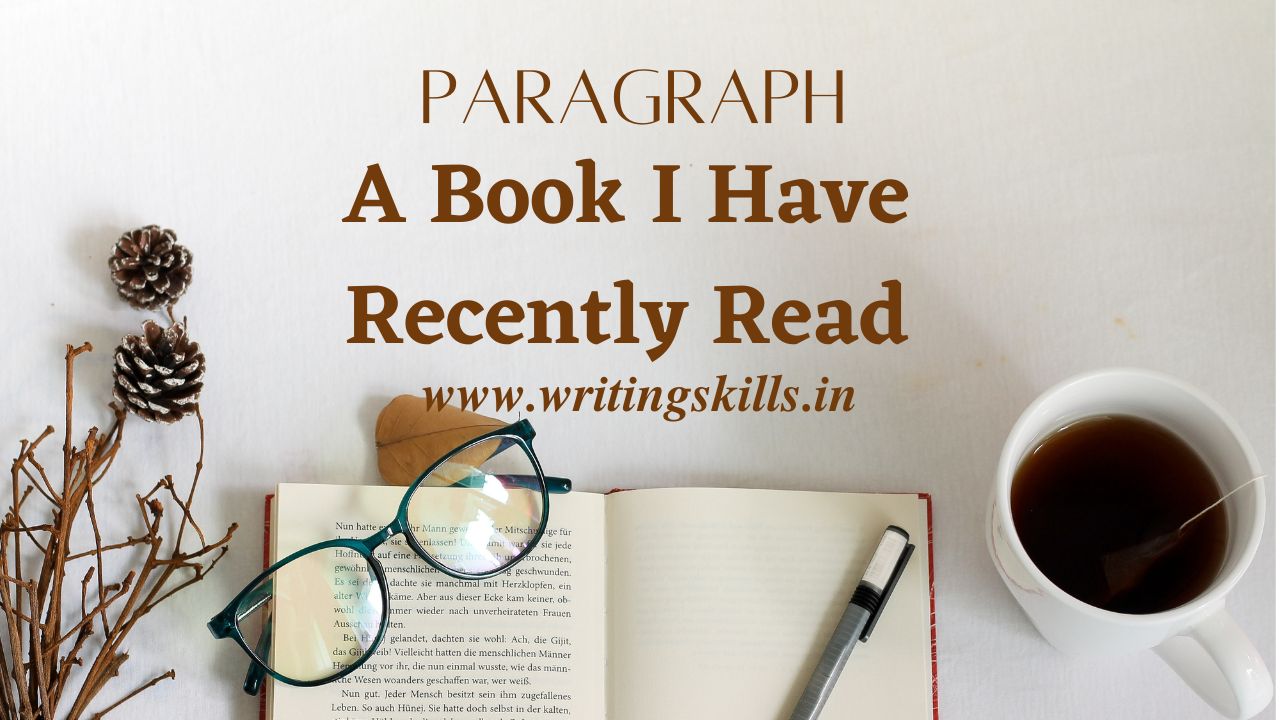

6 Paragraphs on ‘A Book I Have Recently Read’
A Book I Have Recently Read: Books are the best resources of people. With which no earthly wealth can be compared. By reading books we can keep our mind healthy and happy. A good book opens the eyes of the human mind as well as expands and develops the knowledge and intellect and helps to light the mind. Many people like to read story books or other kinds of books. Reading books is a good habit. ‘A Book I Have Recently Read’ is an important paragraph for the students. In this post I have presented six paragraphs on ‘A Book I Have Recently Read’.
A Book I Have Recently Read
Reading books is my passion. I have recently read a book named “ Pather Panchali “. It was written by famous writer Bibhutibhusan Bandopadhyay. The novel is about a little village boy named Apu. The main characters of the book are Apu, Durga, Harihar and Sarbajaya. Harihar and Sarbajaya, a rustic couple, spent their days in miserable distress. But they dreamt of a rosy future. Apu and Durga are their children. Durga died a premature death. It was a great shock to the family. One cannot shed tears when one reads about the death of Apu’s dearest sister Durga. The novel gives us a very living picture of the beauty of a remote village in Bengal. The story reminds us of the hardship of the thousands of poor and helpless people of our country. Really it is an immortal creation of Bibhutibhushan Bandyopadhyay.
Also read : Paragraph on Black Fungus or Mucormycosis
I have little time to read books other than school books. But l heard the story of “Ramer Sumati” written by Saratchandra Chattapadhyay from my grandpa. The story charmed me very much. Recently I managed to have a copy of the book which I finished in a single sitting. It is entirely the story of a joint family of rural Bengal. Here are a few principal characters – Ramlal, the hero, Shyamlal, his step-brother and Narayani, the wife of Shyamlal. Apart from them there are Shyamla’s son and Digambari, his mother-in-law. Ramlal lost his mother when he was only two and a half years old. Narayani, the sister-in-law brought him up with all motherly love and affection. Digambari could not tolerate the sweet relationship between the two. Ramlal was very wayward and that was at the root of all problems. The ancestral home was partitioned and Ramlal was separated much to the pain of Narayani. The author’s portrayal of the characters of Ramlal and Narayani is simply unique. Details of the book cannot be given in this short span. But everybody should go through the book whenever he gets a chance.
Also read : Paragraph on Corona Virus (Covid-19)
I am a genuine book lover. Reading books is my passion. Whenever I get spare time I read story books, novels etc. I am a big fan of cricket as well. My father recently gifted me the autobiography of Sachin Tendulkar “Sachin Tendulkar – Playing It My Way” on my birthday. The book is really very interesting. Sachin Tendulkar is not only a great player but also has become an icon. So a chance to peek into the life of such an icon is always sought after. The chapters describe all the important events of his life. The reader is bound to respect the legend more after going through the book. The book not only brings out Sachin’s passion for cricket but also reveals how caring a father and gentle son he is. I will cherish the experience of reading the book forever and this will be a guide force in my life. I wish to read it once again in future.
A Book I Have Recently Read
Reading books is my passion. I have recently read William Shakespeare’s “The Tempest”. It is the last play of the great playwright, which was written in 1611 at Stafford. Prospero was a learned man. He did not like to rule Milan as merely a Duke. His power was his wisdom. His brother, Antonio, took advantage of this craving for knowledge and conspired to drive him away from Milan with the help of the king of Naples, Alonoso.
Prospero and his daughter eventually took shelter in an alien island. It was a mystic land of which Prospero was little aware. Caliban was an evil spirit which was living in that island. Gradually, Prospero dominated Caliban and became a supreme power by way of his white magic. Dr. Faustus of Marlowe exercised necromancy, but Prospero used his magic for the welfare of the world. Hence his magic was a boon not a bane. His daughter, Miranda, was a lovable and beautiful young lady. Caliban wanted to seduce Miranda, but in vain. At last Ferdinand, the prince of Naples, came to the mysterious land. Miranda was very much appalled to see a beautiful young man for the first time. Seeing Ferdinand, she cried out, “O brave new world.” Later Miranda and Ferdinand fell in love. Prospero wanted to test Ferdinand’s devotion to his daughter. Ferdinand won the mind of Prospero. Using his white magic, Prospero taught everyone including his brother good lessons. Alonso, Antonio and Sebastian realized their misdeed. Gonzalo, who helped Prospero once to escape from his cruel brother, was rewarded.
Finally, everyone was reconciled. Prospero returned to Milan with his daughter and he freed Ariel, the spirit which helped Prospero in fulfilling his desires while living in the alien island. The happy reunion of the play implies the fact that Prospero is a major figure who by way of using his white magic helps everyone reconcile in spite of shortcomings. Honesty and goodness have been rewarded. I felt much aesthetic pleasure while reading the play. Shakespeare’s language, his style, above all, his blending of tragedy and comedy gave to my mind a soothing effect which I cannot forget ever.
Books are our best friends. Even in today’s world of internet and mobile, the importance of books cannot be ignored. I am a genuine book lover. Reading books is my passion. Whenever I get spare time I read story books, novels etc. Recently I have read Bibhutibhushan’s classic novel ‘Chander Pahar’. I loved the book so much that I have lost count of the number of times I flipped through the book even after I had finished reading it.
The book ‘Chander Pahar’ records the adventures of Shankar, the main character of the novel. Shankar, a young bengali boy, faces many adventures in Africa where he goes in connection with his job on the railways. He encounters many ferocious animals like lions, black mamba etc. But the real adventure begins when Shankar accompanies Diago Alverage, a European adventurer, to the Kilimanjaro mountain in search of diamonds. In the course of the events Diago gets killed by a terrible animal called ‘Buniyp’ and Shankar is left all alone in that unknown land of adversity and danger. But he braves it with extraordinary courage and valour.
After a great struggle, he is saved from the desert. Shankar is the embodiment of courage. I love the character very much. I am attracted by Bibhutibhusan Bandyopadhyay’s great narrative skill. He makes the description of African jungles and Shankar’s adventures alive with his narrative skill. Author’s creativity makes Shankar’s character one of the most popular characters of Bengali literature. Whenever I read the novel, I find myself engrossed in it. My mind also travels with Shankar in the land of Africa and feels the adventure. This is why ‘Chander Pahar’ holds such a special place in my mind.
Books are our best friends. Even in today’s world of internet and mobile, the importance of books cannot be ignored. I am a genuine book lover. Reading books is my passion. Whenever I get spare time I read story books, novels etc. Of all the books I have read, I like ‘The Story of My Life’ by Helen Keller the most. The episode centres round the hard struggle of life of Helen Keller. She writes with a natural ease and power, hardly equaled by any other writer of that category. In this book we see that Helen Keller became blind and deaf after a serious illness in her childhood. However, the day when Miss Sullivan came to her as her teacher was the most memorable day in her life. After a long hard process Helen learnt to read, in raised letters in Braille method . She learnt to write also in a special type of typewriter. In the book ‘The Story of My Life’ an account of the first twenty two years of Helen Keller’s life has been given. During this time she came into contact with many noble and affectionate persons. In her autobiography Helen describes her experiences with so much ease and sincerity in such a lucid style that it cannot but arouse love and wonder for her. But the most striking feature of this book is her strong will and iron determination to cross all the hurdles of a handicapped person in her own life. And therefore, it has the universal appeal to all the readers throughout the world. Everybody should go through the book whenever he gets a chance.
Paragraph on ‘My Hobby”
Paragraph On ‘My Aim In Life’
Share this:
- Click to share on WhatsApp (Opens in new window)
- Click to share on Facebook (Opens in new window)
- Click to share on Twitter (Opens in new window)
- Click to email a link to a friend (Opens in new window)
- Click to print (Opens in new window)
8 thoughts on “6 Paragraphs on ‘A Book I Have Recently Read’”
I am very thankful to this passages… 💛💛💛
The essay is the most important part of a college application, so you need to focus and make a good essay to convince the university accept you. You even get help from essay writing expert to ensure you acceptance. Check out, please DigitalEssay.net
thank you very much
helpful page…..
Very useful site. Check also <a href=" https://www.suggestionpedia.com>suggestion and hs suggestion</a> for West Bengal student.
Leave a comment Cancel reply
Save my name, email, and website in this browser for the next time I comment.

Essay on The Most Interesting book I read

Our school library is having books which I like very much. One of my friends showed me a certain book in the library and he said that is his favorite book. He also said that is was the second part of the most famous Adventures of Huckleberry Finn written by Mark Twain.
I borrowed the book from the librarian on the advice of my friend. When I went home that day, I had an immediate lunch, when to my room and started reading the book.
Home interesting was it! It was a wonderful book. The book was full of adventures. The main character was Huckleberry Finn who was a poor English boy whose father was a third class drunkard. This father wanted to get his son’s fortune which he get previously in yet another adventure with Tom Sawyer, his friend. So Finn runs away from the custody of his father and meet another boy. This boy was Jim who had been running away from master. He had been a slave boy.
The two friends go to the sea and get on to a ship. They become friendly with the seamen and go on fishing. They also go to various island in the sea and engage themselves in many adventures. At last they come home. Finn finds that his father had died and hi was no more in danger. Jim also get his freedom with Finn’s help.
This interesting children’s novel had been written by well-known English Author Mark Twain who had previously written the famous book Tom Sawyer. Both these books are popular even today. So many millions of children throughout the English speaking world must have read these books. Much more than Tom Sawyer, it was the Adventures of Huckleberry Finn which was the most interesting book I have ever read.
More Educational Resources
Explore similar educational resources that improve a variety of skills and cultivate a love for learning.

A Scene at a railway Station

Why Do We Need Trees?

Alfred Bernhard Nobel – Swedish Inventor of Dynamite and Founder of the Nobel Prize

A Rainy Day
Essay on My Favourite Book for Students and Children

500+ Words Essay on My Favourite Book
Essay on My Favourite Book: Books are friends who never leave your side. I find this saying to be very true as books have always been there for me. I enjoy reading books . They have the power to help us travel through worlds without moving from our places. In addition, books also enhance our imagination. Growing up, my parents and teachers always encouraged me to read. They taught me the importance of reading. Subsequently, I have read several books. However, one boom that will always be my favourite is Harry Potter. It is one of the most intriguing reads of my life. I have read all the books of this series, yet I read them again as I never get bored of it.

Harry Potter Series
Harry Potter was a series of books authored by one of the most eminent writers of our generation, J.K. Rowling. These books showcase the wizarding world and its workings. J.K. Rowling has been so successful at weaving a picture of this world, that it feels real. Although the series contains seven books, I have a particular favourite. My favourite book from the series is The Goblet of fire.
When I started reading the book, it caught my attention instantly. Even though I had read all the previous parts, none of the books caught my attention as this one did. It gave a larger perspective into the wizarding world. One of the things which excite me the most about this book is the introduction of the other wizard schools. The concept of the Tri-wizard tournament is one of the most brilliant pieces I have come across in the Harry Potter series.
In addition, this book also contains some of my favourite characters. The moment I read about Victor Krum’s entry, I was star struck. The aura and personality of that character described by Rowling are simply brilliant. Further, it made me become a greater fan of the series.
Get the huge list of more than 500 Essay Topics and Ideas
What Harry Potter Series Taught Me?
Even though the books are about the world of wizards and magic, the Harry Potter series contains a lot of lessons for young people to learn. Firstly, it teaches us the importance of friendship. I have read many books but never come across a friendship like that of Harry, Hermoine, and Ron. These three musketeers stuck together throughout the books and never gave up. It taught me the value of a good friend.
Further, the series of Harry Potter taught me that no one is perfect. Everyone has good and evil inside them. We are the ones who choose what we wish to be. This helped me in making better choices and becoming a better human being. We see how the most flawed characters like Snape had goodness inside them. Similarly, how the nicest ones like Dumbledore had some bad traits. This changed my perspective towards people and made me more considerate.

Finally, these books gave me hope. They taught me the meaning of hope and how there is light at the end of the tunnel. It gave me the strength to cling on to hope in the most desperate times just like Harry did all his life. These are some of the most essential things I learned from Harry Potter.
In conclusion, while there were many movies made in the books. Nothing beats the essence and originality of the books. The details and inclusiveness of books cannot be replaced by any form of media. Therefore, the Goblet of Fire remains to be my favourite book.
{ “@context”: “https://schema.org”, “@type”: “FAQPage”, “mainEntity”: [{ “@type”: “Question”, “name”: “Why are books important?”, “acceptedAnswer”: { “@type”: “Answer”, “text”: “Books help with our imagination. They help us travel to far off place without moving. Most importantly, they are always there for us when we need them.” } }, { “@type”: “Question”, “name”: “What is Harry Potter about?”, “acceptedAnswer”: { “@type”: “Answer”, “text”:”Harry Potter follows the adventures of the wizard Harry Potter and his friends Ron and Hermoine. It gives us an insight into the wizarding world.”} }] }
Customize your course in 30 seconds
Which class are you in.

- Travelling Essay
- Picnic Essay
- Our Country Essay
- My Parents Essay
- Essay on Favourite Personality
- Essay on Memorable Day of My Life
- Essay on Knowledge is Power
- Essay on Gurpurab
- Essay on My Favourite Season
- Essay on Types of Sports
Leave a Reply Cancel reply
Your email address will not be published. Required fields are marked *
Download the App

The Best Book I've Ever Read
And yes, you should definitely take my word for it.

In my many years as a journalist, scholar and thinker, I have read nearly all the great works of literature, including Milton, Shakespeare and the first third of The Brothers Karamazov. But no book has ever spoken to me as profoundly or directly as Joel Stein's Man Made: A Stupid Quest for Masculinity.
Haven't we all, on some level, been a Jewish boy in 1970s New Jersey with only female friends, an Easy-Bake oven and a strong predilection for show tunes? Haven't we all had a panic attack when learning we're going to have a son, since that means we're going to have to figure out how to throw footballs, watch other people throw footballs and decide whether to be happy or sad about the results of said football throwing? Haven't we all then tried to rectify our lack of masculinity by becoming a Boy Scout, fighting fires with firefighters, driving a Lamborghini Superleggera, doing three days of Army boot camp, firing a tank and going one round with UFC champion Randy Couture? I know I have.
Although Man Made won't be published until May 15, I have already reread it more than 30 times, and to the shock of my lovely wife Cassandra, who overheard me, I still laughed at all the jokes on the 30th read. The quality of the writing is so consistently great that to find my favorite section, all I need to do is turn to a random page and read it. Like this one: Isn't the entire point of being seen in a Lamborghini to get two women for a threesome? But--and here is the car's one major design flaw--there are only two seats. So I'd have to meet two women at a club, take one home, drive back to the club, and take the second one home. By then, the effect of the Lamborghini would have worn off on the first one, so I'd have to take her for a quick drive somewhere, thus de-Lamborghini-sexing the second one. The math just doesn't work out.
The only parts I didn't fully enjoy were those in which the author suffered horribly. Like when after just three hours of boot camp--which admittedly was in Kentucky in the summer and he'd slept only three hours and wasn't told not to lock his knees--he fainted daintily into the arms of a soldier. Or when UFC president Dana White insisted that Stein get choked out so he'd know what it feels like, and Stein faked nodding off, which caused White to get his psycho jujitsu-training friend to choke him out yet again, causing Stein to not be able to swallow his own spit that night. I really felt for him there.
It is clear from the book that Stein deeply loves his son, his wife, his combative father, his self-reliant father-in-law, his editor, his agent and every one of the people he meets in the course of his quest. Even that jujitsu guy who choked him out. I'm sure all those people will enjoy all the jokes that celebrate and do not mock them and will thank Stein for writing about them. Possibly with gifts of 2009 grand cru Bordeaux.
I admit I feared this book would be just a longer version of Stein's column in Time, which wouldn't be a bad thing given the awesomeness of that artistic endeavor. But it is much more. It's got occasional cursing. And bigger type. I also admit I was wary of reading yet another book that traffics in the differences between men and women. But Men Are from Mars, Women Are from Venus is to Man Made what Fifty Shades of Grey is to having sex with Venus. Just to make that completely clear: Time magazine says reading Man Made is better than having sex with the Roman goddess Venus. Also, to be clear, TIME magazine is fine with that sentence appearing in any promotional materials for the book.
Are there books with deeper insights, better reporting, more important ideas and a better theme song? No, there are not. In Man Made, Stein does that amazing thing great writers do when they take all these ideas that were already in your head, put them on paper and then charge you $27 for that paper. Or put them on e-readers and charge you $13 to download. Either way, it counts equally toward the author's sales figures.
The film rights to Man Made have already been sold to Fox, and I hope it gets turned into a movie with George Clooney playing the Stein role, since they remind me so much of each other.
Though this is only Stein's first book, I would already put him on par with David Sedaris, Dave Barry, James Thurber, Mark Twain and Abraham Lincoln. I have recommended Man Made not just to all my friends and family but also to strangers on Twitter, over and over and over again. My one fear is that after this great achievement, Stein will succumb to the soul-depleting self-promotion of book marketing and lose his ability to be a ruthless critic of our shallow times. Which is why, in case this is his only great book, I suggest buying one for yourself and one for your dad for Father's Day.

Short Essay: My Favourite Book
A couple of short essay examples on my favourite book.
Table of Contents
My Favourite Book Essay Example 1
Books have a unique way of transporting the reader to a different world, and for me, “To Kill a Mockingbird” by Harper Lee is one such book. This novel has been my favourite book for many years now. It explores various themes, including racial injustice, morality, and the loss of innocence. The characters in the novel are complex and well-developed, making it a must-read for anyone who loves literature. In this essay, I will discuss why “To Kill a Mockingbird” is my favourite book, and how it has impacted my life.
One of the most significant themes explored in “To Kill a Mockingbird” is racial injustice. The novel is set in the deep south of the United States during the 1930s, a time when racial segregation was rampant. The story follows the trial of Tom Robinson, a black man accused of raping a white woman. The way the trial is conducted and the verdict that is reached highlights the injustice that was prevalent during that time. Through the character of Atticus Finch, the novel shows the importance of standing up for what is right, even if it means going against societal norms. The theme of racial injustice is still relevant in today’s world, and “To Kill a Mockingbird” serves as a reminder of the need to fight against discrimination and prejudice.
Another theme explored in “To Kill a Mockingbird” is morality. The novel teaches valuable lessons about right and wrong, and the importance of empathy and understanding. Through the character of Atticus Finch, the novel shows the importance of treating everyone with respect and dignity, regardless of their race or social status. The novel also highlights the need for courage and integrity, even in the face of adversity. The moral lessons taught in the novel are essential for everyone, and they have impacted my life greatly.
One of the things that make “To Kill a Mockingbird” such an intriguing read is the complex characters that are well-developed. The character of Scout Finch, the narrator of the story, grows and matures throughout the novel, and her perspectives on life change as she gains more understanding of the world around her. Atticus Finch, Scout’s father, is a complex character who is respected in the community for his honesty and integrity. The novel also explores the character of Boo Radley, who is misunderstood by the community but is ultimately shown to be kind-hearted. The characters in the novel are relatable, and their stories stay with the reader long after the novel has ended.
“To Kill a Mockingbird” by Harper Lee is a timeless classic that has impacted many readers around the world. The novel explores themes of racial injustice, morality, and the loss of innocence, and the characters are complex and well-developed. The story teaches valuable lessons about right and wrong, and the importance of empathy and understanding. For me, “To Kill a Mockingbird” is more than just a book; it is a reminder of the need to stand up for what is right, and to treat everyone with respect and dignity.
My Favourite Book Essay Example 2
Reading has always been one of my favorite pastimes, and throughout the years, I have read countless books that have captured my heart and imagination. However, out of all the books I have read, one stands out as my absolute favorite – and that is “To Kill a Mockingbird” by Harper Lee. This book is a timeless classic that has touched the hearts of many, including myself. In this essay, I will be discussing the plot, the characters, and the themes explored in “To Kill a Mockingbird.”
The plot of “To Kill a Mockingbird” is centered around the life of a young girl named Scout Finch and her family, who live in the small town of Maycomb, Alabama, during the 1930s. The main conflict of the story arises when Scout’s father, Atticus Finch, a lawyer, is appointed to defend Tom Robinson, a black man who is falsely accused of raping a white woman. Throughout the book, we see how Atticus, Scout, and her brother Jem navigate the racial tensions in their town, and how they fight against the prejudices of their neighbors. The resolution of the story is both heart-warming and heart-wrenching, as we see the consequences of the trial and the impact it has on the Finch family.
The characters in “To Kill a Mockingbird” are some of the most memorable and well-developed characters in all of literature. Scout, the protagonist, is a young girl who is both curious and innocent, and her growth throughout the story is both inspiring and relatable. Jem, her older brother, is a caring and protective sibling who is forced to confront the harsh realities of the world around him. And of course, Atticus Finch, the wise and compassionate lawyer who serves as a moral compass for the entire town. Each character in the book is unique and multi-dimensional, and their interactions with each other create a rich and complex narrative.
The themes explored in “To Kill a Mockingbird” are numerous and thought-provoking. One of the main themes is the exploration of racial inequality and prejudice in the American South during the 1930s. Through the lens of Scout and her family, we see the devastating effects of racism on both the black and white communities in Maycomb. Another important theme is the idea of personal growth and empathy. Throughout the story, we see how Scout and Jem learn to understand and appreciate the perspectives of others, and how their experiences shape their understanding of the world.
In conclusion, “To Kill a Mockingbird” is a book that has stood the test of time and continues to be relevant today. Its powerful themes and memorable characters have captured the hearts and minds of readers for generations, and it remains one of the most influential books in American literature. For me, it is not just a favorite book, but a book that has shaped my understanding of the world and inspired me to be a better person.
My Favourite Book Essay Example 3
Books have always been an integral part of my life. They are a source of knowledge, entertainment, and inspiration. Among the numerous books that I have read, one stands out as my favorite, and that is “To Kill a Mockingbird” by Harper Lee. Published in 1960, this novel has become a classic of modern American literature. It explores themes of racism, justice, and morality through the eyes of a young girl named Scout. In this essay, I will explain why this book is my favorite and why I recommend it to others.
“To Kill a Mockingbird” is my favorite book because of its powerful message against racism. The novel is set in the deep south of America in the 1930s, a time when racial discrimination was rampant. The story follows the life of Scout, a young girl growing up in a small town. Her father, Atticus Finch, is a lawyer who defends a black man accused of raping a white woman. The trial is a symbol of the deep-rooted racism in society and highlights the injustice that African Americans faced at the time. Through Scout’s innocent eyes, we see the reality of racism and its damaging effects on individuals and society as a whole.
Another reason why “To Kill a Mockingbird” is my favorite book is the well-developed characters. Each character is unique and has their own story to tell. Scout, the protagonist, is a feisty young girl who questions the world around her. Her brother Jem is a caring and protective sibling, while Atticus is a wise and compassionate father. The novel also features Boo Radley, a recluse who is misunderstood by the townspeople, and Tom Robinson, the black man who is wrongly accused of a crime he did not commit. The characters are so well-written that they come to life on the pages of the book, making the story both engaging and memorable.
Lastly, “To Kill a Mockingbird” is my favorite book because of its thought-provoking themes of morality and justice. The novel raises important questions about what is right and wrong, and how we should treat others. Atticus Finch’s character embodies the ideals of justice and fairness, and his words of wisdom have inspired many readers. The book also challenges the reader’s beliefs and values, making us reflect on our own attitudes towards race, prejudice, and discrimination.
In conclusion, “To Kill a Mockingbird” is a timeless classic that has touched the hearts of many readers. Its themes of racism, justice, and morality are still relevant today, and the characters are unforgettable. This book is a must-read for anyone who wants to understand the complexities of the human experience and the importance of empathy and compassion. I highly recommend it to anyone who loves literature and wants to be inspired by a great story.
About Mr. Greg
Mr. Greg is an English teacher from Edinburgh, Scotland, currently based in Hong Kong. He has over 5 years teaching experience and recently completed his PGCE at the University of Essex Online. In 2013, he graduated from Edinburgh Napier University with a BEng(Hons) in Computing, with a focus on social media.
Mr. Greg’s English Cloud was created in 2020 during the pandemic, aiming to provide students and parents with resources to help facilitate their learning at home.
Whatsapp: +85259609792
[email protected]


Talk About a Book You Read Recently IELTS Cue Card
Talk about a book you read recently ielts cue card topic.
Talk about a book that you have read recently. Please say
What was its title? Who is the author? What did you learn from it?
And explain why you liked or disliked it.
You should say:
- what the book is
- who wrote the book
- what the book is about
and explain how much you enjoyed reading this book.
Note: You will have to talk about the topic for one to two minutes. You have one minute to think about what you are going to say. You can make some notes to help you if you wish.
Practice with Expert IELTS Tutors Online
Apply Code "IELTSXPRESS20" To Get 20% off on IELTS Mock Test
Sample Answer 1:
Describe a book you have read recently – The Fortunate Pilgrim
The book I have recently finished and enjoyed so much is called “The Fortunate Pilgrim”, and I would like to talk about it for this topic.
It is a novel by Mario Puzo which was first published in the year 1965. The writer Mario Puzo is well-known for his famous mafia book “The Godfather”. He, nevertheless, received numerous positive reviews for his book “The Fortunate Pilgrim”. The writer had developed the story of this novel based on his mother’s immigration struggling for respectability in the United States. Mario Puzo himself considered this novel to be his finest though Godfather earned him much more fame and earning.
The novel tells the story of an immigrant family living in New York City. The mother of the family, Lucia Santa is the protagonist of it. It is her formidable will that steers the family members through the Great Depression and early years of World War II. The story, events, and the characters become so real that the readers can’t stop wondering about them even when they are not reading. The writer had been able to tell an ordinary story extraordinarily. It makes us feel and relate the characters, their happiness, sorrows and sufferings in our lives, and that’s why the characters and stories got the power to keep readers awake the whole night. Mario Puzo has shown literacy excellence in this story and it will keep on surprising readers in the coming decades.
I liked the book very much and finished it within 3 days. I have always been a great admirer of Puzo’s writing style, and “The Fortunate Pilgrim” was a bit different from his famous mafia books. It touches the reader’s mind, keeps them wondering and tells them an amazing story. So, I had every valid reason to enjoy this book to a great extent.
Sample Answer 2:
Describe a book you have read recently – The Wings of Fire
It is a well-known fact that books are best friends. Some people get motivated while reading books, and others read to drain the stress and anxiety. I am an avid reader, and out of all the books I’ve read, the one which I loved was ‘The Wings of Fire’ by Dr. A.P.J. Abdul Kalam.
My sister gifted me the book on my birthday as she knew that I was fond of reading autobiographies. And this book by Dr. Kalam had a great influence on me and still inspires me, and I began devouring it on the same day. The book explains how Kalam started his career and became the best rocket Engineer.
The book is about his journey, accomplishments, and about he managed to overcome his obstacles. He describes his presidential post as a piece of luck, and his achievement as a rocket Engineer was because of sheer hard work. Throughout the book, one thing that stands out is Kalam’s positive thinking and his secret to success hidden in his ability to ignore negative things. That is why he had contributed and accomplished a lot in his life.
Kalam’s journey in the book inspires us to achieve our dreams by beating all the odds. A fable in the book emphasizes the importance of family, relatives, and friends in helping accomplish each other’s goals and turning dreams into realities.
Also Check: Describe a situation when you were bored – IELTS Cue Card
Sample Answer 3:
A Book You Have Recently Read IELTS Cue Card – Rich Dad Poor Dad
I am not fond of reading many books apart from my textbooks. but during this pandemic time, I was free at home so I decided to read a book which my friend gifted me, and I read it all.
I found this book very exciting and motivating and would like to read it again. The book’s name is ‘Rich dad poor dad’. • Rich Dad Poor Dad is about Robert Kiyosaki and his two dads story, and the ways in which both men shaped his thoughts about money and investing • It was first published in 1997 and quickly became a must-read book for people who want to become rich with smart work. The book has been translated into dozens of languages, sold around the world, and has become the number 1 Personal Finance book of all time. Robert Kiyosaki tells the story of his two dads in his childhood. His own father and the father of his best friend. While he loved both, they were very different when it came to dealing with finances. starts with the idea that many of us are too afraid of being branded as a weirdo, 90% of people still stick to the outdated mantra “Go to school, go to college, get a job, play it safe.” when in reality no job is safe anymore. when your greed takes over, you might then spend the extra money on an improved lifestyle, like buying a car, and the payments eat up the money – this way you’re guaranteed to lose 100% But if you educate yourself financially, you can multiply it but take the right decisions I found it very useful for me.
I learned from this book how to use money as a tool for wealth development. if you are born poor it is not your fault but if you die poor it is totally your fault. Hard work is important, but with smart work, you can enhance the productivity of quality of life. If you take a risk you can win but if you do not take risks you definitely lose. This book I found useful, it guided me in my finance management and I recommend any of my friends to read this book
Sample Answer 4:
Describe a Book You Have Recently Read – Harry Potter
Well, the first book I can think of is definitely Harry Potter and the Deathly Hallows, which is the seventh book, also the final novel, of the Harry Potter series. I became a fan of this fantasy story when I was still a child. So by the release of the final, I’d been obsessed with the series for almost ten years. You can imagine how thrilled I was when I could finally read the ending of this story.
Anyway, I read it as soon as it was published. Even though this was about twelve years ago, I remember the release like it was yesterday. I waited for hours in front of a bookstore in a hundred-meter line full of excited Hany Potter fans like me, mostly teens, of course, just to get the book on the day of its release. And once I started reading it, I literally couldn’t put it down.
The final Harry Potter book really blew my mind. I mean, it has a happy ending as I expected. Like Hany has to die once and comes back to life so he can defeat the villain, Voldemort. I finished the book with an overwhelmed feeling that was a mix of excitement, happiness and some loss.
Honestly, I’ve reread this novel ton of times. I’ve even written some glowing reviews of the book on social media, which I’ve never done for other books. It’s a really exciting book that left a mark on me.
Sample Answer 5:
IELTS Cue Card Talk About a Book You Read Recently – The Secret
I like to read books not just from my prescribed course, but also additional ones according to my own interest. I personally gain a lot from reading books, as they improve my intellect and make me learn about new concepts. The book that I’m going to talk about is ‘The Secret’ by Rhonda Bryne.
I read this book almost a year ago for the first time. I knew about it before but I really never got the chance to read it. I finally looked for it online and bought it.
‘The Secret’ by Rhonda Bryne is a self-help motivational book that shows readers positive aspects of life, and also encourages them to strive for success. The book discusses the law of attraction and how to use it in almost every aspect of life.
The book beautifully explains how thoughts influence your actions and in turn, the experiences that you have in your life. It focuses on setting a goal in the mind and then believing in yourself to achieve that goal. The law of attraction is linked to every walk of life like possessions, dreams, goals, success, and even health. The logic is quite simple, that if ambition is clearly visualized in the mind, then the motivation will attract everything you want.
The Secret is a powerful yet simple book that encouraged my visualization and boosted my motivation. It made me realize that we are the creators of our own reality in a very practical manner. It gave me immense positivity, and the confidence to succeed in work and relationships. It basically gave me the key to being happy.
Sample Answer 6:
Book IELTS Cue Card – How to Stop Worrying and Start Living
Last year due to Corona Pandemic, my country was in a state of lockdown. Since I did not have much to do while sitting at home, I went into depression.
I tried many things to come out of it, but all my efforts went in vain. During that time, one of my friends gifted a book to me, written by a renowned self-improvement writer Mr. Dale Carnegie. The name of the book was “How to stop worrying and start living“.
It is a self-improvement book that teaches you the perfect ways to get rid of stress in your life.
This book is about handling depression in our lives. According to the writer of this book, when we have stress regarding something, we find it difficult to focus on work. And due to that, our productivity at work goes for a toss. So just worrying about anything doesn’t do any good to us rather it leads us towards a wrong trajectory.
Moreover, according to him, there is no point in having worries concerning the past or future. We should live our lives in the present. Our past is good for us if we use it as a medium to learn from it. However, if we keep on thinking about our past, we would ultimately become depressed.
As far as the future is concerned, there is no harm in having plans for it. But, one shouldn’t service the present for having a worthwhile life in the future.
I find this book exciting because excitement in our lives thrives primarily on having fewer worries and more enjoyment. This book adds to our joys by bringing a paradigm shift in our thinking process.
It helped me to come out of boredom and depression. Due to its valuable inputs, I have started enjoying my life to the full extent. Whenever I have conflicts in my life, I handle them adroitly.
It is a must-read book for people from all walks of life.
Sample Answer 7:
A Book You Read IELTS Cue Card – Atomic Habits
Being a voracious reader, I love to read books. Although I have read many exciting books in my life, there is one book that has caught my attention.
Last month I had to go for a job interview in the capital city. Since the journey was too long, I decided to utilize my time productively by reading a book.
Before boarding the train, I purchased a book by the name of “Atomic Habits“.
This book is so exciting and addictive. During the journey, most of the time, I remained involved in reading this masterpiece.
This book is a self-improvement book.
The central focus of this book is on the habits of people. It says that we can bring a paradigm shift in our lives by replacing our bad habits with good habits.

Whether we have to improve our skills by working on this. By making a tiny improvement of one percent every day, we can improve our performance by thirty-seven percent at the end of the year.
This book is exciting because, after reading it, you can handle all the conflicts in your life adroitly.
There is no denying this conviction that most people work tremendously hard to gain success in their lives.
This book has explained the process of attaining success in a consummate manner.
It adds excitement to your life by giving you hope.
Such was the impact of this book that, I achieved my most awaited goals, in just six months after reading this book.
In nutshell, this book can add fun and excitement to your life by leading you towards an impressive growth trajectory.
Sample Answer 8:
IELTS Cue Card Topic A Book You Read – Wonder
Today I am going to talk about “Wonder”, the book that left me with lots of thoughts and emotions after I finished it.
I don’t remember exactly when but there was one time my favorite Youtuber said that “Wonder” was the most engaging book she had ever read. Not long after that, I decided to purchase the book online. And she was right, when I finished “Wonder”, I could not stop thinking about how it inspired and refreshed me.
“Wonder” tells an incredibly moving and inspiring story of a little boy named August, who was born with an extreme facial deformity. When August turned 10, he decided to attend school for the first time. During his school days, though August was harassed and mocked for his “alien” look, he was still lucky enough to have some nice friends as companions. Things got worse when August and his schoolmates went camping for three days. On the second night, August encountered a group of older kids who tried to bully him. Luckily, he was rescued by three boys who were usually mean to him at school. After this incident, August and his friends won a special award for their courage and kindness.
“Wonder” is truly a fast-moving and gripping book that I could hardly put it down. All I could feel after reading this story was the sense of love and goodness. I was also infused with inspiration and appreciation for good things and kind people. I think I would always remember this saying: “When given the choice between being right or being kind, choose kind”.
Sample Answer 9:
Describe a Book You Recently Read Cue Card Topic – Wings of Fire
I have not read many books apart from my textbooks. Here, I would like to talk about a book, which my friend gifted me, and I read it all. I found this book very exciting and motivating and would like to read it again.
This book is ‘The Wings of Fire’ by Dr. A.P.J. Abdul Kalam. My friend got this book as a prize when she participated in a declamation contest. It is Dr.Kalam’s autobiography. It was first published in 1999. This book became popular only after Dr. Kalam became the President of India. He was sworn in as the president of India on 25th July 2002. Mr. Arun Tiwari helped Dr. Kalam in writing the book. In this book, Dr. Kalam says why he wrote his autobiography. This book is very motivating.
From this book, I came to know all about the life and achievements of Dr. A.P.J.Abdul Kalam. Dr. Kalam was born in a very poor family in the southern parts of India at Rameshwaram. The reason why I admire him is that his life shows how & ordinary boy from a deprived class (poor family) could reach the highest level of the nation. He became not only the best rocket engineer but also the first citizen of the nation. It is true that he described his post as the President as a piece of luck, but his achievement as a rocket engineer was because of sheer hard work. He is a role model for one and all.
The success of Dr. Kalam depended on the fact that he was willing to grow daily. He learned everything that come to him and was always looking for things to learn. The real success of Dr.Kalam is in his application of the discipline, what he learned, in other fields also. That is why he could contribute to the making of artificial limbs of lesser weight. In him, we find a person with an insatiable quest for knowledge & great love for suffering fellow beings.
Unfortunately, we don’t have Dr. Kalam with us today, but he will live in the hearts of all Indians. I would like to read this book again, because it is a very motivating book.
Sample Answer 10:
Describe a Book that You Enjoyed Reading Cue Card Topic – Filipino Cuisine
I’d like to talk about a cookbook that was given to me by my best friend several years ago. The title of the book is ”Filipino Cuisine” and what’s inside is a compilation of the Philippines’s mouth-watering dishes such as the Adobo and Kare-Kare. Adobo’s main ingredient is pork or chicken stewed in vinegar, garlic, soy sauce, bay leaves, and peppercorns while Kare-Kare is an oxtail stew and is always best to eat with steamed rice and shrimp paste. They’re actually a perfect pair.
Cookbooks or recipe books belong to non-fiction category since it consists of factual information and a step-by-step guide in cooking. It also includes the name of the author and a short introduction about its content.
Actually, I’m not so fond of non-fiction type of books, however, once in my life, I got interested in cooking and I have always told my best friend about it. We both know that I’m a terrible cook at that time and so that must be the reason why she bought me that book.
When I started reading it, I realized that cooking is not really that complicated as it seemed to me before. Through it, I’ve learned to prepare different Filipino dishes from the main course to desserts. Each time I was able to cook a recipe perfectly, I always felt a sense of achievement. This recipe book is very useful for me because firstly, it taught me the do’s and dont’s in the kitchen. Another one is, it helped me develop another essential life skill which is cooking and now finally, I can prepare scrumptious and healthy meals for my family. I probably would like to read it over and over again because I haven’t memorized yet some of the recipes and reading it again will refresh my memory once more.
Sample Answer 11:
Book IELTS Cue Card – The life of loneliness
Thanks for giving me such an interesting topic. Well, books are a prominent source of information, feelings, and inspiration. There are lots of books available nowadays related to emotions, history, poetry, inspiration. I read many books. But now, I have to ask to talk about a that I recently read. I am feeling glad to share that recently I read the book named “The life of loneliness ” written by Dr. Narinder Singh Kapoor.
I heard about this from my friend. He said this book is full of inspiration. Then, I wanted to buy that. But I didn’t find this book in the market. So, my friend gave it to me for some time. When I read this book, I really felt awesome because this book was full of thoughts that described a persons’ thinking, views over different things. After reading this book, I felt that this book did not even contain any poetry, story but contained single-single line thoughts with a number of stories. As the name of the book describes, The life of loneliness means a single sentence containing a particular story about a person.
This book was 330 pages and approximately contained 1071 sentences or we can say 1071 stories about human beings. All the thoughts described a child, younger, older, women, and men’s thinking and views. I must say, this book helps you to understand a person’s thoughts that you meet daily.
I am happy after reading that book and always grateful to my friend who had suggested me to read this book. And I also want to read this book again and again.
IELTS Speaking Part 3 :
Describe a Book You Recently Read – Follow up Questions
Here are some examples of follow-up questions that you may get during your speaking part 3 by the examiner related to cue card “Describe a Book You Recently Read”.
1. Do people in your country like to read books? Yes, people in my country like to read books. There are bookshops in most towns and cities, which are all doing good business.
2. What kinds of books are most popular in your country? All types of books are very popular. India is a diverse country. People have diverse tastes in everything, including reading.
3. Do you think reading is important? Yes, reading is very important. It develops imagination and also develops language skills.
4. Do you think electronic books will eventually replace paper books? Not completely, but to a large extent yes. E-books have a lot of advantages
Benefits of e-books over traditional books Easy to carry while traveling – eBooks allow you to bring a whole library with you wherever you go. You can switch between titles with ease and the weight is lighter than a standard ieltsxpress paperback.
Need less storage space – Those who own a lot of books know how much space they can take up, but with a reader, your bookshelf is located on a small handheld device, your computer, or on both.
Less costly – eBooks are often cheaper in the long run because there are no printing fees associated with them. In fact, you can often find free eBooks online, whereas physical books almost always cost you something. However, you have to spend one time on a reader, such as a kindle or any other tablet.
Immediate purchase – When you buy an eBook, your reward is instantaneous.Whereas if you order a book online you have to wait for it to arrive before the fun begins. You can do font adjustments. With an eBook, you can instantly change the darkness of the lettering or the size of your font. You can do night reading. If you read in bed, an eBook may be a good option as many readers come with built-in reading lights.ieltsxpress
5. Some people like to collect books. Why do you think they do this? They do so because they love books. They treat books as collectibles and are proud of their collection.
6. Is compulsory reading (in school) is a good idea? Yes, definitely. In order for students to achieve in math, science, English, history, geography, and other subjects, reading skills must be developed to the point that most of them are automatic. Students cannot struggle with word recognition when they should be reading quickly for comprehension of a text. But the ability to read and write develops with careful planning and instruction. Children need regular and active interactions with print.
7. What books do children read and what do adults read? Children read fantasy, fiction, and books on supernatural characters like Barbie, Superman, and Shaktiman. Adults read biographies, fiction, and religious and spiritual books.ieltsxpress
8. Why do men and women prefer different books? This is because they have different tastes.
9. Why did some books become internationally popular? This is perhaps because these receive a lot of publicity.
10. What type of books do children read nowadays? What type of books did children like reading in the past and what do you think they will read in the future? Nowadays, generally speaking, the reading habit of children is on the decline. Whatever books they read are based on fantasy, fiction and supernatural characters like Barbie, superman, and Shaktiman.
50 years ago – Children read a lot. They read moral and spiritual books. They read animal stories.
After 50 years – I do not think they will do any reading. All the time will be spent in front of computers.
11. Do you think children have lost their interest in stories? No, I don’t think that children have lost their interest in stories. However, the stories they read today are very different from those in the past.
12. Can storybooks be an ideal gift for children? Yes, definitely! Storybooks can be an ideal gift for children. They can help the child imagine the characters in the mind, which is the first step to creativity. Another important benefit is that we can impart the knowledge of culture, tradition, moral values, and religion in the mind of the child. This forms the basis of the child’s personality. Finally, storybooks enhance the curiosity of the child and enhance their mental growth.ieltsxpress
13. What can be done to encourage the habit of reading among children? A lot can be done to encourage the habit of reading among children. The first and foremost step would be to make books available. There should be good libraries in the schools as well as in neighborhoods. Storytelling competitions could be organized. If children have to take part in these competitions, then naturally, they would be encouraged to read books. Finally, books could be made more interesting by adding graphics.
14. How does reading help a child? Reading helps to improve concentration. It also helps to improve general knowledge. It also improves language skills and satisfies the curiosity of children on various things.
15. What sort of books can be suggested to children to read? Children should be encouraged to read religious and historical books. They should also read biographies and autobiographies of famous people so that they get motivation from them. They should also be encouraged to read books on science and technology. However, these books should be made very interesting by adding pictures.
16. How much should a child read every day? A child should read half to one hour daily.I think that would be enough considering that they have to go to school and do their homework as well.
17. What is the difference between the books sold in the past and the books sold nowadays? In the past, books related to culture, tradition, religion, and history were sold. Nowadays, books are mostly based on fiction and fantasy. E-books have become very popular nowadays as compared to printed books.
Why do You think Reading is Important? Reading is important because it helps in developing creativity and imagination. It will enable the reader to develop a better vocabulary and get a hold of the language. It will eventually lead to better speaking and listening skills as well since it will instill (meaning- firmly establish) confidence in the reader. Reading is a great way to learn and explore, and it surely improves the intellect of a person.
Can Storybooks be Ideal Gifts for Children? Storybooks can definitely be very good gifts for children. They enable children to visualize characters in their minds, which is really helpful in developing creativity. Also, storybooks can impart the knowledge of moral values, culture, tradition, and religion in the mind of children. Also, children who read storybooks are curious and their mental growth is enhanced when they ask questions and get answers.
Which do you prefer paper books or e-books?
I prefer the latter as it is way more convenient than the former. Electronic books like Kindle from Amazon are really handy. I can take it anywhere and anytime. Also, I can purchase and download more digital books online if I want to without going to a bookstore. Yes, I cannot deny the fact that there are some downsides of using electronic books but since my priority is convenience, I cannot trade e-books for paper books.
Do you think people these days still read books? Yes definitely! Even though we are now in the internet era, there are still many people who enjoy reading books since it provides plenty of benefits to them, such as, being able to exercise their mind through learning a new set of vocabulary or enhancing their comprehension skills. Also, through reading, people become well-informed and more creative since it does stir their imagination. In addition, according to science people whose first love is reading are less likely to get dementia because their brain becomes more alert.
With these great benefits, I am confident to say that reading is still a popular hobby among people amid this frontier technology generation. Reading is one of those activities that people can never be taken for granted. How can we encourage children to read books? Well, frankly speaking, it is more than a challenge these days to motivate children to read because of the existing entertainment distractions, such as playing computer games, socializing on social media platforms, and the like. However, I suppose we can make them love reading or influence them to read through modeling. If we adults show them that we enjoy reading, then it is highly likely that they will imitate us.
In reality, the love of reading starts at a very early age. When parents spend time reading bedtime stories to their children before going to sleep, their children will surely get used to reading and it will become a habit to them. However, if parents never practice that with their children, then it is just hard to make them love reading and as a result, they will surely have difficulty encouraging their children to read.
Do children need to learn how to read while they are still young? In my opinion, children have to learn how to read as early as three to six years of age. (Explain) In the first six years, a child’s brain is like a sponge that can easily absorb information and make them easier to teach. (Example) For example, I have been teaching reading classes to graders and after talking to the parents, I figured out that the students who can effortlessly remember what I teach are those who started reading at a very young age.
Do you think there is a difference between reading habits in the past and in the present day? Yes. There is a huge difference in the way people read before and now. (Explain) In the past, people tend to read paper books to gather information or to kill time. However, these days, people prefer reading articles, books, and other written material using electronic devices such as smartphones, computers, and tablets. They say that it’s more convenient to read using these gadgets since it is handy and pocket-friendly. (Example) For instance, if I want to read before sleeping, I don’t have to switch on the light in the bedroom to be able to read. All I have to do is adjust the brightness of my smartphone screen to read well.
What is the impact of e-books on reading habits? In my opinion, the most significant impact of digital books in our reading habit is that it makes our every reading experience hassle-free. (Explain) As we all know, e-books can be accessed conveniently. We can actually read whenever and wherever we please. Therefore, more and more people have the opportunity to gather information and learn. (Example) For example, in the past, people need to buy books or borrow from the library in order to do their homework or to study but now, they can study without bothering to go to other places because all they need is their smartphone or tablet.
Oh hi there! It’s nice to meet you.
Sign up to receive awesome content in your inbox, every week.
We promise not to spam you or share your Data. 🙂
Check your inbox or spam folder to confirm your subscription.
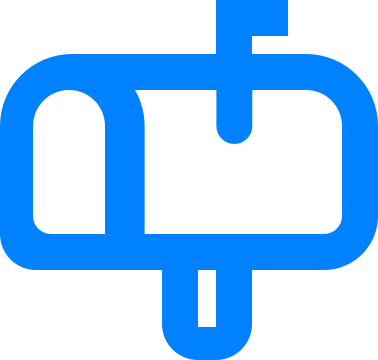
Oh Hi there! It’s nice to meet you.
We promise not to Spam or Share your Data. 🙂
Related Posts
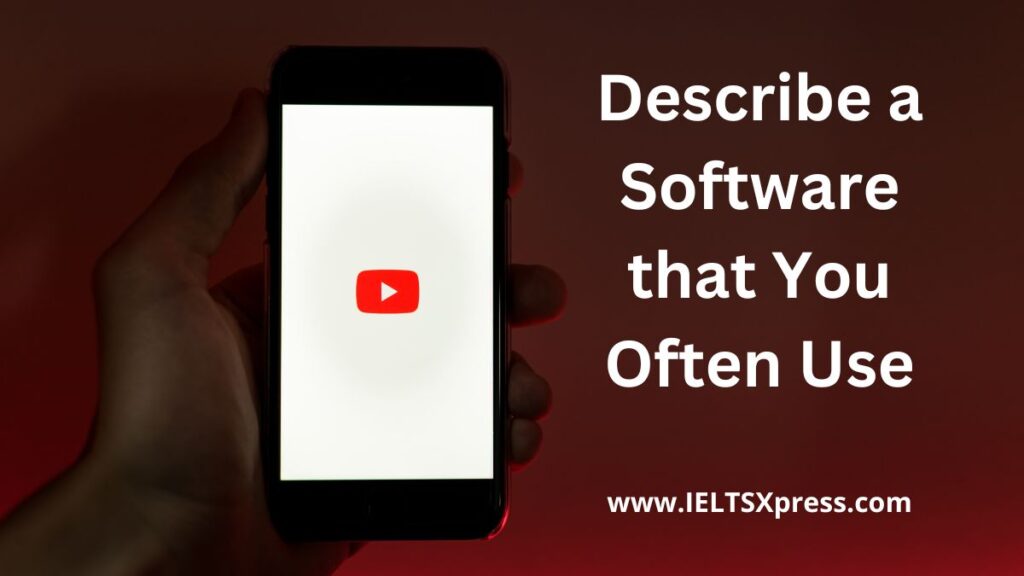
Describe a Software that You Often Use IELTS Speaking Cue Card
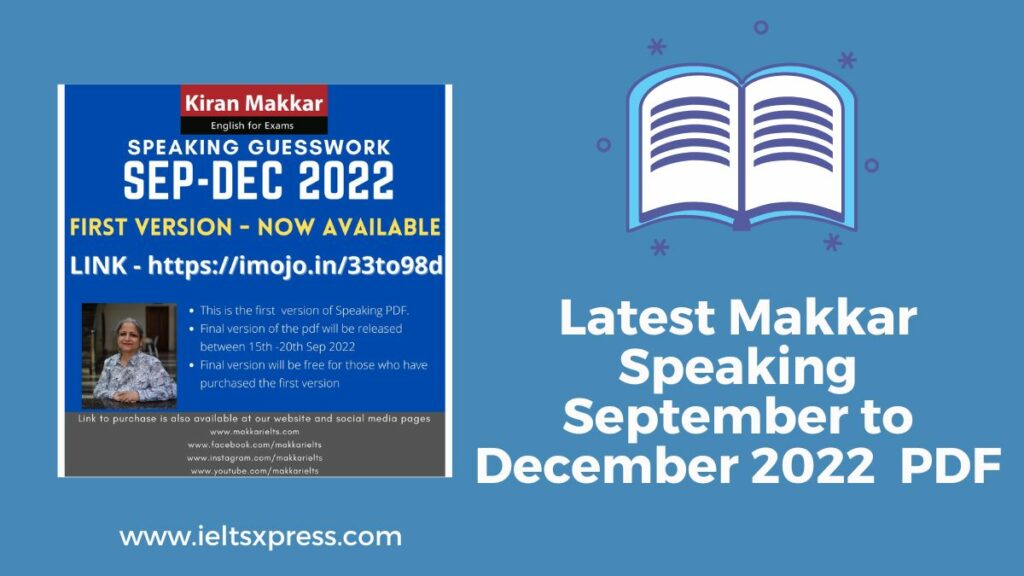
Makkar IELTS Speaking September to December 2022
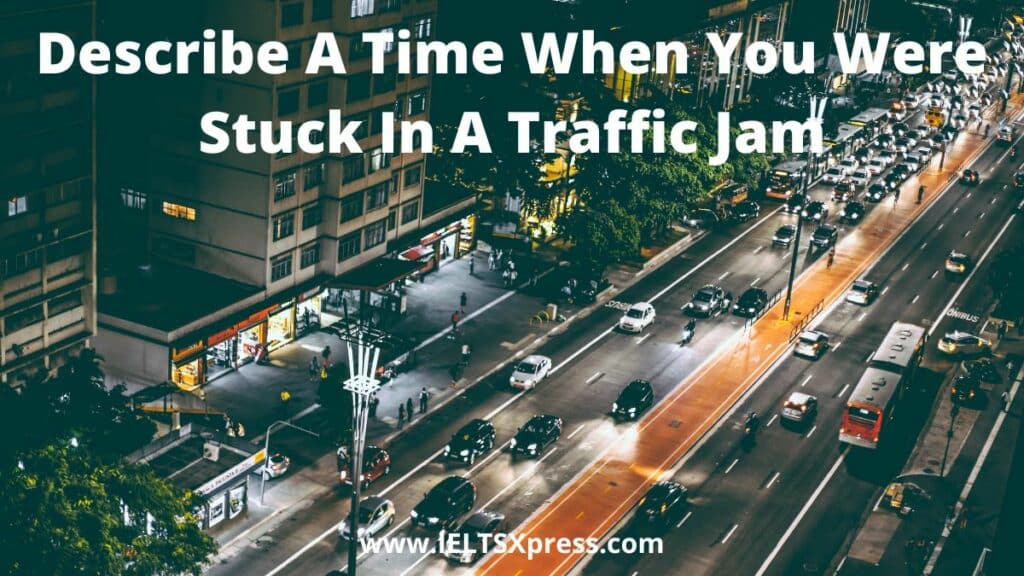
Describe A Time When You Were Stuck In A Traffic Jam
Leave a comment cancel reply.
Your email address will not be published. Required fields are marked *
Yes, add me to your mailing list
Start typing and press enter to search
- NONFICTION BOOKS
- BEST NONFICTION 2023
- BEST NONFICTION 2024
- Historical Biographies
- The Best Memoirs and Autobiographies
- Philosophical Biographies
- World War 2
- World History
- American History
- British History
- Chinese History
- Russian History
- Ancient History (up to 500)
- Medieval History (500-1400)
- Military History
- Art History
- Travel Books
- Ancient Philosophy
- Contemporary Philosophy
- Ethics & Moral Philosophy
- Great Philosophers
- Social & Political Philosophy
- Classical Studies
- New Science Books
- Maths & Statistics
- Popular Science
- Physics Books
- Climate Change Books
- How to Write
- English Grammar & Usage
- Books for Learning Languages
- Linguistics
- Political Ideologies
- Foreign Policy & International Relations
- American Politics
- British Politics
- Religious History Books
- Mental Health
- Neuroscience
- Child Psychology
- Film & Cinema
- Opera & Classical Music
- Behavioural Economics
- Development Economics
- Economic History
- Financial Crisis
- World Economies
- How to Invest
- Artificial Intelligence/AI Books
- Data Science Books
- Sex & Sexuality
- Death & Dying
- Food & Cooking
- Sports, Games & Hobbies
- FICTION BOOKS
- BEST NOVELS 2024
- BEST FICTION 2023
- New Literary Fiction
- World Literature
- Literary Criticism
- Literary Figures
- Classic English Literature
- American Literature
- Comics & Graphic Novels
- Fairy Tales & Mythology
- Historical Fiction
- Crime Novels
- Science Fiction
- Short Stories
- South Africa
- United States
- Arctic & Antarctica
- Afghanistan
- Myanmar (Formerly Burma)
- Netherlands
- Kids Recommend Books for Kids
- High School Teachers Recommendations
- Prizewinning Kids' Books
- Popular Series Books for Kids
- BEST BOOKS FOR KIDS (ALL AGES)
- Ages Baby-2
- Books for Teens and Young Adults
- THE BEST SCIENCE BOOKS FOR KIDS
- BEST KIDS' BOOKS OF 2023
- BEST BOOKS FOR TEENS OF 2023
- Best Audiobooks for Kids
- Environment
- Best Books for Teens of 2023
- Best Kids' Books of 2023
- Political Novels
- New History Books
- New Historical Fiction
- New Biography
- New Memoirs
- New World Literature
- New Economics Books
- New Climate Books
- New Math Books
- New Philosophy Books
- New Psychology Books
- New Physics Books
- THE BEST AUDIOBOOKS
- Actors Read Great Books
- Books Narrated by Their Authors
- Best Audiobook Thrillers
- Best History Audiobooks
- Nobel Literature Prize
- Booker Prize (fiction)
- Baillie Gifford Prize (nonfiction)
- Financial Times (nonfiction)
- Wolfson Prize (history)
- Royal Society (science)
- Pushkin House Prize (Russia)
- Walter Scott Prize (historical fiction)
- Arthur C Clarke Prize (sci fi)
- The Hugos (sci fi & fantasy)
- Audie Awards (audiobooks)
Make Your Own List
Nonfiction Books » Essays
The best essays: the 2021 pen/diamonstein-spielvogel award, recommended by adam gopnik.

WINNER OF the 2021 PEN/Diamonstein-Spielvogel Award for the Art of the Essay
Had I Known: Collected Essays by Barbara Ehrenreich
Every year, the judges of the PEN/Diamonstein-Spielvogel Award for the Art of the Essay search out the best book of essays written in the past year and draw attention to the author's entire body of work. Here, Adam Gopnik , writer, journalist and PEN essay prize judge, emphasizes the role of the essay in bearing witness and explains why the five collections that reached the 2021 shortlist are, in their different ways, so important.
Interview by Benedict King
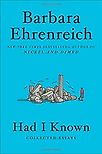
Unfinished Business: Notes of a Chronic Re-Reader by Vivian Gornick
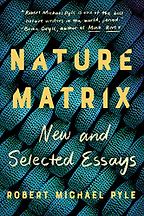
Nature Matrix: New and Selected Essays by Robert Michael Pyle
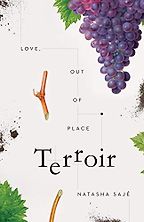
Terroir: Love, Out of Place by Natasha Sajé
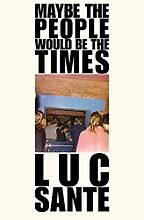
Maybe the People Would be the Times by Luc Sante

1 Had I Known: Collected Essays by Barbara Ehrenreich
2 unfinished business: notes of a chronic re-reader by vivian gornick, 3 nature matrix: new and selected essays by robert michael pyle, 4 terroir: love, out of place by natasha sajé, 5 maybe the people would be the times by luc sante.
W e’re talking about the books shortlisted for the 2021 PEN/Diamonstein-Spielvogel Award for the Art of the Essay . As an essayist yourself, or as a reader of essays, what are you looking for? What’s the key to a good essay ?
Let’s turn to the books that made the shortlist of the 2021 PEN Award for the Art of the Essay. The winning book was Had I Known: Collected Essays by Barbara Ehrenreich , whose books have been recommended a number of times on Five Books. Tell me more.
One of the criteria for this particular prize is that it should be not just for a single book, but for a body of work. One of the things we wanted to honour about Barbara Ehrenreich is that she has produced a remarkable body of work. Although it’s offered in a more specifically political register than some essayists, or that a great many past prize winners have practised, the quiddity of her work is that it remains rooted in personal experience, in the act of bearing witness. She has a passionate political point to make, certainly, a series of them, many seeming all the more relevant now than when she began writing. Nonetheless, her writing still always depends on the intimacy of first-hand knowledge, what people in post-incarceration work call ‘lived experience’ (a term with a distinguished philosophical history). Her book Nickel and Dimed is the classic example of that. She never writes from a distance about working-class life in America. She bears witness to the nature and real texture of working-class life in America.
“One point of giving awards…is to keep passing the small torches of literary tradition”
Next up of the books on the 2021 PEN essay prize shortlist is Unfinished Business: Notes of a Chronic Re-Reader by Vivian Gornick.
Vivian Gornick is a writer who’s been around for a very long time. Although longevity is not in itself a criterion for excellence—or for this prize, or in the writing life generally—persistence and perseverance are. Writers who keep coming back at us, again and again, with a consistent vision, are surely to be saluted. For her admirers, her appetite to re-read things already read is one of the most attractive parts of her oeuvre , if I can call it that; her appetite not just to read but to read deeply and personally. One of the things that people who love her work love about it is that her readings are never academic, or touched by scholarly hobbyhorsing. They’re readings that involve the fullness of her experience, then applied to literature. Although she reads as a critic, she reads as an essayist reads, rather than as a reviewer reads. And I think that was one of the things that was there to honour in her body of work, as well.
Is she a novelist or journalist, as well?
Let’s move on to the next book which made the 2021 PEN essay shortlist. This is Nature Matrix: New and Selected Essays by Robert Michael Pyle.
I have a special reason for liking this book in particular, and that is that it corresponds to one of the richest and oldest of American genres, now often overlooked, and that’s the naturalist essay. You can track it back to Henry David Thoreau , if not to Ralph Waldo Emerson , this American engagement with nature , the wilderness, not from a narrowly scientific point of view, nor from a purely ecological or environmental point of view—though those things are part of it—but again, from the point of view of lived experience, of personal testimony.
Let’s look at the next book on the shortlist of the 2021 PEN Awards, which is Terroir: Love, Out of Place by Natasha Sajé. Why did these essays appeal?
One of the things that was appealing about this book is that’s it very much about, in every sense, the issues of the day: the idea of place, of where we are, how we are located on any map as individuals by ethnic identity, class, gender—all of those things. But rather than being carried forward in a narrowly argumentative way, again, in the classic manner of the essay, Sajé’s work is ruminative. It walks around these issues from the point of view of someone who’s an expatriate, someone who’s an émigré, someone who’s a world citizen, but who’s also concerned with the idea of ‘terroir’, the one place in the world where we belong. And I think the dialogue in her work between a kind of cosmopolitanism that she has along with her self-critical examination of the problem of localism and where we sit on the world, was inspiring to us.
Get the weekly Five Books newsletter
Last of the books on the shortlist for the 2021 Pen essay award is Maybe the People Would Be the Times by Luc Sante.
Again, here’s a writer who’s had a distinguished generalised career, writing about lots of places and about lots of subjects. In the past, he’s made his special preoccupation what he calls ‘low life’, but I think more broadly can be called the marginalized or the repressed and abject. He’s also written acute introductions to the literature of ‘low life’, the works of Asbury and David Maurer, for instance.
But I think one of the things that was appealing about what he’s done is the sheer range of his enterprise. He writes about countless subjects. He can write about A-sides and B-sides of popular records—singles—then go on to write about Jacques Rivette’s cinema. He writes from a kind of private inspection of public experience. He has a lovely piece about tabloid headlines and their evolution. And I think that omnivorous range of enthusiasms and passions is a stirring reminder in a time of specialization and compartmentalization of the essayist’s freedom to roam. If Pyle is in the tradition of Thoreau, I suspect Luc Sante would be proud to be put in the tradition of Baudelaire—the flaneur who walks the streets, sees everything, broods on it all and writes about it well.
One point of giving awards, with all their built-in absurdity and inevitable injustice, is to keep alive, or at least to keep passing, the small torches of literary tradition. And just as much as we’re honoring the great tradition of the naturalist essay in the one case, I think we’re honoring the tradition of the Baudelairean flaneur in this one.
April 18, 2021
Five Books aims to keep its book recommendations and interviews up to date. If you are the interviewee and would like to update your choice of books (or even just what you say about them) please email us at [email protected]
Support Five Books
Five Books interviews are expensive to produce. If you've enjoyed this interview, please support us by donating a small amount .
©Brigitte Lacombe
Adam Gopnik
Adam Gopnik has been a staff writer at the New Yorker since 1986. His many books include A Thousand Small Sanities: The Moral Adventure of Liberalism . He is a three time winner of the National Magazine Award for Essays & Criticism, and in 2021 was made a chevalier of the Legion d'Honneur by the French Republic.
We ask experts to recommend the five best books in their subject and explain their selection in an interview.
This site has an archive of more than one thousand seven hundred interviews, or eight thousand book recommendations. We publish at least two new interviews per week.
Five Books participates in the Amazon Associate program and earns money from qualifying purchases.
© Five Books 2024
- Search Results
The best essay collections to read now
From advice on friendship and understanding modern life to getting a grasp on coronavirus, these books offer insight on life.
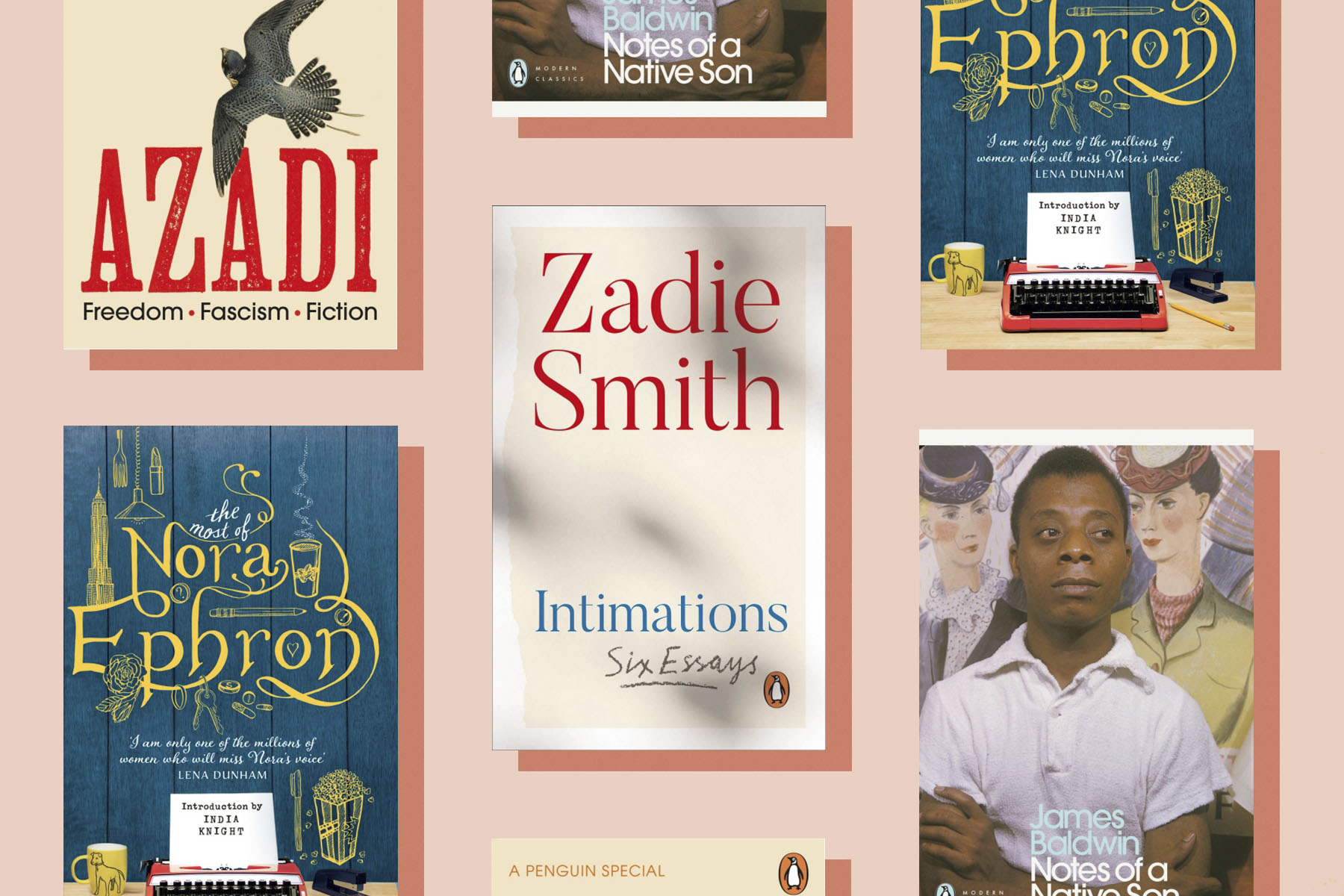
What better way to get into the work of a writer than through a collection of their essays?
These seven collections, from novelists and critics alike, address a myriad of subjects from friendship to how colleges are dealing with sexual assaults on campus to race and racism.
Trick Mirror by Jia Tolentino (2019)
As a staff writer at The New Yorker , Jia Tolentino has explored everything from a rise in youth vaping to the ongoing cultural reckoning about sexual assault. Her first book Trick Mirror takes some of those pieces for The New Yorker as well as new work to form what is one of the sharpest collections of cultural criticism today.
Using herself and her own coming of age as a lens for many of the essays, Tolentino turns her pen and her eye to everything from her generation’s obsession with extravagant weddings to how college campuses deal with sexual assault.
If you’re looking for an insight into millennial life, then Trick Mirror should be on your to-read list.
In Search of Our Mothers’ Gardens by Alice Walker (1983)
Sometimes essays collected from a sprawling period of a successful writer’s life can feel like a hasty addition to a bibliography; a smash-and-grab of notebook flotsam. Not so In Search of Our Mother’s Gardens , from which one can truly understand the sheer range of the Pulitzer Prize winner’s range of study and activism. From Walker’s first published piece of non-fiction (for which she won a prize, and spent her winnings on cut peonies) to more elegiac pieces about her heritage, Walker’s thoughts on feminism (which she terms “womanism”) and the Civil Rights Movement remain grippingly pertinent 50 years on.
Me Talk Pretty One Day by David Sedaris (2000)
That David Sedaris’s ascent to literary stardom happened later in his life – his breakthrough collection of humour essays was released when he was 44 – suited the author’s writing style perfectly. Me Talk Pretty One Day is both a painfully funny account of his childhood and an enduring snapshot of mid-forties malaise. First story ‘Go Carolina’, about his attempt to transcend a childhood lisp, is told from a perfect distance and with all the worldliness necessary to milk every drop of tragic, cringeworthy humour from his childhood. It never falters from there: by the book’s second half, in which Sedaris is living in France, he’s firmly established his niche, writing about the ways that even snobs experience utter humiliation – and Me Talk Pretty One Day is all the more human for it.
Sign up to the Penguin Newsletter
By signing up, I confirm that I'm over 16. To find out what personal data we collect and how we use it, please visit our Privacy Policy

25,000+ students realised their study abroad dream with us. Take the first step today
Here’s your new year gift, one app for all your, study abroad needs, start your journey, track your progress, grow with the community and so much more.

Verification Code
An OTP has been sent to your registered mobile no. Please verify

Thanks for your comment !
Our team will review it before it's shown to our readers.

Speech on My Favourite Book
- Updated on
- Jun 2, 2021

Preparing for public speeches can be daunting for many students. From overcoming stage fright to deciding on the right topic to finding the right arguments, the process is quite lengthy. That is why, in this blog, we have curated two samples for speech on My favourite book to help you prepare better for your speaking and listening tasks at school.
Speech on My Favourite Book (2-3 Minutes)
Good morning to all. My name is Reeva Raj and my topic for the English-speaking task is My favourite book. “ Books are the quietest and most constant of friends; they are the most accessible and wisest of counselors, and the most patient of teachers”. Books are friends who never leave your side. I find this saying to be very true as books have always been there for me. I enjoy reading books. My favourite book is Harry Potter by J.K Rowling. This book is about wizards and the wizarding world. Harry Potter contains a total of seven books. Harry Potter and the Chamber of Secrets is the 2nd book in the series and it’s my favourite.
There are so many things for readers to learn from the series Harry Potter. It teaches us the importance of friendship. It teaches us that someone’s background doesn’t determine his or her value as a person and many more lessons. It also showed me that no one in this universe is perfect. Everyone has good and evil inside them. I have learnt a lot from this great book. It remains one of the most precious treasures of mankind.
Speech for 5-10 Minutes
Good morning to all. My name is Reeva Raj and my topic for the English-speaking task is My favourite book. “ Books are the quietest and most constant of friends; they are the most accessible and wisest of counselors, and the most patient of teachers”. Books are friends who never leave your side. I find this saying to be very true as books have always been there for me. I enjoy reading books. My favourite book is Iliad by Homer. The Iliad is an epic poem written by the Greek poet Homer. It tells the story of the last year of the Trojan War fought between the city of Troy and the Greeks. Achilles – Achilles is the main character and the greatest warrior in the world.
The Iliad teaches us many things, such as The importance of family is a central theme in the epic, the lovely scene of Hector with Andromache and his son is heartwarming all these years later.The friendship between Achilles and Patroclus is incredibly touching. The way Achilles fiercely and obsessively seeks vengeance for Patroclus has made many question if there was a romance between them.Priam losing his greatest son Hector and his supplication to Achilles to return his body so he and Troy can properly mourn its protector is another example of the theme of family.Achilles too lamenting his own father and how he shall never see him again, Priam and Achilles weeping together shows the futility of war as well as how family has affected these two enemies together.
The classics of Greece and Rome provide us with a set of connected stories and a cast of characters that teach us what it means to be human. They are also the basis of literature, teaching us about natural man (man at his best and worst, but natural man). They don’t give us the answers that we find in revelation, but they do give us the questions.
Books are wonderful – a bundle of pages with a cover on top brimming with content that stimulates the human imagination and helps us escape pressing reality. They are also beneficial to health. If you don’t like reading books, it’s definitely worth trying different genres until you find what interests you. Thank you for listening. I hope the speech was informative for you.
How to Prepare for a Speech?

We hope that you liked our blog on speech on my favourite book. To get assistance on how you can study abroad, get in touch with Leverage Edu experts. Book a free e-session with us today.
Team Leverage Edu
Leave a Reply Cancel reply
Save my name, email, and website in this browser for the next time I comment.
Contact no. *
thank you!!!!! so helpful for last minute assignments!
Thanks for reading! You can also check: Speech on Indian Culture Speech on Child Labour Speech on Right to Education
its realy good👍im thankful🙏
Thank you, Gurdeep!
It’s very thankful and i have the compitition and it is very helpful Can you make a speech on if I were a doctor ☺️
it’s very helpful I’m able to speak it in front of my teacher now:)

Leaving already?
8 Universities with higher ROI than IITs and IIMs
Grab this one-time opportunity to download this ebook
Connect With Us
25,000+ students realised their study abroad dream with us. take the first step today..

Resend OTP in

Need help with?
Study abroad.
UK, Canada, US & More
IELTS, GRE, GMAT & More
Scholarship, Loans & Forex
Country Preference
New Zealand
Which English test are you planning to take?
Which academic test are you planning to take.
Not Sure yet
When are you planning to take the exam?
Already booked my exam slot
Within 2 Months
Want to learn about the test
Which Degree do you wish to pursue?
When do you want to start studying abroad.
September 2024
January 2025
What is your budget to study abroad?

How would you describe this article ?
Please rate this article
We would like to hear more.
- Essay on My Favourite Book in 200, 300, 400, 500, 600 Words
We all need to make a habit of book reading. Here are a few essays on My Favourite Book in 200, 300, 400, 500, and 600 Words. These are very easy and simple to learn for all students. You can find a useful one for yourself.
In This Blog We Will Discuss
Essay on My Favourite Book in 200 Words
The book is the best friend of humans. It never leaves us. It always helps us to get better by heart and knowledge. The best place to get the knowledge is a book. Because of encouragement from my teachers and my parents , I have been a huge book lover.
I love reading books. I have a big collection of books. I mostly love to read books based on science. It is my favorite topic. I have read lots of science fiction. My favorite book is ‘Frankenstein’ and it’s science fiction.
When I read this book for the first time, I was amazed and stunned. The writer Mary Shelley had an amazing imagination power. This book tells the story of a scientist named Victor Frankenstein, who created a hideous sapient creature by his unorthodox experiment.
The entire story is based on that ‘creature’. This book is full of suspense and thrill. I have read it three times and watched the movie too. It is amazing and mind-blowing. This book was published in 1818.
The author Mary Shelley is an astonishing writer who has written tons of beautiful books. I suggest this book to everyone. You should read it if you have not. I am sure you will love this.
Essay on My Favourite Book in 300 Words
Introduction:
Book reading is a very good habit that everyone should build. It helps to build confidence, gain inspiration, and motivation. I am a book lover and I read books. I have a small library in my home . I suggest everyone read more and more books.
It is the best way to learn something new. We can travel the entire world through words written in the books. There are a few books that I really like, Harry Potter is one of them. Actually it is my most favorite book ever.
My Favorite Book:
Harry Potter is a fictional story series authored by British writer J. K. Rowling. She is an excellent writer. I am really surprised to see her imagination level. I have seen the movie series of this book too. That was mind-blowing.
The story is fictional and different. It’s all about a wizard world. Hermione Granger and Ron Weasly are my most favorite characters in this book. I love the ‘Goblet of Fire’ most. This chapter is amazing. I love other chapters too, but this one seems special to me.
Overall I have been a huge fan of J. K. Rowling after reading this book. This fictional fantasy book has earned a huge amount of money. This book was loved by young people mostly.
Conclusion:
You should read Harry Potter if you have not yet. This is an amazing novel to read. I suggest this to everyone. If you love reading fictional stories, then you will become a fan of this series. Though there are not so many educational things in this book it was entertaining.
Essay on My Favourite Book in 400 Words
I am a book lover and I love reading books. My favorite genre is Motivation. I have read tons of books that have motivational content. Among them some books are amazing. And today I am going to talk about a book that I really like. This book’s name is ‘The Magic of Thinking Big’.
My Favourite Book:
The Magic of Thinking Big has been authored by David J. Schwartz. He is an amazing writer and wrote an amazing piece of the book. Before starting any business, you must read this book to grow your mentality.
This book taught me lots of lessons and that’s why I love it so much. I have read a few other books too authored by the same writer but I found this one the best.
Motivation is a highly important thing in our life to get success and this book will take your motivation on a peak and you will get lots of inspiration to start something new and fresh.
Reasons Why It is My Favorite Book:
Let’s talk about the reasons why it is my favorite book. There are some important lessons that this book teaches me, that’s why it is my favorite book. The first reason is, it creates a belief inside you that you will start believing that you will get success for sure.
This is a huge mindset for any entrepreneur who is in an early stage. There are so many excuses that we make before doing anything. When you will read this book properly you will stop making these nonsense excuses.
You will become a more dedicated person to your work. Hopefully, it will destroy all of your fear and will give you lots of confidence to do something new. Creativity is a huge asset for doing something. You will get better creativity power and will be able to visualize all of your plans in front of your eyes.
You will learn how to manage the environment around you and you are exactly that person who you think you are. I think these are some amazing lessons that a person can get in his life. And it will help to grow better in a positive way.
I am suggesting this book to read for everyone. People of any age level can read and understand this amazing book. It helped me to make my confidence level high.
Essay on My Favourite Book Quran in 500 Words
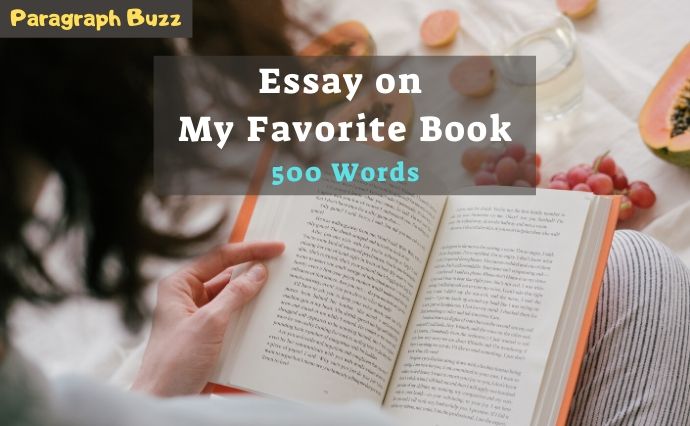
People read books to feed their mind that is hungry for knowledge. I am a book lover and I love reading lots of books. I have a list of my favorite books. But one book is very special for me and it’s a holy book in the religion of Islam.
I hope you can guess it’s the Quran. That book has been life-changing for me. And today I will tell you why it is my favorite book and what you can learn from this.
My Favourite Book Quran:
As a Muslim, I was taught the Quran at a young age. But we are not native Arabic speakers that language is being used in the Quran. But when I grew up, I bought English translated Quran for me. I read the whole book within two days and it was a huge breakthrough in my life.
It changed my vision, my perspective, and my motive of life. Let me tell you how all that happened. First of let’s talk about how this holy book came to us. It was almost 1450 years ago, it came to the Prophet Muhammad (PBUH).
Allah sent it to his part by part. This book is unchanged and still carrying the same content. The most surprising thing is that it still can be a guide for the ultimate good life after 14 hundreds of years. That’s why Islamic scholars tell ‘the Quran is the perfect solution for life’. Whatever we need to learn, solve, or think everything has been discussed in the Quran.
There was an open challenge for mankind if they make a similar chapter of the Quran. But it’s not possible to write. Because this book has come directly from the Almighty Allah. It wasn’t written by any human.
Why is the Quran My Favourite Book?
Everything that we need to survive in the world has been discussed in the Holy Quran. If you need to find a solution to any too complex problem, you can find a proper solution in this book. You need to have the proper knowledge to research that.
There are lots of Islamic countries in the world that are operating their laws based on the Quran. It is very easy, useful, and great for mankind. Allah said that a person who reads the Quran regularly fills his heart with blessings.
We can earn lots of rewards for the afterlife by reading the Quran. It’s a huge threat to the heart. When we feel sick inside, it helps us to heal it. The Quran has talked about education, medication, science, and different inventions.
There are some surprising things that have been discussed in the Quran and the current science has proved them now. The scientists took the help of the Quran to make the world a better place by inventing new things.
Conclusion:
Overall the Quran is the solution for a complete life. I am sure you will love it if you read it. It should be one of your most-read books.
Essay on My Favourite Book in 600 Words
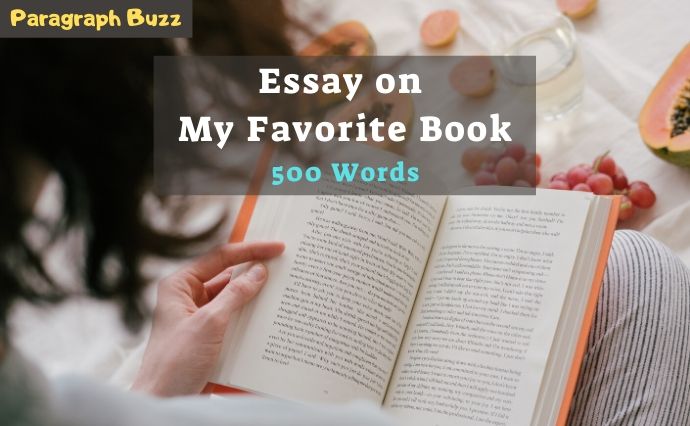
Books are our best friend and they never leave us. That’s a huge truth that I can realize. I am a passionate book reader and I love to read lots of books every week. We have a family library and my father helps me to collect and buy books.
I have read tons of amazing books, but there are some special books which have taken my heart away. Today I am going to talk about my most favorite books ‘Robinson Crusoe’. This book has always been a different thing for me and I am still reading it again and again. There are lots of lessons to learn from this amazing novel.
My Favourite Book:
My favorite book Robinson Crusoe was written by Daniel Defoe and it first published on 25 April 1719. A very important thing to note is that this book is 300 years old, but the content and storyline are still feeling amazing to the new generation of readers.
This book contains a story named a person ‘Robinson’ who lived on an island for 28 years. He fell in a ship accident and lost everything. Then he found a boat to drive to the nearest island. It was a huge island.
He made his own kingdom there. He collected his food by taming animals and growing some crops. He became a permanent member of the island. Some day he faced something brutal and different. He found a man was naked brought to the island by some cannibals.
He rescued the person and gave him the name ‘Friday’. Friday became his partner but he was also a member of cannibals. That’s why Robinson kept him outside of his tent.
Then Friday became the partner of Robinson and they both made the island an amazing place for themselves. In the end, a ship came to their island and there was lots of adventure and stories that will make you feel thrilled.
Why Do I Like This Book?
There are so many reasons that are why I like this book. The first reason is it teaches me about life and reality. I get very serious when I read this book. I have read it almost 4 times and am still reading it again.
What Did This Book Teach Me?
This book is a huge learning for me. For the first 20 years, Robinson was living there all alone. And that time he managed to survive because of his intelligence, courage, and dedication. That’s a huge learning for me.
It teaches how to keep yourself focused when you are alone and under lots of problems. This story is about how a man creates his own reality. When Robinson found Friday and he became the best companion for him.
He taught him language, religion, and overall civilization. Including all these things this book is like a teacher to me. It helps me to understand lots of harsh reality.
My Hobby Book Reading:
I have made reading my hobby. I never waste time. I love to read books when I am free or spending leisure time. I think everyone should get this habit. It is very important and essential to building a better knowledge base.
We can learn different types of things by reading books. My hobby is reading and I always read books. I have a huge collection of different types of books.
Book reading is a huge thing that we all should be up to. It helps us to travel through words by staying in the same place. We all need to build book reading habits to make our imagination power stronger.
10 Lines Essay on My Favourite Book
1. Book reading is a very good habit because it helps us to improve our personality and make us mature.
2. Some books are priceless and they teach us some amazing lessons.
3. My favorite book name is ‘Robinson Crusoe’. This is a world-famous book written by Daniel Defoe.
4. This book was written 300 years ago, but still now people read it with the same love and interest.
5. It has so many lessons to learn. The patience of Robinson is amazing.
6. It teaches us how to survive when none is around you and you are alone.
7. This book could be a life guide for yourself.
8. Robinson spent 28 years on an island all alone.
9. It is a story about how a man struggles against all the odd things in life.
10. I love reading this book again and again. If you have not read this book yet, then you should read it today.
How do I write an essay about my favorite book?
Make a shortlist of your favorite books first. It’s better to pick top 10 books first. And then write which book has what types of impact of your real life and on your thinking. That’s how you will come with your favorite book. And then write what this book taught you and be able to teach the same someone else.
Why is Harry Potter My Favourite book?
It is a very amazing fiction that was loved by millions of young people in the world. There is a movie series too based on this story. I love this book because of its mind-blowing story and few interesting characters.
More Essays:
- Essay on Freedom of the Press in 600 Words for Students
- Essay on Internet Advantages and Disadvantages for Class 1-12
- Essay on Winter Season in 200, 300, 400, 500, 600 Words for Class 1-12
- Essay on Internet in 300, 400, 500, 600 Words for Class 1-12
- Essay on Good Manners in 300, 400, 500, 600 Words for Class 1-10
- Essay on Early Rising in 300, 400, 500, 600 Words for Class 1-10
- Essay on Advantages and Disadvantages of Mobile Phone for Class 1-12
- Essay on My Favourite Teacher in 400, 500, 600, 700 Words for Class 1-12
- Value of Education Essay in 300, 400, 500, 600, 700 Words for Class 1-12
- Essay on Childhood Memories in 200, 300, 400, 500, 600 Words
- Essay on Village Life in 300, 400, 500, 600 Words for Class 1-10
- Essay on My Father in 300, 400, 500, 600, 700 Words for Class 1-10
- Essay on My Village in 200, 300, 400, 500, 600 Words for Class 1-10
- Essay on My Daily Routine | 200, 300, 400, 500 Words for Class 1-10
Related posts:
- Essay on Importance of Games and Sports: 200, 300, 400, 500, 600 Words
- Essay on Importance of Computer for All Students
- Essay on Social Media for School and College Students
- Essay on Female Education: For All Students
- Essay on Aim in Life | 100, 150, 300, 500 Words Paragraphs and Essays
- Essay on My Home in 200, 300, 400, 500, 600 Words for All Classes
1 thought on “Essay on My Favourite Book in 200, 300, 400, 500, 600 Words”
Pingback: My Hobby Paragraphs | 100, 150, 200, 250, 300 Words for Class 1-10
Comments are closed.
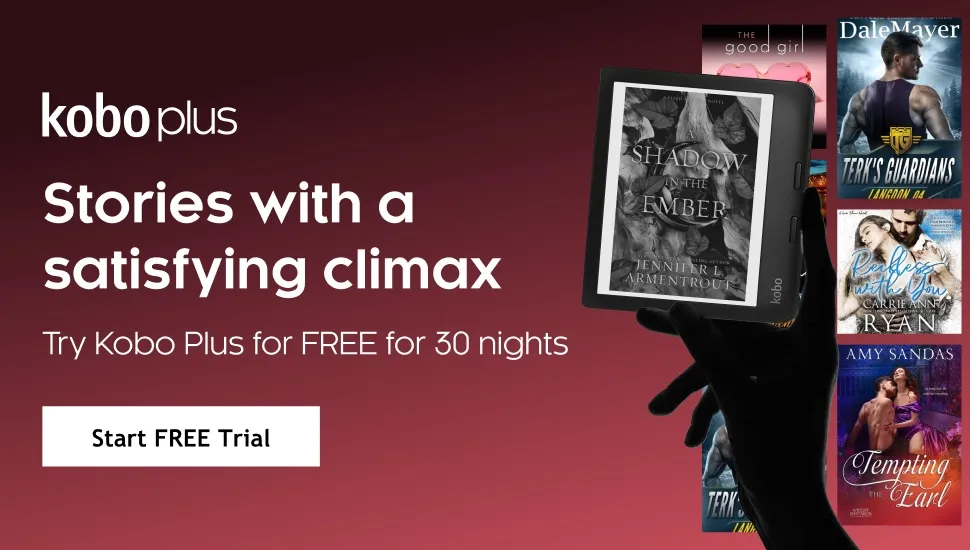
25 Great Nonfiction Essays You Can Read Online for Free
Alison Doherty
Alison Doherty is a writing teacher and part time assistant professor living in Brooklyn, New York. She has an MFA from The New School in writing for children and teenagers. She loves writing about books on the Internet, listening to audiobooks on the subway, and reading anything with a twisty plot or a happily ever after.
View All posts by Alison Doherty
I love reading books of nonfiction essays and memoirs , but sometimes have a hard time committing to a whole book. This is especially true if I don’t know the author. But reading nonfiction essays online is a quick way to learn which authors you like. Also, reading nonfiction essays can help you learn more about different topics and experiences.
Besides essays on Book Riot, I love looking for essays on The New Yorker , The Atlantic , The Rumpus , and Electric Literature . But there are great nonfiction essays available for free all over the Internet. From contemporary to classic writers and personal essays to researched ones—here are 25 of my favorite nonfiction essays you can read today.

“Beware of Feminist Lite” by Chimamanda Ngozi Adichie
The author of We Should All Be Feminists writes a short essay explaining the danger of believing men and woman are equal only under certain conditions.
“It’s Silly to Be Frightened of Being Dead” by Diana Athill
A 96-year-old woman discusses her shifting attitude towards death from her childhood in the 1920s when death was a taboo subject, to World War 2 until the present day.
“Letter from a Region in my Mind” by James Baldwin
There are many moving and important essays by James Baldwin . This one uses the lens of religion to explore the Black American experience and sexuality. Baldwin describes his move from being a teenage preacher to not believing in god. Then he recounts his meeting with the prominent Nation of Islam member Elijah Muhammad.
“Relations” by Eula Biss
Biss uses the story of a white woman giving birth to a Black baby that was mistakenly implanted during a fertility treatment to explore racial identities and segregation in society as a whole and in her own interracial family.
“Friday Night Lights” by Buzz Bissinger
A comprehensive deep dive into the world of high school football in a small West Texas town.
“The Case for Reparations” by Ta-Nehisi Coates
Coates examines the lingering and continuing affects of slavery on American society and makes a compelling case for the descendants of slaves being offered reparations from the government.
“Why I Write” by Joan Didion
This is one of the most iconic nonfiction essays about writing. Didion describes the reasons she became a writer, her process, and her journey to doing what she loves professionally.
“Go Gentle Into That Good Night” by Roger Ebert
With knowledge of his own death, the famous film critic ponders questions of mortality while also giving readers a pep talk for how to embrace life fully.
“My Mother’s Tongue” by Zavi Kang Engles
In this personal essay, Engles celebrates the close relationship she had with her mother and laments losing her Korean fluency.
“My Life as an Heiress” by Nora Ephron
As she’s writing an important script, Ephron imagines her life as a newly wealthy woman when she finds out an uncle left her an inheritance. But she doesn’t know exactly what that inheritance is.
“My FatheR Spent 30 Years in Prison. Now He’s Out.” by Ashley C. Ford
Ford describes the experience of getting to know her father after he’s been in prison for almost all of her life. Bridging the distance in their knowledge of technology becomes a significant—and at times humorous—step in rebuilding their relationship.
“Bad Feminist” by Roxane Gay
There’s a reason Gay named her bestselling essay collection after this story. It’s a witty, sharp, and relatable look at what it means to call yourself a feminist.

“The Empathy Exams” by Leslie Jamison
Jamison discusses her job as a medical actor helping to train medical students to improve their empathy and uses this frame to tell the story of one winter in college when she had an abortion and heart surgery.
“What I Learned from a Fitting Room Disaster About Clothes and Life” by Scaachi Koul
One woman describes her history with difficult fitting room experiences culminating in one catastrophe that will change the way she hopes to identify herself through clothes.
“Breasts: the Odd Couple” by Una LaMarche
LaMarche examines her changing feelings about her own differently sized breasts.
“How I Broke, and Botched, the Brandon Teena Story” by Donna Minkowitz
A journalist looks back at her own biased reporting on a news story about the sexual assault and murder of a trans man in 1993. Minkowitz examines how ideas of gender and sexuality have changed since she reported the story, along with how her own lesbian identity influenced her opinions about the crime.
“Politics and the English Language” by George Orwell
In this famous essay, Orwell bemoans how politics have corrupted the English language by making it more vague, confusing, and boring.
“Letting Go” by David Sedaris
The famously funny personal essay author , writes about a distinctly unfunny topic of tobacco addiction and his own journey as a smoker. It is (predictably) hilarious.
“Joy” by Zadie Smith
Smith explores the difference between pleasure and joy by closely examining moments of both, including eating a delicious egg sandwich, taking drugs at a concert, and falling in love.
“Mother Tongue” by Amy Tan
Tan tells the story of how her mother’s way of speaking English as an immigrant from China changed the way people viewed her intelligence.
“Consider the Lobster” by David Foster Wallace
The prolific nonfiction essay and fiction writer travels to the Maine Lobster Festival to write a piece for Gourmet Magazine. With his signature footnotes, Wallace turns this experience into a deep exploration on what constitutes consciousness.
“I Am Not Pocahontas” by Elissa Washuta
Washuta looks at her own contemporary Native American identity through the lens of stereotypical depictions from 1990s films.
“Once More to the Lake” by E.B. White
E.B. White didn’t just write books like Charlotte’s Web and The Elements of Style . He also was a brilliant essayist. This nature essay explores the theme of fatherhood against the backdrop of a lake within the forests of Maine.
“Pell-Mell” by Tom Wolfe
The inventor of “new journalism” writes about the creation of an American idea by telling the story of Thomas Jefferson snubbing a European Ambassador.
“The Death of the Moth” by Virginia Woolf
In this nonfiction essay, Wolf describes a moth dying on her window pane. She uses the story as a way to ruminate on the lager theme of the meaning of life and death.
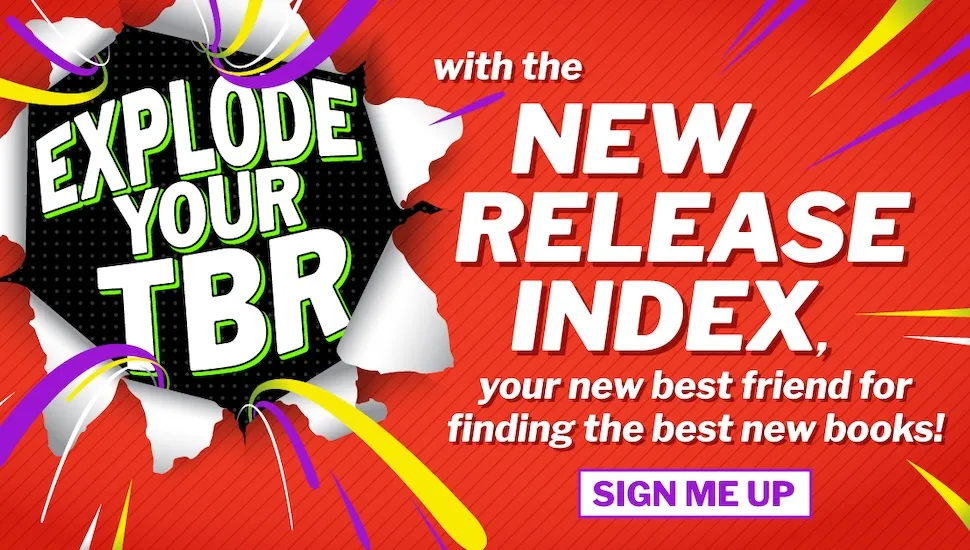
You Might Also Like

Looking to publish? Meet your dream editor, designer and marketer on Reedsy.
Find the perfect editor for your next book
1 million authors trust the professionals on Reedsy. Come meet them.
Blog • Perfecting your Craft
Last updated on May 31, 2022
The 40 Best Books About Writing: A Reading List for Authors
For this post, we’ve scoured the web (so you don’t have to) and asked our community of writers for recommendations on some indispensable books about writing. We've filled this list with dozens of amazing titles, all of which are great — but this list might seem intimidating. So for starters, here are our top 10 books about writing:
- On Writing by Stephen King
- The Kick-Ass Writer by Chuck Wendig
- Dreyer’s Englis h by Benjamin Dreyer
- The Elements of Style by Strunk, White, and Kalman
- The Story Grid by Shawn Coyne
- A Swim in a Pond in the Rain by George Saunders
- Bird by Bird by Anne Lamott
- Mouth Full of Blood by Toni Morrison
- How to Market a Book by Ricardo Fayet
- On Writing Well by William Zinsser
But if you're ready to get into the weeds, here are 40 of our favorite writing books.
Books about becoming a writer
1. on writing by stephen king.
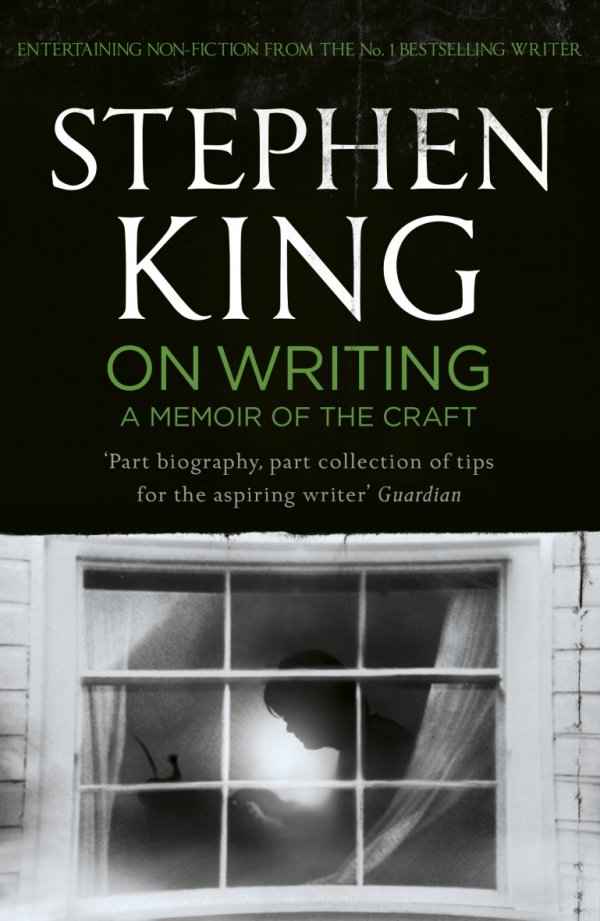
Perhaps the most-cited book on this list, On Writing is part-memoir, part-masterclass from one of America’s leading authors. Come for the vivid accounts of his childhood and youth — including his extended "lost weekend" spent on alcohol and drugs in the 1980s. Stay for the actionable advice on how to use your emotions and experiences to kickstart your writing, hone your skills, and become an author. Among the many craft-based tips are King’s expert takes on plot, story, character, and more.
From the book: “Amateurs sit and wait for inspiration, the rest of us just get up and go to work.”
2. The Kick-Ass Writer by Chuck Wendig
If you haven’t checked out Wendig’s personal blog, head over there now and bookmark it. Unfiltered, profane, and almost always right, Wendig’s become a leading voice among online writing communities in the past few years. In The Kick-Ass Writer , he offers over 1,000 pearls of wisdom for authors, ranging from express writing tips to guidance on getting published. Written to be read in short bursts, we’re sure he’d agree that this is the perfect bathroom book for writers.
From the book: “I have been writing professionally for a lucky-despite-the-number 13 years. Not once — seriously, not once ever — has anyone ever asked me where I got my writing degree… Nobody gives two ferrets fornicating in a filth-caked gym sock whether or not you have a degree… The only thing that matters is, Can you write well? ”
3. Find Your Voice by Angie Thomas
Taking advice from famous authors is not about imitation, but about finding your own voice . Take it from someone who knows: Thomas is the New York Times #1 Bestselling author of The Hate U Give , On the Come Up , and Concrete Rose . While she’s found her calling in YA literature , she has plenty of insight into finding your own voice in your genre of choice. Written in the form of a guided journal, this volume comes with step-by-step instructions, writing prompts, and exercises especially aimed at helping younger creatives develop the strength and skills to realize their vision.
From the book: “Write fearlessly. Write what is true and real to you.”
4. The Forest for the Trees by Betsy Lerner
Since its publication in 2000, The Forest for the Trees has remained an essential resource for authors at various stages in their careers. As an editor, Lerner gives advice not only on producing quality content, but also on how to build your career as an author and develop a winning routine — like how writers can be more productive in their creative process, how to get published , and how to publish well .
From the book: “The world doesn't fully make sense until the writer has secured his version of it on the page. And the act of writing is strangely more lifelike than life.”

Perfect your book with professional help
Meet the top book editors, designers, and marketers on Reedsy
Learn how Reedsy can help you craft a beautiful book.
5. How to Write Like Tolstoy by Richard Cohen
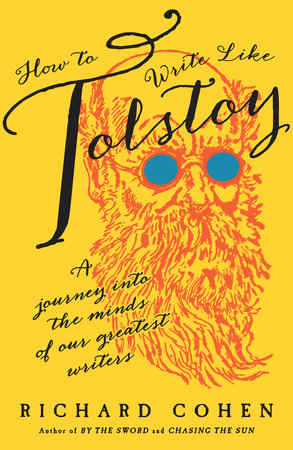
From the book: “Great writers can be inhibiting, and maybe after one has read a Scott Fitzgerald or Henry James one can’t escape imitating them; but more often such writers are inspiring.”
6. Feel Free: Essays by Zadie Smith
Smith is well-known for her fiction, but she is also a prolific essay writer. In Feel Free , she has gathered several essays on recent cultural and political developments and combined them with experiences from her own life and career. In “The I Who Is Not Me”, she explores how her own lived experience comes into play in her fiction writing, and how she manages to extrapolate that to comment on contemporary social contexts, discussing race, class, and ethnicity.
From the book: “Writing exists (for me) at the intersection of three precarious, uncertain elements: language, the world, the self. The first is never wholly mine; the second I can only ever know in a partial sense; the third is a malleable and improvised response to the previous two.”
Books about language and style
7. dreyer’s english by benjamin dreyer.
A staple book about writing well, Dreyer’s English serves as a one-stop guide to proper English, based on the knowledge that Dreyer — a senior copy editor at Random House — has accumulated throughout his career. From punctuation to tricky homophones, passive voice, and commas, the goal of these tools should be to facilitate effective communication of ideas and thoughts. Dreyer delivers this and then some, but not without its due dosage of humor and informative examples.
From the book: “A good sentence, I find myself saying frequently, is one that the reader can follow from beginning to end, no matter how long it is, without having to double back in confusion because the writer misused or omitted a key piece of punctuation, chose a vague or misleading pronoun, or in some other way engaged in inadvertent misdirection.”
8. The Elements of Style (Illustrated) by William Strunk, Jr., E. B. White, and Maira Kalman
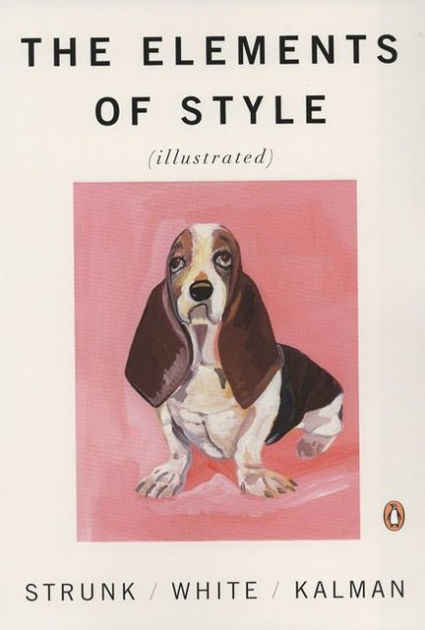
A perfect resource for visual learners, this illustrated edition of The Elements of Style has taken the classic style manual to a new, more accessible level but kept its main tenet intact: make every word tell. The written content by Strunk and White has long been referred to as an outline of the basic principles of style. Maira Kalman’s illustrations elevate the experience and make it a feast for both the mind and the eye.
From the book: “A sentence should contain no unnecessary words, a paragraph no unnecessary sentences, for the same reason that a drawing should have no unnecessary lines and a machine no unnecessary parts.”
9. Sin and Syntax by Constance Hale
If you’re looking to bring a bit of spunk into your writing, copy editor Constance Hale may hold the key . Whether you’re writing a work-related email or the next rap anthem, she has one goal: to make creative communication available to everyone by dispelling old writing myths and making every word count. Peppered with writing prompts and challenges, this book will have you itching to put pen to paper.
From the book: “Verbose is not a synonym for literary.”
10. The Sense of Style by Steven Pinker
Combining entertainment with intellectual pursuit, Pinker, a cognitive scientist and dictionary consultant, explores and rethinks language usage in the 21st century . With illustrative examples of both great and not-so-great linguistic constructions, Pinker breaks down the art of writing and gives a gentle but firm nudge in the right direction, towards coherent yet stylish prose. This is not a polemic on the decay of the English language, nor a recitation of pet peeves, but a thoughtful, challenging, and practical take on the science of communication.
From the book: “Why is so much writing so bad, and how can we make it better? Is the English language being corrupted by texting and social media? Do the kids today even care about good writing—and why should we care?”
11. Eats, Shoots, & Leaves: The Zero Tolerance Approach to Punctuation by Lynne Truss
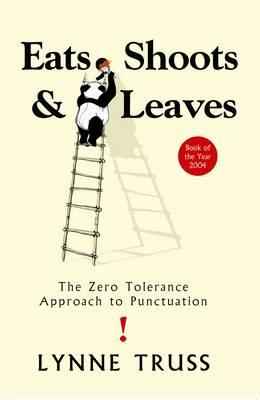
From the book: “A panda walks into a cafe. He orders a sandwich, eats it, then draws a gun and fires two shots in the air. "Why?" asks the confused waiter, as the panda makes towards the exit. The panda produces a badly punctuated wildlife annual and tosses it over his shoulder. "I'm a panda," he says, at the door. "Look it up." The waiter turns to the relevant entry and, sure enough, finds an explanation. Panda. Large black-and-white bear-like mammal, native to China. Eats, shoots and leaves.”
Books about story structure
12. save the cat by blake snyder.
Best known as a screenwriting manual, Save the Cat! is just as often named by authors as one of their most influential books about writing. The title comes from the tried-and-true trope of the protagonist doing something heroic in the first act (such as saving a cat) in order to win over the audience. Yes, it might sound trite to some — but others swear by its bulletproof beat sheet. More recently, there has been Save the Cat! Writes a Novel , which tailors its principles specifically to the literary crowd. (For a concise breakdown of the beat sheet, check this post out!)
From the book: “Because liking the person we go on a journey with is the single most important element in drawing us into the story.”
13. The Story Grid by Shawn Coyne
Shawn Coyne is a veteran editor with over 25 years of publishing experience, and he knows exactly what works and what doesn’t in a story — indeed, he’s pretty much got it down to a science. The Story Grid: What Good Editors Know outlines Coyne’s original “Story Grid” evaluation technique, which both writers and editors can use to appraise, revise, and ultimately improve their writing (in order to get it ready for publication). Coyne and his friend Tim Grahl also co-host the acclaimed Story Grid podcast , another great resource for aspiring writers.
From the book: “The Story Grid is a tool with many applications. It pinpoints problems but does not emotionally abuse the writer… it is a tool to re-envision and resuscitate a seemingly irredeemable pile of paper stuck in an attack drawer, and it can inspire an original creation.”
14. Story Structure Architect by Victoria Schmidt
For those who find the idea of improvising utterly terrifying and prefer the security of structures, this book breaks down just about every kind of story structure you’ve ever heard of. Victoria Schmidt offers no less than fifty-five different creative paths for your story to follow — some of which are more unconventional, or outright outlandish than others. The level of detail here is pretty staggering: Schmidt goes into the various conflicts, subplots, and resolutions these different story structures entail — with plenty of concrete examples! Suffice to say that no matter what kind of story you’re writing, you’ll find a blueprint for it in Story Structure Architect .
From the book: “When you grow up in a Westernized culture, the traditional plot structure becomes so embedded in your subconscious that you may have to work hard to create a plot structure that deviates from it… Understand this and keep your mind open when reading [this book]. Just because a piece doesn’t conform to the model you are used to, does not make it bad or wrong.”
15. The Writer's Journey by Christopher Vogler
Moving on, we hone in on the mythic structure. Vogler’s book, originally published in 1992, is now a modern classic of writing advice; though intended as a screenwriting textbook, its contents apply to any story of mythic proportions. In The Writer’s Journey: Mythic Structure for Writers , Vogler takes a page (literally) from Joseph Campbell’s Hero of a Thousand Faces to ruminate upon the most essential narrative structures and character archetypes of the writing craft. So if you’re thinking of drawing up an epic fantasy series full of those tropes we all know and love, this guide should be right up your alley.
From the book: “The Hero’s Journey is not an invention, but an observation. It is a recognition of a beautiful design… It’s difficult to avoid the sensation that the Hero’s Journey exists somewhere, somehow, as an external reality, a Platonic ideal form, a divine model. From this model, infinite and highly varied copies can be produced, each resonating with the essential spirit of the form.”
16. Story Genius by Lisa Cron
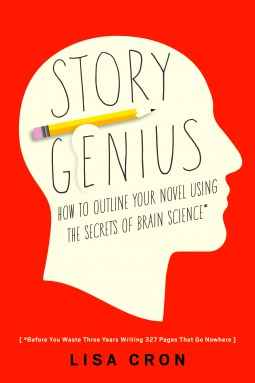
From the book: “We don't turn to story to escape reality. We turn to story to navigate reality.”
17. A Swim in a Pond in the Rain by George Saunders
More than just a New York Times bestseller and the winner of the Booker Prize, A Swim in a Pond in the Rain is a distillation of the MFA class on Russian short stories that Saunders has been teaching. Breaking down narrative functions and why we become immersed in a story, this is a must-read for anyone wanting to understand and nurture our continued need for fiction.
From the book: “We’re going to enter seven fastidiously constructed scale models of the world, made for a specific purpose that our time maybe doesn’t fully endorse but that these writers accepted implicitly as the aim of art—namely, to ask the big questions, questions like, How are we supposed to be living down here? What were we put here to accomplish? What should we value? What is truth, anyway, and how might we recognize it?”
Books about overcoming obstacles as a writer
18. bird by bird by anne lamott .
Like Stephen King’s book about writing craft, this work from acclaimed novelist and nonfiction writer Anne Lamott also fuses elements of a memoir with invaluable advice on the writer’s journey. Particularly known for popularizing the concept of “shitty first drafts”, Bird by Bird was recently recommended by editor Jennifer Hartmann in her Reedsy Live webinar for its outlook take on book writing. She said, “This book does exactly what it says it will do: it teaches you to become a better writer. [Lamott] is funny and witty and very knowledgeable.”
From the book: “Perfectionism is the voice of the oppressor, the enemy of the people. It will keep you cramped and insane your whole life, and it is the main obstacle between you and a shitty first draft.”
19. Take Off Your Pants by Libbie Hawker
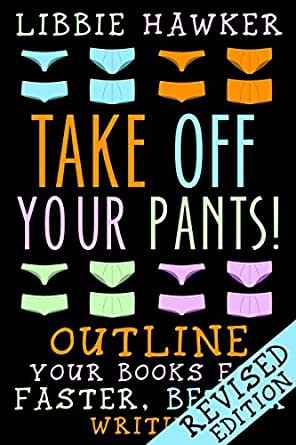
From the book: “When it comes to the eternal quandary of pantsing or plotting, you can keep a foot in each camp. But if your goals will require you to write with speed and confidence, an effective outline will be your best friend.”
20. Writing into the Dark by Dean Wesley Smith
And for those who eschew structure altogether, we’ll now refer you to this title from profile science fiction author Dean Wesley Smith . Having authored a number of official Star Trek novels, he definitely knows what he’s talking about when he encourages writers to go boldly into the unknown with an approach to writing books that doesn’t necessarily involve an elaborate plan. It might not be your action plan, but it can be a fresh perspective to get out of the occasional writer’s block .
From the book: “Imagine if every novel you picked up had a detailed outline of the entire plot… Would you read the novel after reading the outline? Chances are, no. What would be the point? You already know the journey the writer is going to take you on. So, as a writer, why do an outline and then have to spend all that time creating a book you already know?”
21. No Plot, No Problem by Chris Baty
If you’re procrastinating to the point where you haven’t even started your novel yet, NaNo founder Chris Baty is your guy! No Plot, No Problem is a “low-stress, high-velocity” guide to writing a novel in just 30 days (yup, it’s great prep for the NaNoWriMo challenge ). You’ll get tons of tips on how to survive this rigorous process, from taking advantage of your initial momentum to persisting through moments of doubt . Whether you’re participating in everyone’s favorite November write-a-thon or you just want to bang out a novel that’s been in your head forever, Baty will help you cross that elusive finish line.
From the book: “A rough draft is best written in the steam-cooker of an already busy life. If you have a million things to do, adding item number 1,000,001 is not such a big deal.”
22. The 90-Day Novel by Alan Watt
And for those who think 30 days is a bit too steam cooker-esque, there’s always Alan Watt’s more laid-back option. In The 90-Day Novel , Watt provides a unique three-part process to assist you with your writing. The first part provides assistance in developing your story’s premise, the second part helps you work through obstacles to execute it, and the third part is full of writing exercises to unlock the “primal forces” of your story — aka the energy that will invigorate your work and incite readers to devour it like popcorn at the movies.
From the book: “Why we write is as important as what we write. Grammar, punctuation, and syntax are fairly irrelevant in the first draft. Get the story down… fast. Get out of your head, so you can surprise yourself on the page.”
23. The War of Art by Steven Pressfield
If you feel like you’re constantly in the trenches of your “inner creative battle,” The War of Art is the book for you. Pressfield emphasizes the importance of breaking down creative barriers — what he calls “Resistance” — in order to defeat your demons (i.e. procrastination, self-doubt, etc.) and fulfill your potential. Though some of his opinions are no doubt controversial (he makes repeated claims that almost anything can be procrastination, including going to the doctor), this book is the perfect remedy for prevaricating writers who need a little bit of tough love.
From the book: “Most of us have two lives. The life we live, and the unlived life within us. Between the two stands Resistance.”
Free course: Create a Solid Writing Routine
Learn to banish your procrastination gremlins and finish writing your book. Get started now.
Books about writing as a lifestyle and career
24. steal like an artist by austin kleon.
As Kleon notes in the first section of Steal Like an Artist , this title obviously doesn’t refer to plagiarism. Rather, it acknowledges that art cannot be created in a vacuum, and encourages writers (and all other artists) to be open and receptive to all sources of inspiration. By “stealing like an artist,” writers can construct stories that already have a baseline of familiarity for readers, but with new twists that keep them fresh and exciting .
From the book: “If we’re free from the burden of trying to be completely original, we can stop trying to make something out of nothing, and we can embrace influence instead of running away from it.”
25. Mouth Full of Blood by Toni Morrison
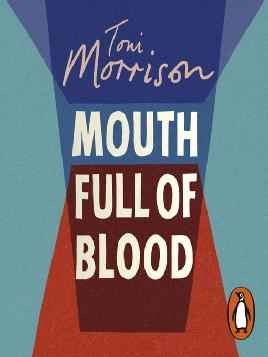
From the book: “A writer's life and work are not a gift to mankind; they are its necessity.”
26. Writing Down the Bones by Natalie Goldberg
No matter what stage you’re at in your writing career, Goldberg’s Writing Down the Bones will help you write more skillfully and creatively. With suggestions, encouragement, and valuable advice on the many aspects of the writing craft, Goldberg doesn’t shy away from making the crucial connection between writing and adding value to your life. Covering a range of topics including taking notes of your initial thoughts, listening, overcoming doubt, choosing where to write, and the selection of your verbs, this guide has plenty to say about the minute details of writing, but excels at exploring the author life.
From the book: “Write what disturbs you, what you fear, what you have not been willing to speak about. Be willing to be split open.”
27. Zen in the Art of Writing by Ray Bradbury
What does it take to become a great author? According to the beloved writer Ray Bradbury , it takes zest, gusto, curiosity, as well as a spirit of adventure. Sharing his wisdom and experiences as one of the most prolific writers in America, Bradbury gives plenty of practical tips and tricks on how to develop ideas, find your voice, and create your own style in this thoughtful volume. In addition to that, this is also an insight into the life and mind of this prolific writer, and a celebration of the act of writing.
From the book: “Every morning I jump out of bed and step on a land mine. The land mine is me. After the explosion, I spend the rest of the day putting the pieces back together. Now, it's your turn. Jump!”
28. The Kite and the String by Alice Mattison
One of the most common dilemmas an author faces is the struggle between spontaneity and control. Literary endeavors need those unexpected light-bulb moments, but a book will never be finished if you rely solely on inspiration. In The Kite and the String , Mattison has heard your cry for help and developed a guide for balancing these elements throughout the different stages of writing a novel or a memoir. Sure, there may be language and grammar rules that govern the way you write, but letting a bit of playfulness breathe life into your writing will see it take off to a whole new level. On the other hand, your writing routine, solitude, audience, and goal-setting will act as the strings that keep you from floating too far away.
From the book: "Don’t make yourself miserable wishing for a kind of success that you wouldn’t enjoy if you had it."
29. How to Become a Successful Indie Author by Craig Martelle
This one’s for all the indie authors out there! Even if you’ve already self-published a book , you can still learn a lot from this guide by Craig Martelle , who has dozens of indie books — “over two and a half million words,” as he puts it — under his belt. With patience and expertise, Martelle walks you through everything you need to know: from developing your premise to perfecting your writing routine, to finally getting your work to the top of the Amazon charts.
From the book: “No matter where you are on your author journey, there’s always a new level you can reach. Roll up your sleeves, because it’s time to get to work.”
Free course: Amazon Algorithms
Send your book to the top of its category by using Amazon's recommendation system to your advantage. Get started now.
30. How to Market a Book by Ricardo Fayet
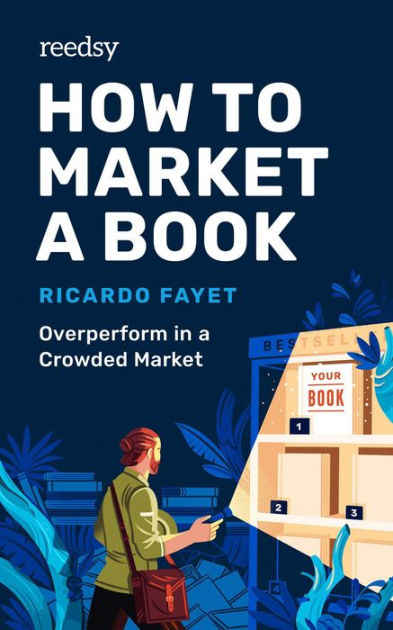
From the book: “Here’s the thing: authors don’t find readers; readers find books . [...] Marketing is not about selling your book to readers. It’s about getting readers to find it.”
31. Everybody Writes by Ann Handley
The full title of Handley’s all-inclusive book on writing is actually Everybody Writes: Your Go-To Guide to Creating Ridiculously Good Content — which should tell you something about its broad appeal. Not only does Handley have some great ideas on how to plan and produce a great story, but she also provides tips on general content writing, which comes in handy when it’s time to build your author platform or a mailing list to promote your book. As such, Everybody Writes is nothing like your other books on novel writing — it’ll make you see writing in a whole new light.
From the book: “In our world, many hold a notion that the ability to write, or write well, is a gift bestowed on a chosen few. That leaves us thinking there are two kinds of people: the writing haves — and the hapless, for whom writing well is a hopeless struggle, like trying to carve marble with a butter knife. But I don’t believe that, and neither should you.”
Free course: Author Mailing Lists
Acquire more readers, sell more books, and make more money with the only indispensable tool in the book marketer's arsenal. Get started now.
Books on writing poetry
32. madness, rack, and honey by mary ruefle.
With a long history of crafting and lecturing about poetry, Ruefle invites the reader of Madness, Rack, and Honey to immerse themselves into its beauty and magic. In a powerful combination of lectures and musings, she expertly explores the mind and craft of writers while excavating the magical potential of poetry. Often a struggle between giving and taking, poetry is, according to Ruefle, a unique art form that reveals the innermost workings of the human heart.
From the book: “In one sense, reading is a great waste of time. In another sense, it is a great extension of time, a way for one person to live a thousand and one lives in a single lifespan, to watch the great impersonal universe at work again and again”
33. Threads by Sandeep Parmar, Nisha Ramayya, and Bhanu Kapil
If you’re looking for something that explores the philosophical aspects of writing, Threads asks big questions about writing and the position of the writer in an industry that has largely excluded marginalized voices. Where does the writer exist in relation to its text and, particularly in the case of poetry, who is the “I”? Examining the common white, British, male lens, this collection of short essays will make it hard for you not to critically consider your own perceptions and how they affect your writing process.
From the book: “It is impossible to consider the lyric without fully interrogating its inherent promise of universality, its coded whiteness.”
34. The Hatred of Poetry by Ben Lerner
Despite its eye-catching title, this short essay is actually a defense of poetry . Lerner begins with his own hatred of the art form, and then moves on to explore this love-hate dichotomy that actually doesn’t seem to be contradictory. Rather, such a multitude of emotions might be one of the reasons that writers and readers alike turn to it. With its ability to evoke feelings and responses through word-play and meter, poetry has often been misconceived as inaccessible and elitist; this is a call to change that perception.
From the book: “All I ask the haters — and I, too, am one — is that they strive to perfect their contempt, even consider bringing it to bear on poems, where it will be deepened, not dispelled, and where, by creating a place for possibility and present absences (like unheard melodies), it might come to resemble love.”
35. Poemcrazy by Susan G. Wooldridge
If you’ve ever felt that the mysterious workings of poetry are out of your reach and expressly not for you, Wooldridge is here to tell you that anyone who wants to can write poetry . An experienced workshop leader, she will help you find your inner voice and to express it through the written word. Giving you advice on how to think, use your senses, and practice your writing, Wooldrige will have you putting down rhyme schemes before you know it.
From the book: “Writing a poem is a form of listening, helping me discover what's wrong or frightening in my world as well as what delights me.”
36. Writing Better Lyrics by Pat Pattison
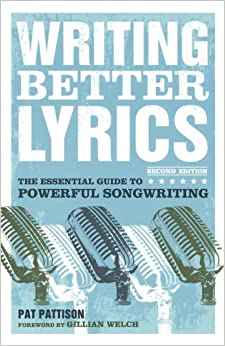
From the book: “Don't be afraid to write crap — it makes the best fertilizer. The more of it you write, the better your chances are of growing something wonderful.”
Books about writing nonfiction
37. on writing well by william zinsser.
Going strong with its 30th-anniversary edition, On Writing Well: The Classic Guide to Writing Nonfiction is an evergreen resource for nonfiction writers which breaks down the fundamental principles of written communication. As a bonus, the insights and guidelines in this book can certainly be applied to most forms of writing, from interviewing to camp-fire storytelling. Beyond giving tips on how to stay consistent in your writing and voice, how to edit, and how to avoid common pitfalls, Zinsser can also help you grow as a professional writer, strengthening your career and taking steps in a new direction.
From the book: “Don’t try to visualize the great mass audience. There is no such audience—every reader is a different person.”
38. Essays by Lydia Davis
Ironically enough, this rather lengthy book is a celebration of brevity. As one of the leading American voices in flash-fiction and short-form writing, Davis traces her literary roots and inspirations in essays on everything, ranging from the mastodonic work of Proust to minimalism. In both her translations and her own writing, she celebrates experimental writing that stretches the boundaries of language. Playing with the contrast between what is said and what is not, this collection of essays is another tool to the writing shed to help you feel and use the power of every word you write.
From the book: “Free yourself of your device, for at least certain hours of the day — or at the very least one hour. Learn to be alone, all alone, without people, and without a device that is turned on. Learn to experience the purity of that kind of concentration. Develop focus, learn to focus intently on one thing, uninterrupted, for a long time.”
39. Essayism by Brian Dillon
In this volume, Dillon explores the often overlooked genre of essay writing and its place in literature’s past, present, and future. He argues that essays are an “experiment in attention” but also highlights how and why certain essays have directly impacted the development of the cultural and political landscape, from the end of the Middle Ages until the present day. At its heart, despite its many forms, subject areas, and purposes, essayism has its root in self-exploration. Dip in and out of Dillon’s short texts to find inspiration for your own nonfiction writing.
From the book: “What exactly do I mean, even, by 'style'? Perhaps it is nothing but an urge, an aspiration, a clumsy access of admiration, a crush.”
40. Naked, Drunk, and Writing by Adair Lara
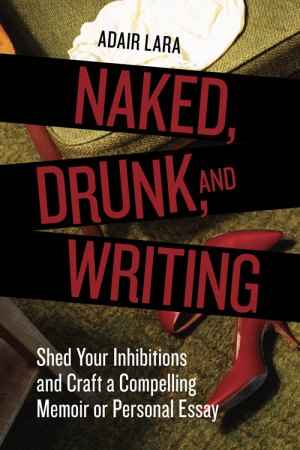
From the book: “Write it down. Whatever it is, write it down. Chip it into marble. Type it into Microsoft Word. Spell it out in seaweeds on the shore. We are each of us an endangered species, delicate as unicorns.”
With a few of these books in your arsenal, you’ll be penning perfect plots in no time! And if you’re interested in learning more about the editing process, check these books on editing out as well!
ZUrlocker says:
11/03/2019 – 19:46
I'm familiar with several of these books. But for new authors, I urge you caution. It is very tempting to read so many books about writing that you never get around to writing. (I did this successfully for many years!) So I will suggest paring it down to just two books: Stephen King on Writing and Blake Snyder Save the Cat. Snyder's book is mostly about screenwriting, so you could also consider Save the Cat Writes a Novel by Jessica Brody. Best of luck!
Comments are currently closed.
Continue reading
Recommended posts from the Reedsy Blog

How Many Sentences Are in a Paragraph?
From fiction to nonfiction works, the length of a paragraph varies depending on its purpose. Here's everything you need to know.

Narrative Structure: Definition, Examples, and Writing Tips
What's the difference between story structure and narrative structure? And how do you choose the right narrative structure for you novel?

What is the Proust Questionnaire? 22 Questions to Write Better Characters
Inspired by Marcel Proust, check out the questionnaire that will help your characters remember things past.

What is Pathos? Definition and Examples in Literature
Pathos is a literary device that uses language to evoke an emotional response, typically to connect readers with the characters in a story.

How to Start a Children’s Book: Coming Up with Your Big Idea
If you've ever dreamed of writing a children's book but aren't sure where to start, check out this post to learn more about how you can create the perfect story for kids.

How to Become a Travel Writer in 5 Steps: A Guide for Travel Bugs
If you want to get paid to share your adventures, learn how to become a travel writer with these five tips.
Join a community of over 1 million authors
Reedsy is more than just a blog. Become a member today to discover how we can help you publish a beautiful book.
We have an app for that
Build a writing routine with our free writing app.

1 million authors trust the professionals on Reedsy. Come meet them.
Enter your email or get started with a social account:
Advertisement
Supported by
editors’ choice
6 New Books We Recommend This Week
Suggested reading from critics and editors at The New York Times.
- Share full article
Our recommended books this week include two satirical novels — one about identity politics and victimization, the other about artificial intelligence and gender roles — along with Tana French’s second crime novel about a Chicago police officer who retired to the Irish countryside. In nonfiction, we recommend the story of a deadly avalanche, a philosopher’s exploration of the concept of giving up, and the gratifyingly intimate audio version of Barbra Streisand’s recent memoir, which she narrates herself. Happy listening, and happy reading. — Gregory Cowles
MY NAME IS BARBRA Barbra Streisand
Certain of the, shall we say, eccentricities (oh … the ellipses!) in Streisand’s 992-page doorstop of a memoir get wonderfully ironed out in audio form. Its sprawling a-star-is-born anecdotes seem to find their natural form in the towering performer’s 48-plus hours of discursive, disarming and often gloriously off-the-cuff narration.

“As Streisand recites the story of her life … she ad-libs off the written text, splices sentences, audibly shakes her head at dubious decisions, and altogether places us opposite her on the sofa with a cup of coffee for a two-day kibitz.”
From Zachary Woolfe’s review
Penguin Audio | 48 hours, 17 minutes
VICTIM Andrew Boryga
Boryga’s debut is a lively social satire about the fetishization of victimhood, following a young working-class student, Javi, who uses exaggerated stories of tragedy to earn attention and success. Boryga is having fun, and he’s inviting us to join in.

“Let’s be clear: Though Boryga is playing, he’s not playing around. Through Javi’s story, Boryga humorously and scathingly calls out the gluttonous consumption of stories of victimhood.”
From Mateo Askaripour’s review
Doubleday | $27
ANNIE BOT Sierra Greer
On the surface, “Annie Bot” is a story about an A.I. sex robot that grows more and more sentient, but underneath this high-tech premise is a sharp and smart exploration of misogyny, toxic masculinity, selfhood and self-determination.

“A brilliant pas de deux, grappling with ideas of freedom and identity while depicting a perverse relationship in painful detail.”
From Lydia Kiesling’s review
Mariner | $28
ON GIVING UP Adam Phillips
In his latest book, Phillips’s exploration of “giving up” covers the vast territory between hope and despair. We can give up smoking, sugar or a bad habit; but we can also give up on ourselves. Phillips proposes curiosity and improvisation as antidotes to absolute certainty.

“Phillips doesn’t try to prevent us from thinking whatever it is that we want to think; what he does is repeatedly coax us to ask if that’s what we really believe, and how we can be sure.”
From Jennifer Szalai’s review
Farrar, Straus & Giroux | $26
THE DARKEST WHITE: A Mountain Legend and the Avalanche That Took Him Eric Blehm
In January 2003, seven skiers and snowboarders were killed in an avalanche on a glacier in western Canada. Among them was the American snowboarder Craig Kelly, and the adventure writer Blehm turns this page-turner not just into a biography of the athlete, but a tribute to the sport itself: addictive, thrilling — sometimes deadly.

“Probably the most unremittingly exciting book of nonfiction I have come across in years. I found myself reading late into recent nights wholly transfixed by every paragraph, every word.”
From Simon Winchester’s review
Harper | $32
THE HUNTER Tana French
For Tana French fans, every one of the thriller writer’s twisty, ingenious books is an event. This one, a sequel to “The Searcher,” once again sees the retired Chicago cop Cal Hooper, a perennial outsider in the Irish west-country hamlet of Ardnakelty, caught up in the crimes — seen and unseen — that eat at the seemingly picturesque village.

“The novel’s greatest pleasures — genuine twists aside — reside in the specific intersection of outsider and native, and particularly the former’s determined need to idealize, to claim, to tint whole rivers green.”
From Sadie Stein’s review
Viking | $32
Explore More in Books
Want to know about the best books to read and the latest news start here..
What can fiction tell us about the apocalypse? The writer Ayana Mathis finds unexpected hope in novels of crisis by Ling Ma, Jenny Offill and Jesmyn Ward .
At 28, the poet Tayi Tibble has been hailed as the funny, fresh and immensely skilled voice of a generation in Māori writing .
Amid a surge in book bans, the most challenged books in the United States in 2023 continued to focus on the experiences of L.G.B.T.Q. people or explore themes of race.
Stephen King, who has dominated horror fiction for decades , published his first novel, “Carrie,” in 1974. Margaret Atwood explains the book’s enduring appeal .
Do you want to be a better reader? Here’s some helpful advice to show you how to get the most out of your literary endeavor .
Each week, top authors and critics join the Book Review’s podcast to talk about the latest news in the literary world. Listen here .
- Craft and Criticism
- Fiction and Poetry
- News and Culture
- Lit Hub Radio
- Reading Lists

- Literary Criticism
- Craft and Advice
- In Conversation
- On Translation
- Short Story
- From the Novel
- Bookstores and Libraries
- Film and TV
- Art and Photography
- Freeman’s
- The Virtual Book Channel
- Behind the Mic
- Beyond the Page
- The Cosmic Library
- The Critic and Her Publics
- Emergence Magazine
- Fiction/Non/Fiction
- First Draft: A Dialogue on Writing
- Future Fables
- The History of Literature
- I’m a Writer But
- Just the Right Book
- Lit Century
- The Literary Life with Mitchell Kaplan
- New Books Network
- Tor Presents: Voyage Into Genre
- Windham-Campbell Prizes Podcast
- Write-minded
- The Best of the Decade
- Best Reviewed Books
- BookMarks Daily Giveaway
- The Daily Thrill
- CrimeReads Daily Giveaway
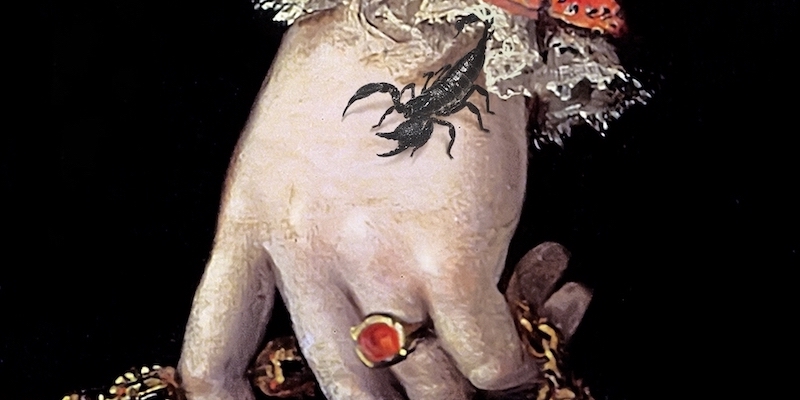
What Should You Read Next? Here Are the Best Reviewed Books of the Week
Featuring new titles by leigh bardugo, alexandra fuller, anne lamott, and more.

Leigh Bardugo’s The Familiar , Alexandra Fuller’s Fi , and Anne Lamott’s Somehow all feature among the Best Reviewed Books of the Week.
Brought to you by Book Marks , Lit Hub’s home for book reviews.
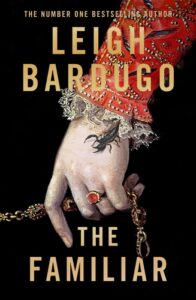
1. The Familiar by Leigh Bardugo (Flatiron)
“Bardugo brilliantly explores the wavy line between the supernatural and the divine … When Bardugo chooses to venture further into the darkness, it’s that much more devastating because of how much fun the reader has been having. In fact, she is a master of anticlimax: She builds apprehension for huge events that do not come to pass, then blindsides the reader with something totally unexpected instead … A thrilling addition to her canon about oppression and liberation, and anyone interested in this historical period and the themes she’s exploring will find it engrossing.”
–Charlie Jane Anders ( The Washington Post )
2. The Sleepwalkers by Scarlett Thomas (Simon & Schuster)
6 Rave • 1 Positive
“For Thomas, nothing seems to be off the table. She shifts between erotic thrills, gothic drama, postmodern deconstruction and kitchen-sink realism. Through her bold storytelling, The Sleepwalkers becomes a work of peculiar, gonzo genius … Thomas takes a glamorous late-capitalist setting, with rosé and catamarans, and shreds, twists and warps it into a story that is surprising, humane and political to its bones.”
–Flynn Berry ( The New York Times Book Review )
3. The Limits by Nell Freudenberger (Knopf)
2 Rave • 5 Positive Read an excerpt from The Limits here
“Freudenberger is fluent in every realm, social conundrum, and crime against the earth she brings into focus, keenly attuned to science and emotion, tradition and high-tech, race and gender, greed and conscience, irony and tragedy. Each character’s challenges are significant on scales intimate and global and their wrestling with secrets, anger, and fear grows increasingly suspenseful in this lambent, deeply sympathetic, and thought-provoking novel.”
–Donna Seaman ( Booklist )
1. Fi: A Memoir of My Son by Alexandra Fuller (Grove Press)
“Fuller leaves nothing under the table, under the rug or under wraps … The last thing you expect to do when you read a book about a child dying is to laugh … The wit in this memoir is soul-piercing … Fuller is sagacious and perspicacious. She is a sublime writer. In the hands of another memoirist, the story of Fi might be unbearably sad, but this book is a mesmeric celebration of a boy who died too soon, a mother’s love and her resilience. It will help others surviving loss—surviving life.”
–David Sheff ( The New York Times Book Review )
=2. The Wives: A Memoir by Simone Gorrindo (Gallery/Scout Press)
3 Rave • 2 Positive
“Gorrindo’s memoir is a gorgeously rendered peek behind the curtain of military life, as she recounts reckoning with her husband’s participation in violence—and examining why his job exists at all.”
–Courtney Eathorne ( Booklist )
=2. Somehow: Thoughts on Love by Anne Lamott (Riverhead)
3 Rave • 2 Positive Read an essay by Anne Lamott here
“In her trademark godly yet snarky way, she extracts every life lesson from her latest new experience with the deft zeal of a chef reducing flour and fat to roux … At times, Somehow made me huffy about—by which I mean envious of—Lamott’s gift for writing powerfully, deeply, often radically, while appealing to, well, everyone … No matter one’s external descriptors, Lamott speaks to the human in all of us, challenging us to bear her beam of love, and our own.”
–Meredith Maran ( The Washington Post )
- Share on Facebook (Opens in new window)
- Click to share on Twitter (Opens in new window)
- Click to share on Google+ (Opens in new window)
- Click to share on LinkedIn (Opens in new window)
- Click to share on Reddit (Opens in new window)
- Click to share on Tumblr (Opens in new window)
- Click to share on Pinterest (Opens in new window)
- Click to share on Pocket (Opens in new window)

Previous Article
Next article, support lit hub..

Join our community of readers.
to the Lithub Daily
Popular posts.

Follow us on Twitter
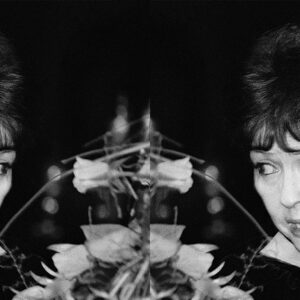
Lit Hub Daily: April 12, 2024
- RSS - Posts
Literary Hub
Created by Grove Atlantic and Electric Literature
Sign Up For Our Newsletters
How to Pitch Lit Hub
Advertisers: Contact Us
Privacy Policy
Support Lit Hub - Become A Member
Become a Lit Hub Supporting Member : Because Books Matter
For the past decade, Literary Hub has brought you the best of the book world for free—no paywall. But our future relies on you. In return for a donation, you’ll get an ad-free reading experience , exclusive editors’ picks, book giveaways, and our coveted Joan Didion Lit Hub tote bag . Most importantly, you’ll keep independent book coverage alive and thriving on the internet.

Become a member for as low as $5/month
10 books to add to your reading list in April

- Show more sharing options
- Copy Link URL Copied!
Critic Bethanne Patrick recommends 10 promising titles, fiction and nonfiction, to consider for your April reading list.
April’s book releases cover some difficult topics, including Salman Rushdie discussing his 2022 maiming, Leigh Bardugo’s fiction about the dark arts and Ada Limón’s poetry anthology about our fragile world. However, like April, there is also sunshine: Leif Enger’s wild Great Lakes love story, Helen Tworkov’s beautiful memoir of Buddhism and a collection of the inimitable Maggie Nelson’s essays. Happy reading, happy spring!
I Cheerfully Refuse: A Novel By Leif Enger Grove Press: 336 pages, $28 (April 2)
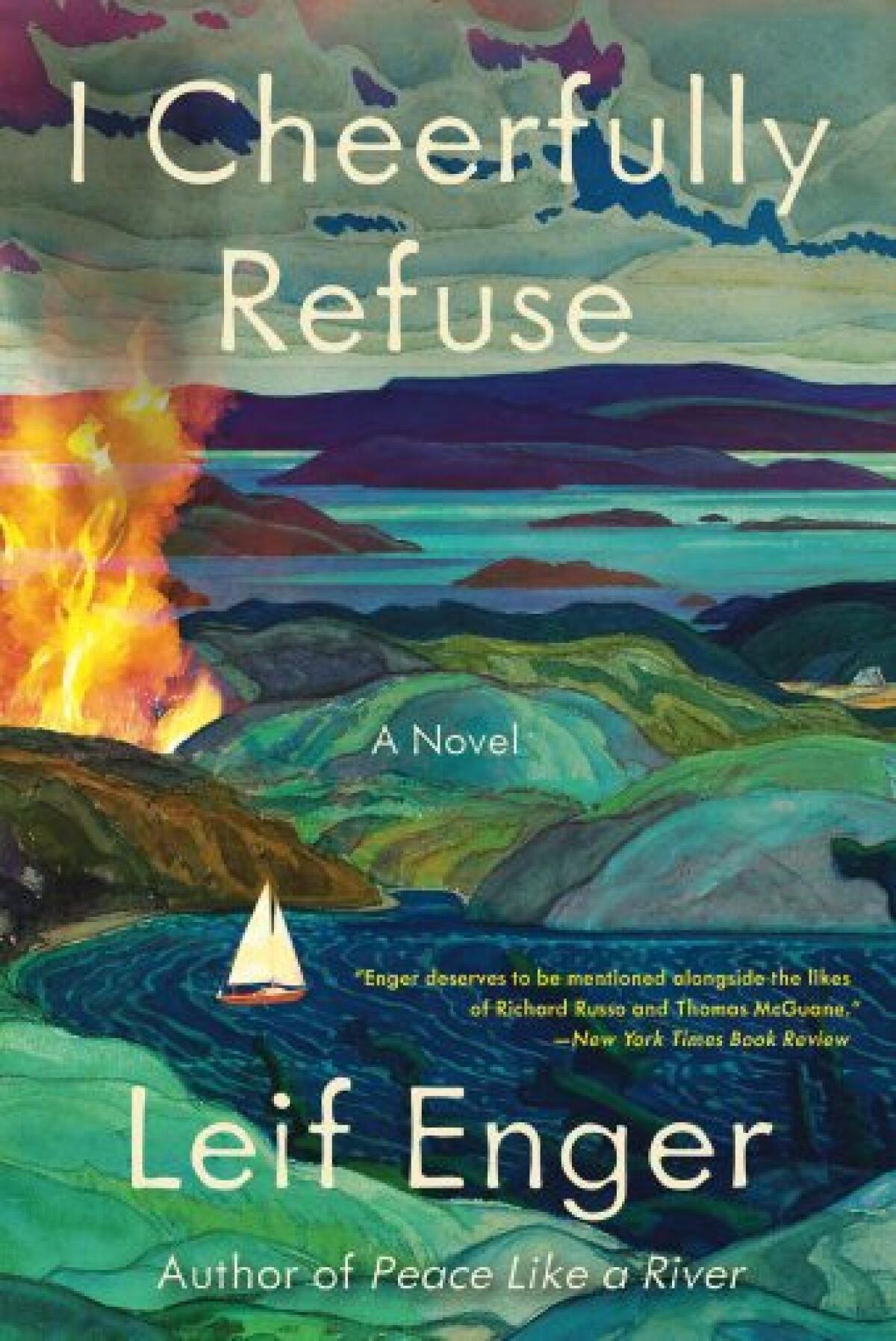
An unusual and meaningful surprise awaits readers of Enger’s latest, which takes place largely on Lake Superior, as a man named Rainy tries to reunite with his beloved wife, Lark. While the world around this couple, a dystopian near-future American where billionaires control everything, could not be bleaker, the author’s retelling of the myth of Orpheus (who went to the underworld to rescue his wife) contains the authentic hope of a born optimist.
The Familiar: A Novel By Leigh Bardugo Flatiron Books: 400 pages, $30 (April 9)
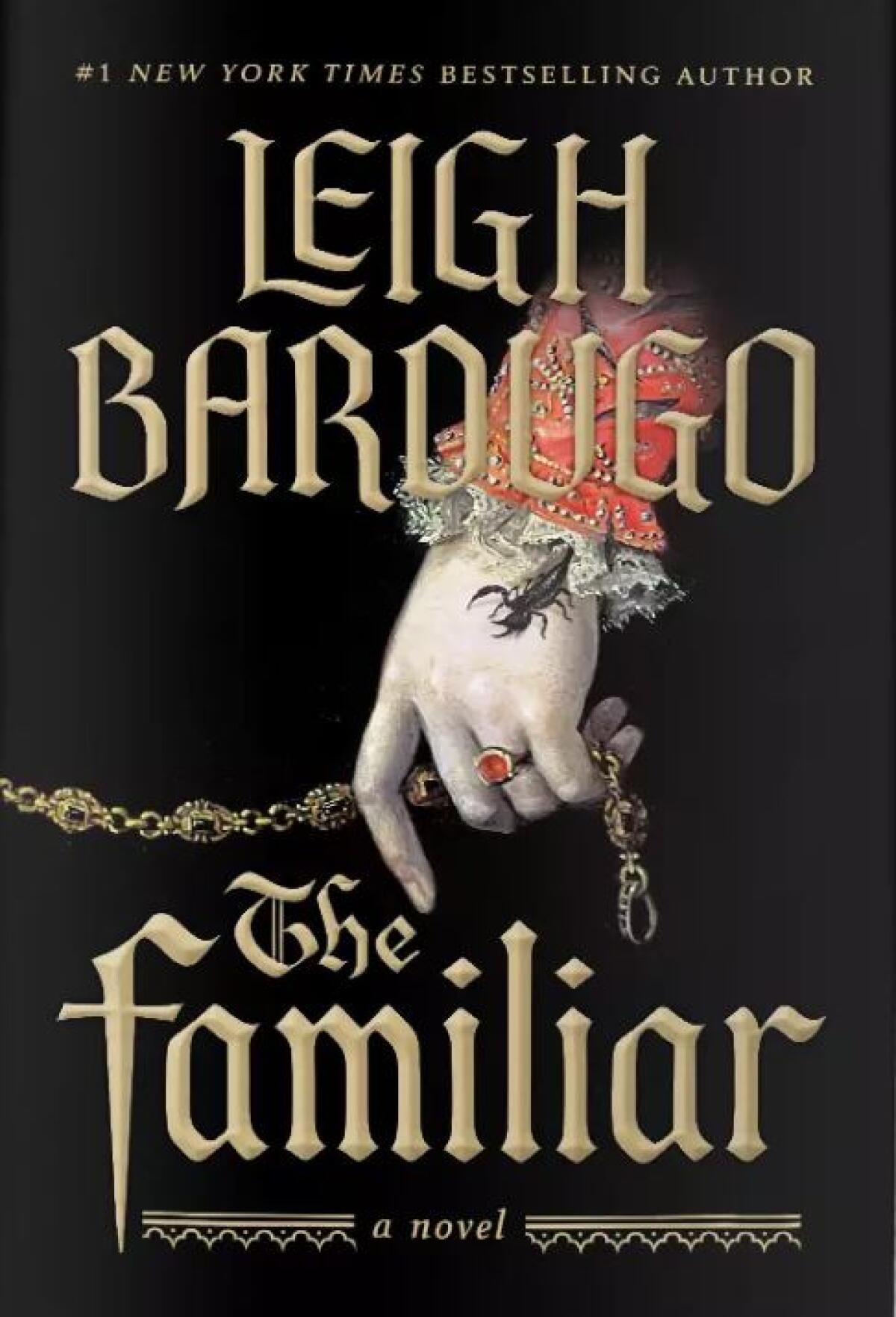
Bardugo departs from novels of dark academia in a standalone to make the hairs on your neck stand up, set in 16th century Spain. A hidden Sephardic Jew and scullery maid named Luzia Cotado matches wits with fellow servant Guillén Santángel. Luzia discovers a secret of Guillén’s, but she’s already fallen in love with him. And because he knows hers, too, they might both avoid the Spanish Inquisition. It’s a gorgeous tale of enchantments both supernatural and earthly.
The Sleepwalkers: A Novel By Scarlett Thomas Simon & Schuster: 304 pages, $28 (April 9)
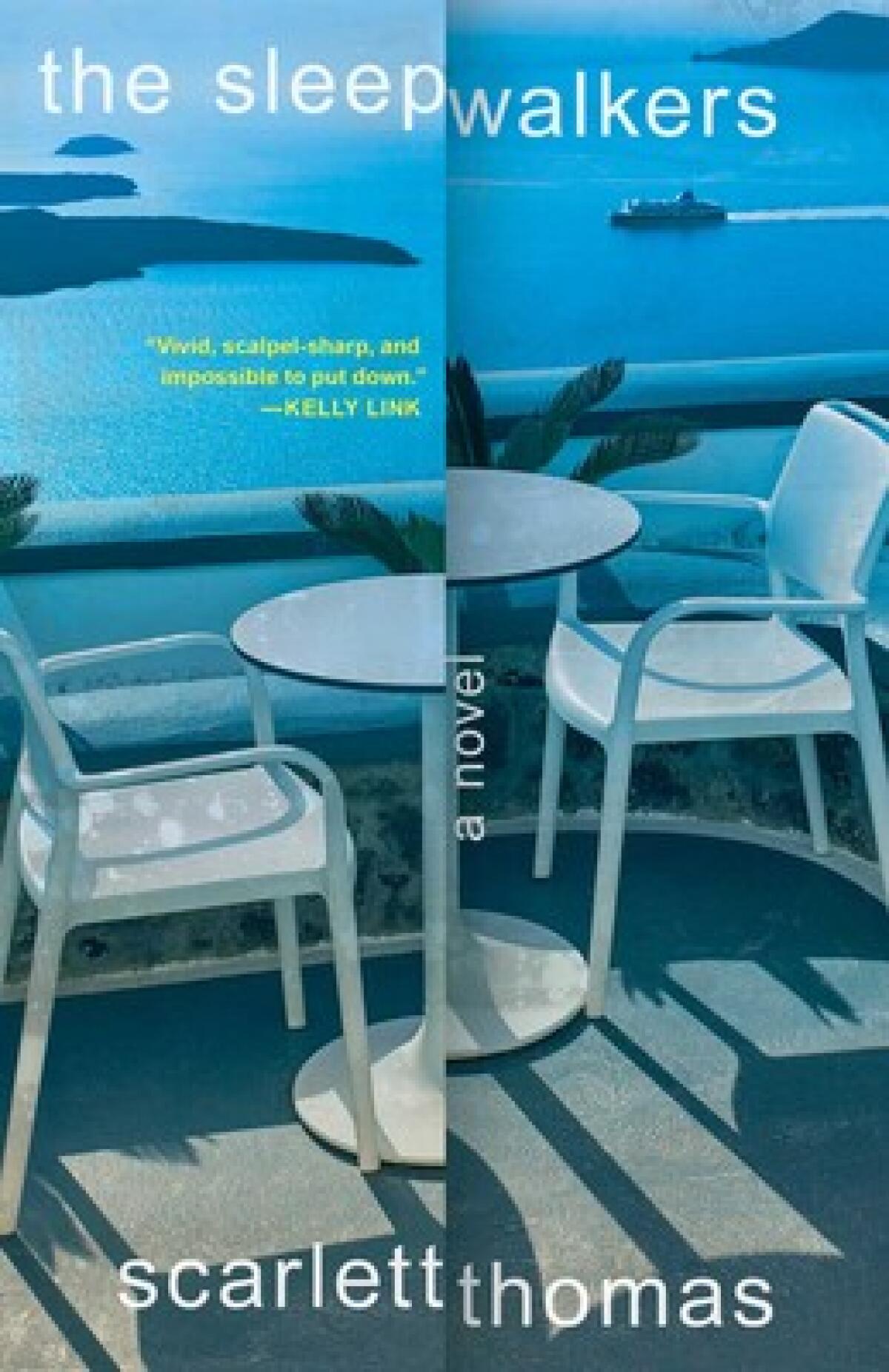
A couple honeymoons at a Greek resort. What could go wrong? In Thomas’ hands, plenty – especially as the author has never written a comfortable story; her books, from “PopCo ” to “Oligarchy,” crackle with unreliable characters, as well as big philosophical ideas. In this case, the new marriage’s breakdown is chronicled through letters between the spouses, and sometimes bits of ephemera, that ultimately untangle a dark mystery relating to the title.
The Garden: A Novel By Clare Beams Doubleday: 304 pages, $28 (April 10)
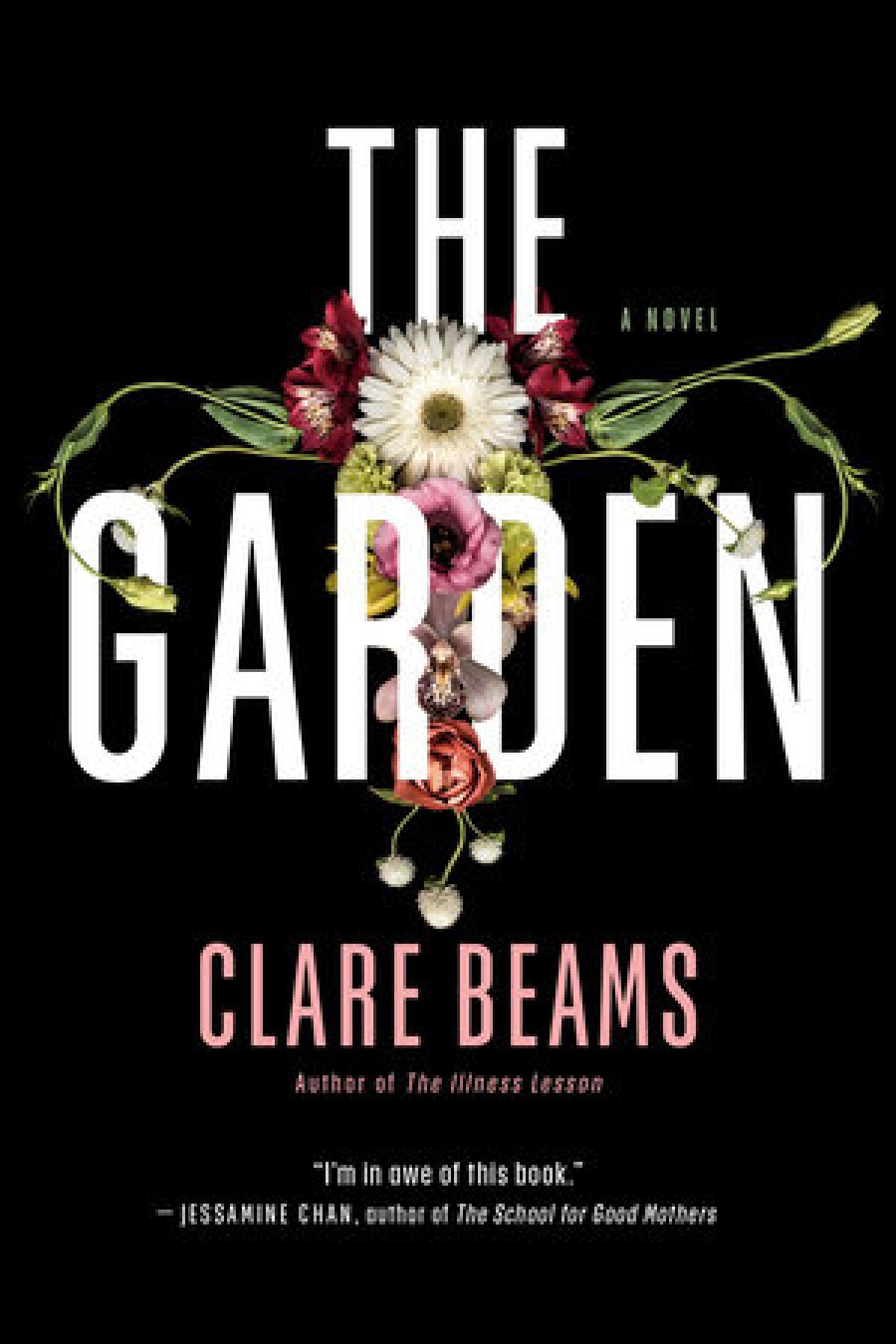
Few novels of literary fiction are written as well as “The Garden,” let alone given its sadly relevant retro setting, a 1940s country-estate obstetrical program. Irene Willard walks through its gates having endured five miscarriages; pregnant again, she and her war-veteran husband George desperately hope for a live birth. But as Irene discovers more about the woman who controls all here, Dr. Bishop, she fears carrying to term as much as she once feared pregnancy loss.
Reboot: A Novel By Justin Taylor Pantheon: 304 pages, $28 (April 23)
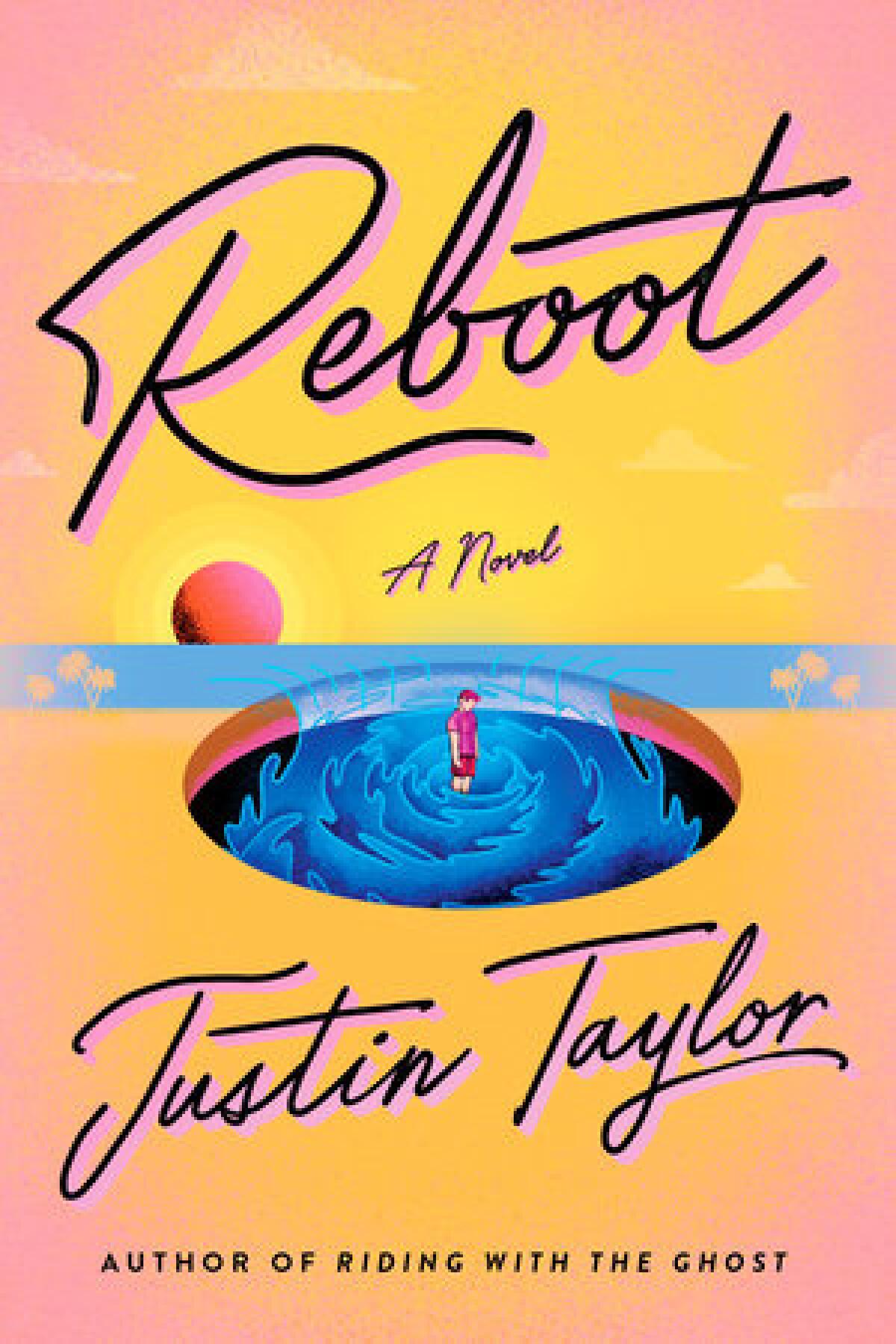
David Crader, former teen TV heartthrob, just wants to reboot his career when his old show “Rev Beach” has a moment. His life has devolved through substance abuse, divorce and underemployment. But when he and colleagues launch a remake, devolution continues: The protagonist’s struggles are mirrored by climate-change issues, from flooding to wildfires. Despite that darkness, Taylor’s gift for satire might make this a must-read for 2024 beach bags.
You Are Here: Poetry in the Natural World By Ada Limón (Editor) Milkweed Editions: 176 pages, $25 (April 2)
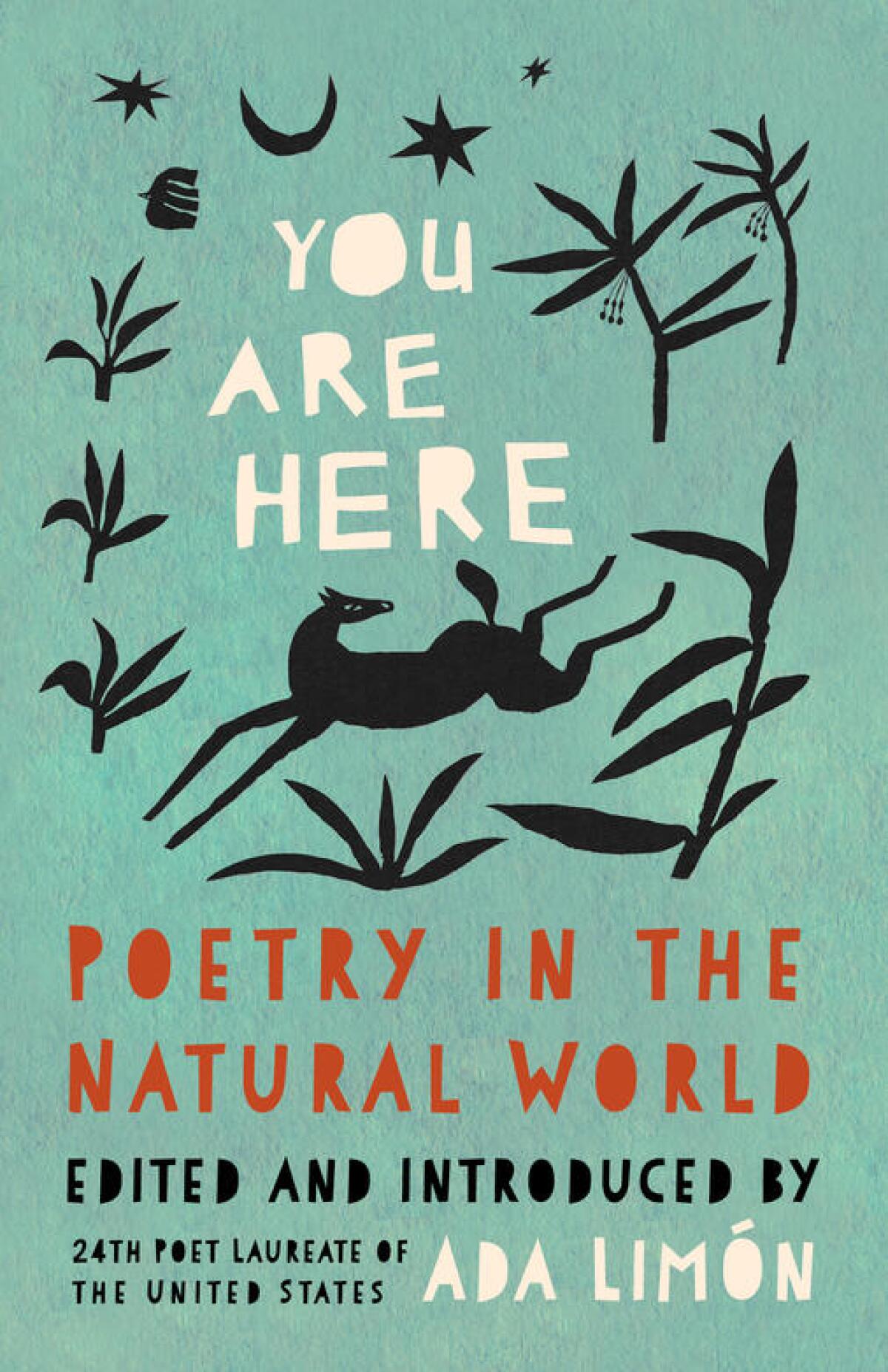
A wondrous artist herself, Limón is currently poet laureate of the United States, and this anthology is part of her signature project, “You Are Here,” which will also feature poetry as public art in seven national parks. Released in conjunction with the Library of Congress, the collection features 50 previously unpublished poems by luminaries including Jericho Brown, Joy Harjo, Carl Phillips and Diane Seuss, each focusing on a piece of regional landscape.
Like Love: Essays and Conversations By Maggie Nelson Graywolf Press: 336 pages, $32 (April 2)
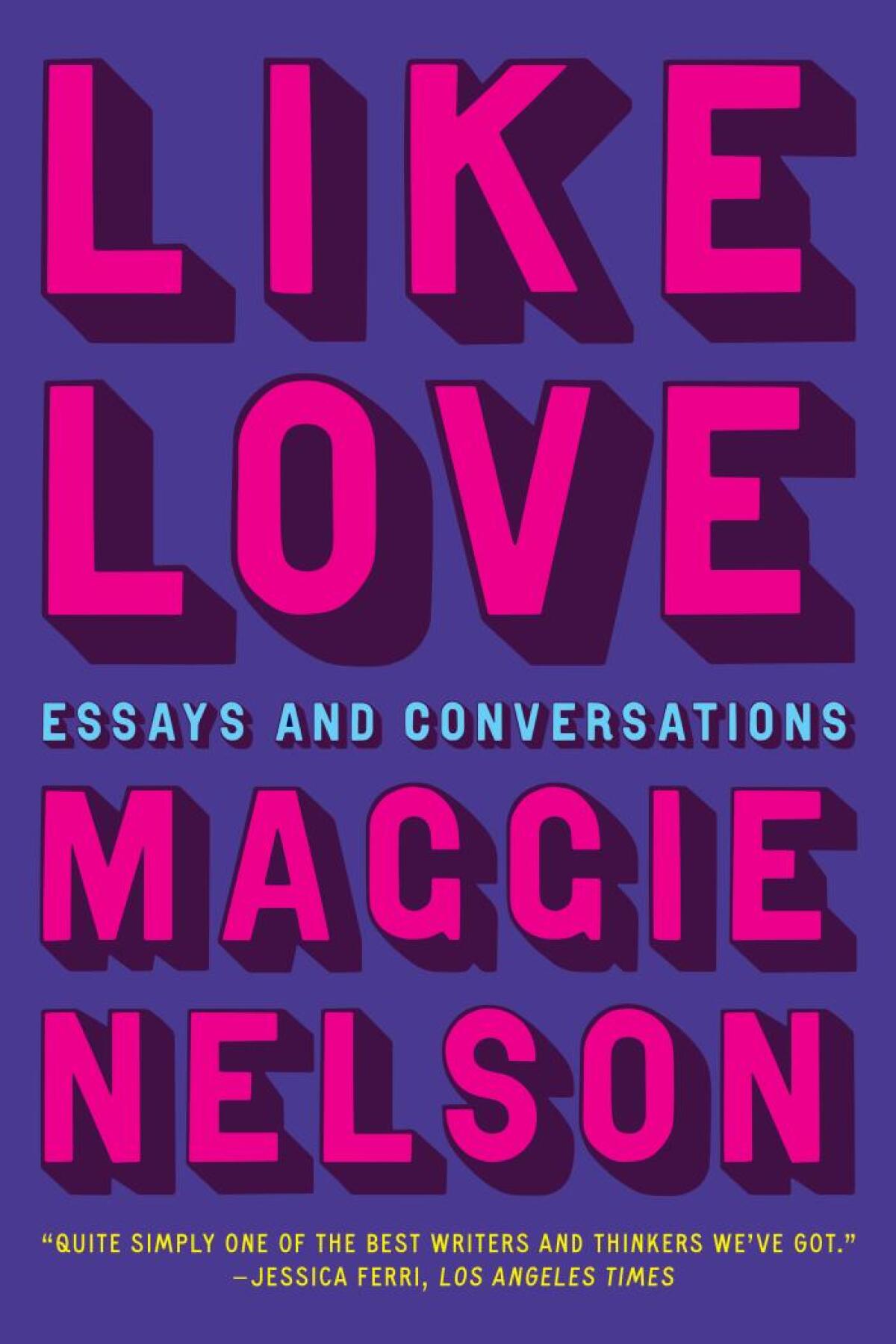
While all of the pieces in Nelson’s new book have previously been published elsewhere, they’re made fresh here both through being collected and through their chronological placement. Readers can practically watch Nelson’s incisive mind growing and changing as she speaks with colleagues such as Hilton Als and Judith Butler, or as she writes about queerness, motherhood, violence, the lyrics of Prince and the devastating loss of a friend.
Knife: Meditations After an Attempted Murder By Salman Rushdie Random House: 204 pages, $28 (April 16)
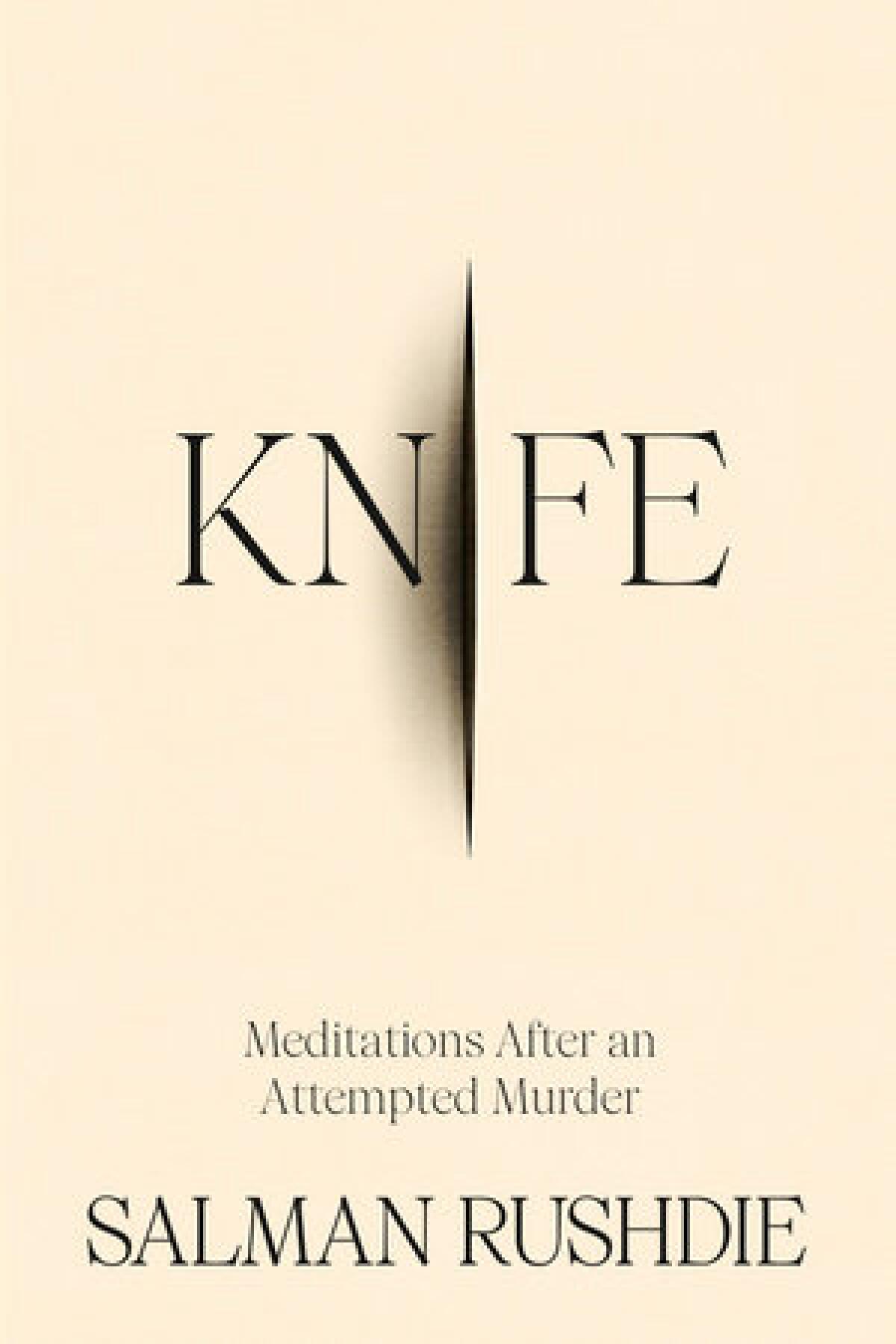
On Aug. 12, 2022, the author Salman Rushdie was speaking at upstate New York’s Chautauqua festival when a man rushed the stage and attempted to murder him. Rushdie, a target of Iranian religious leaders since 1989, was permanently injured. In this book, he shares his experience for the first time, having said that this was essential for him to write. In this way, he answers violence with art, once again reminding us all that freedom of expression must be protected.
Lotus Girl: My Life at the Crossroads of Buddhism and America By Helen Tworkov St. Martin’s Essentials: 336 pages, $29 (April 16)
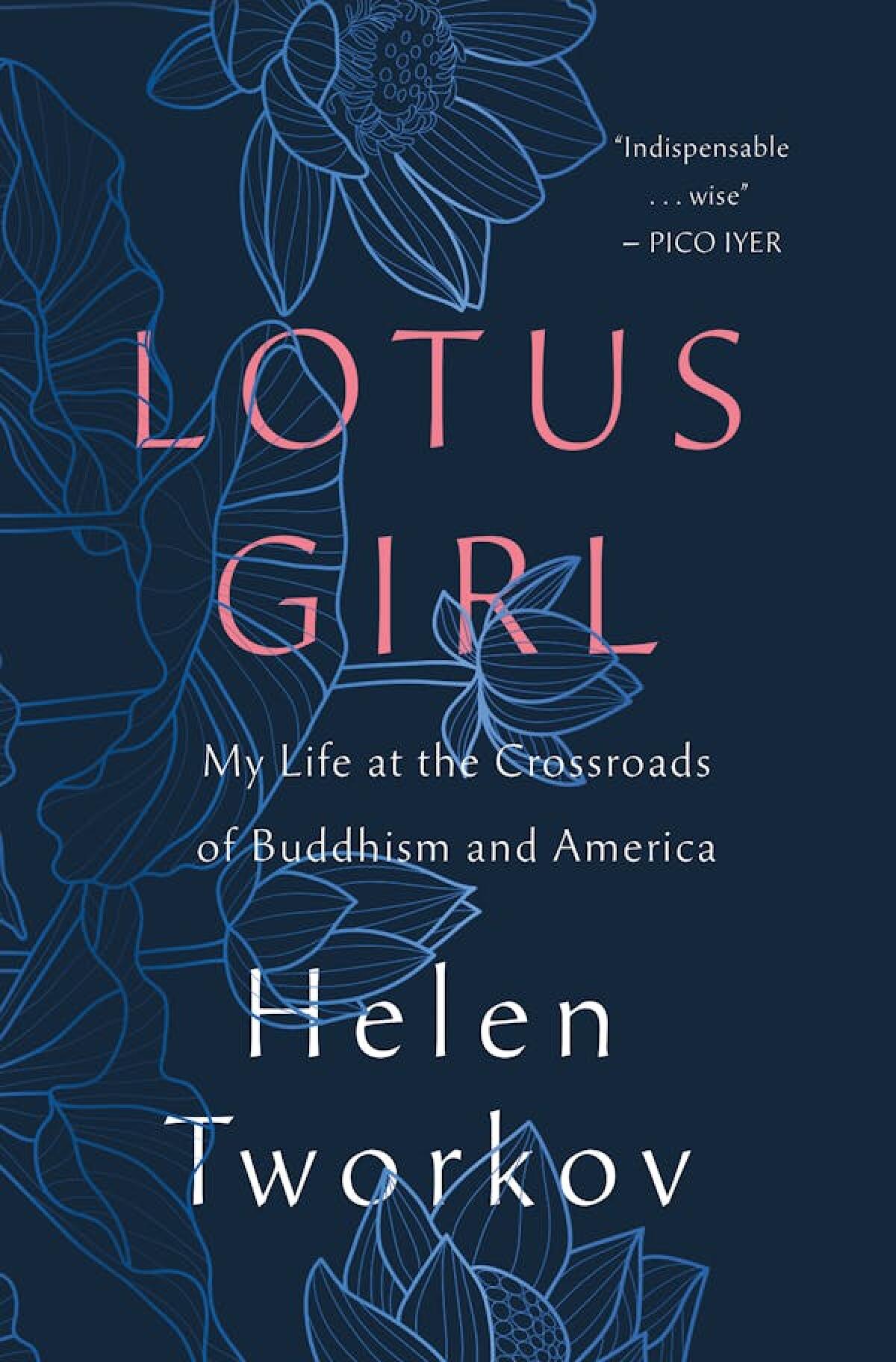
Tworkov, founder of the magazine Tricycle, chronicles her move from a 1960s young-adult interest in Buddhism to travels through Asia and deep study in the United States of the different strands that follow the Buddha’s teachings. Tworkov mentions luminaries such as the artist Richard Serra, the composer Charles Mingus and the Dalai Lama, but she’s not name-dropping. Instead, she’s strewing fragrant petals from her singular path to mindfulness that may help us find ours.
The Demon of Unrest: A Saga of Hubris, Heartbreak, and Heroism at the Dawn of the Civil War By Erik Larson Crown: 592 pages, $35 (April 30)
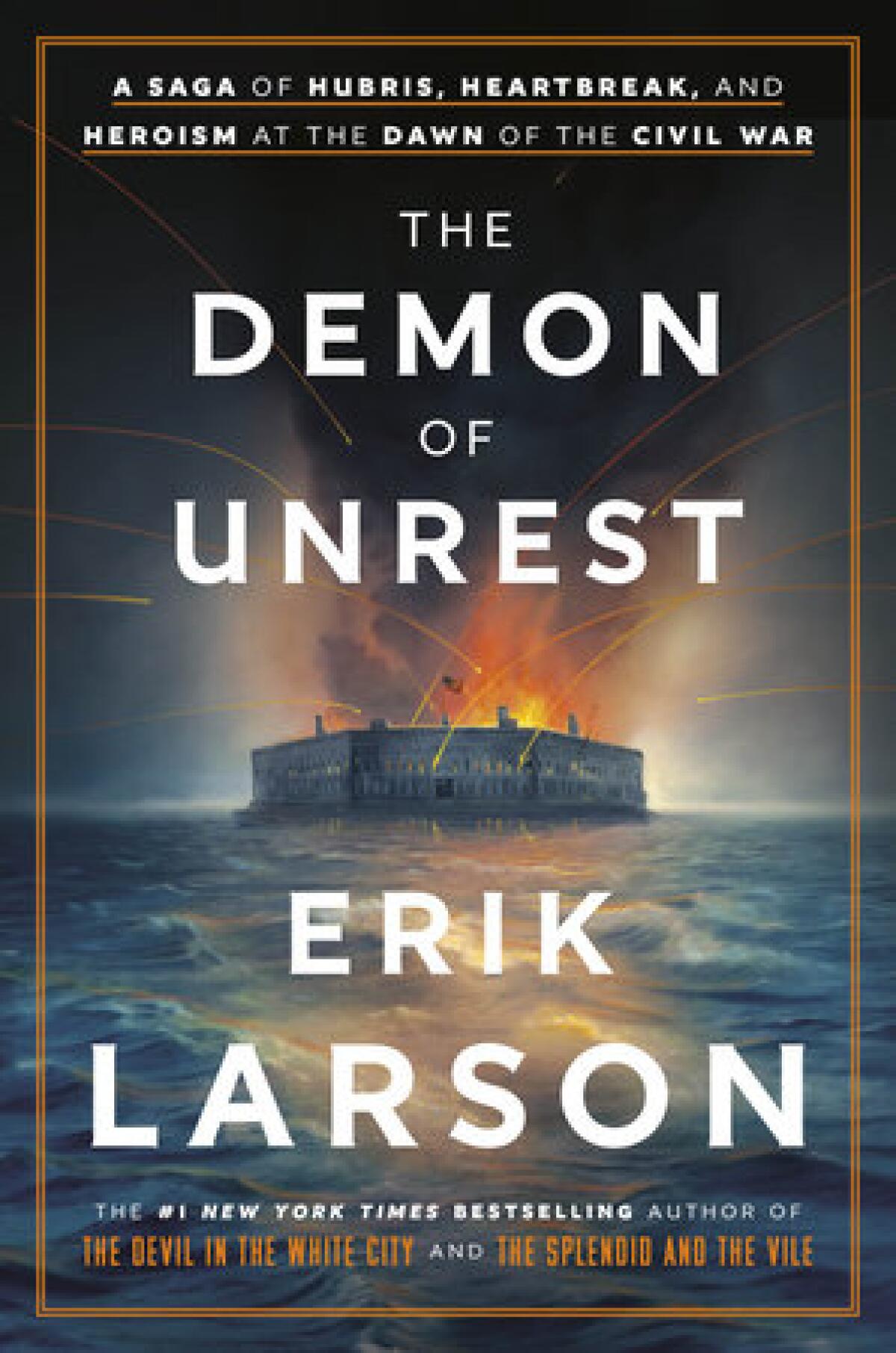
Even diehard Civil War aficionados will learn from Larson’s look at the six months between Lincoln’s 1860 election and the surrender of Union troops under Maj. Robert Anderson at Charleston’s Ft. Sumter. Larson details Anderson’s secret Christmas redeployment and explores this individual’s contradictions as a former slave owner who loyally follows Lincoln’s orders. The author also shares first-person perspective from the famous diaries of the upper-class Southerner Mary Chesnut. All together, the book provides a riveting reexamination of a nation in tumult.
More to Read

The week’s bestselling books, April 14
April 10, 2024
The week’s bestselling books, April 7
April 3, 2024

3 best mystery books to read this spring
A cure for the common opinion
Get thought-provoking perspectives with our weekly newsletter.
You may occasionally receive promotional content from the Los Angeles Times.
More From the Los Angeles Times
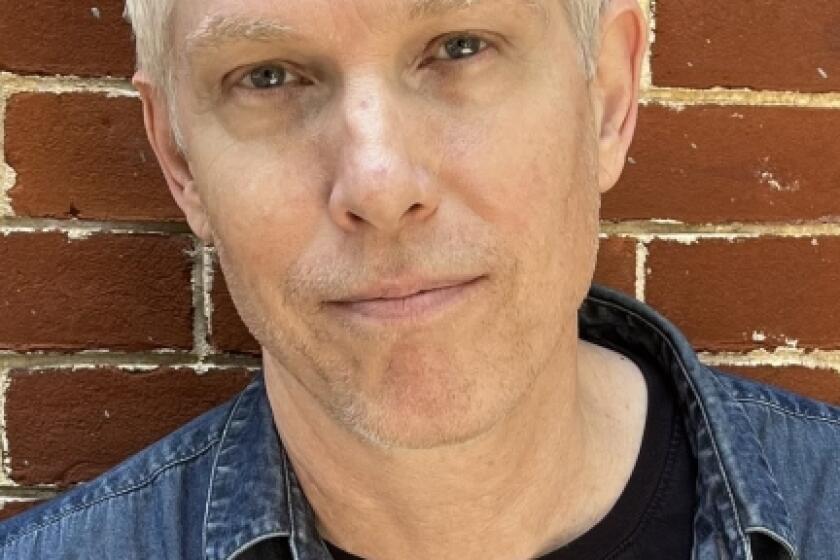
Reckoning with long shadow of 1960s counterculture
April 13, 2024
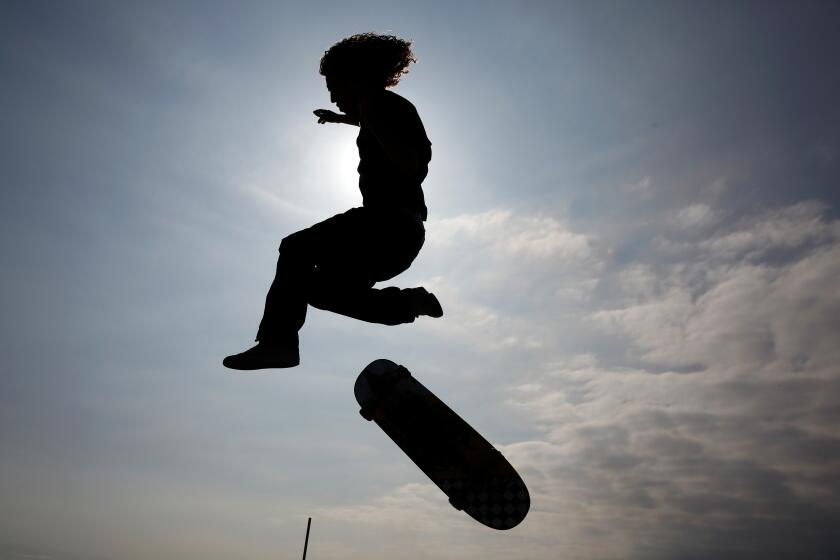
From Pomona to Oakland, how a skater mapped California block by block from his board
April 12, 2024

Lionel Shriver airs grievances by reimagining American society
April 8, 2024
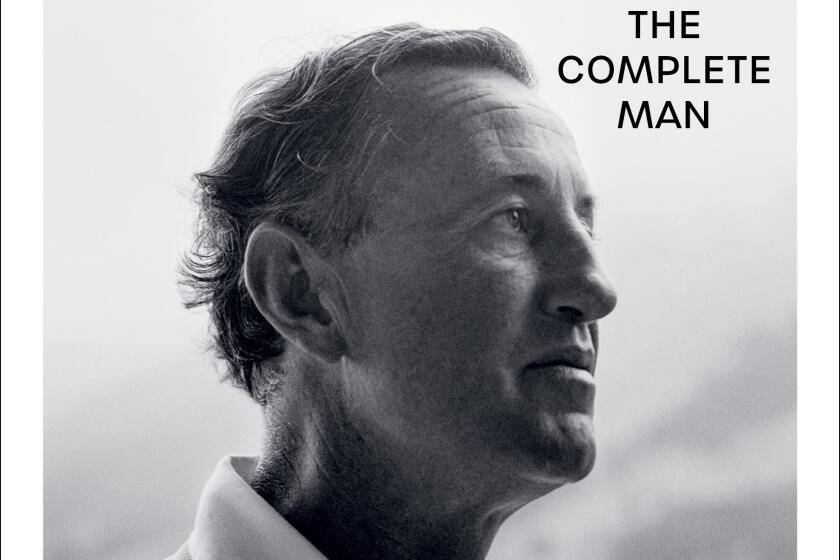
James Bond’s creator lived a life to rival the spy’s
April 4, 2024
Advertisement
More from the Review
Subscribe to our Newsletter
Best of The New York Review, plus books, events, and other items of interest
- The New York Review of Books: recent articles and content from nybooks.com
- The Reader's Catalog and NYR Shop: gifts for readers and NYR merchandise offers
- New York Review Books: news and offers about the books we publish
- I consent to having NYR add my email to their mailing list.
- Hidden Form Source
April 18, 2024
Current Issue

March 21, 2024 issue
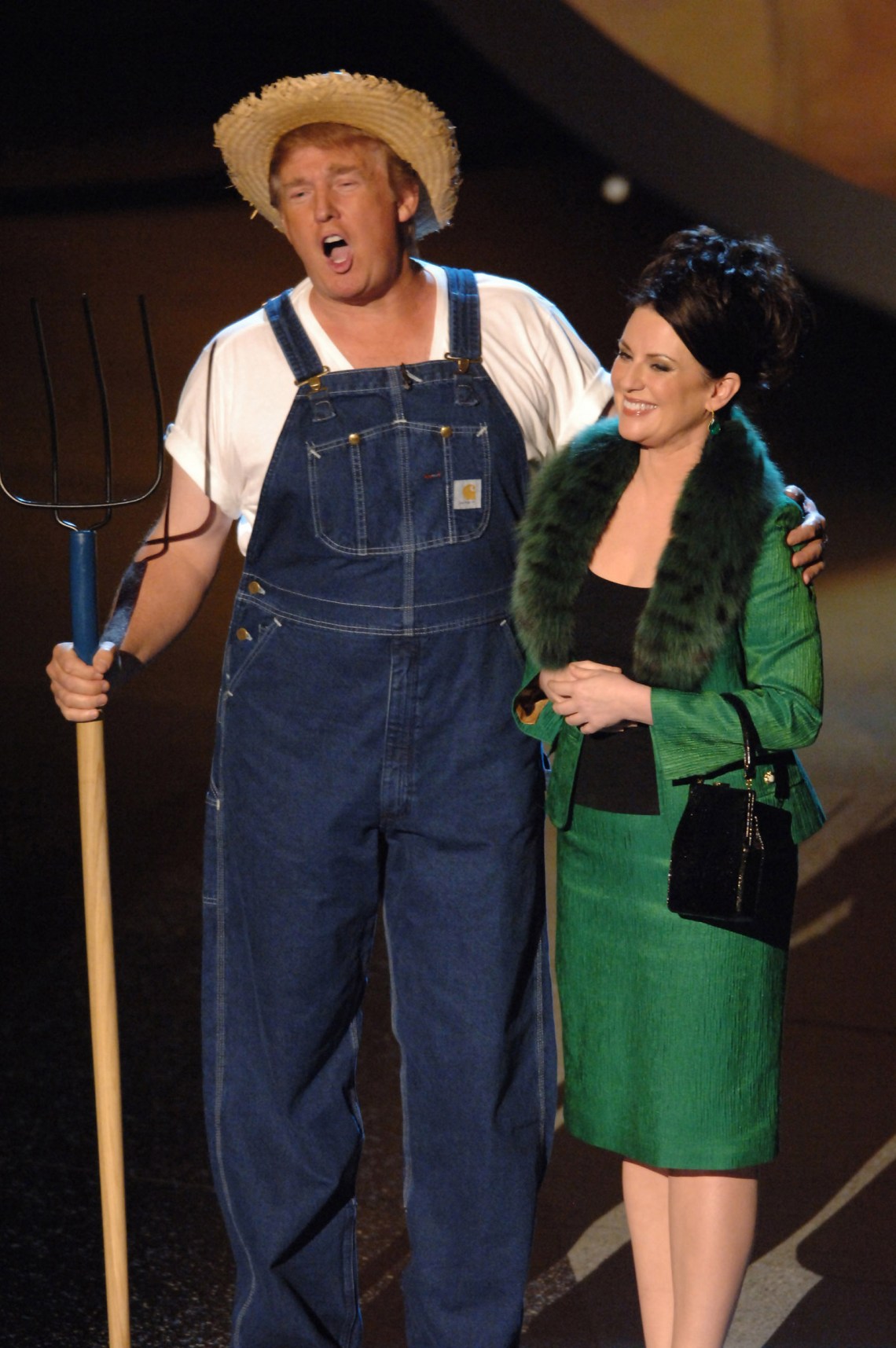
Michael Caulfield/WireImage/Getty Images
Donald Trump and Megan Mullally performing the Green Acres theme song at the Emmy Awards, Los Angeles, September 2005
Submit a letter:
Email us [email protected]
In the Warsaw Ghetto in October 1941 Mary Berg, then a teenager, wrote in her diary about the improbable persistence of laughter in that hellish place:
Every day at the Art Café on Leszno Street one can hear songs and satires on the police, the ambulance service, the rickshaws, and even the Gestapo, in a veiled fashion. The typhus epidemic itself is the subject of jokes. It is laughter through tears, but it is laughter. This is our only weapon in the ghetto—our people laugh at death and at the Nazi decrees. Humor is the only thing the Nazis cannot understand.
Berg here movingly expresses a common and comforting idea. Laughter is one of the few weapons that the weak have against the strong. Gallows humor is the one thing that cannot be taken away from those who are about to be hanged, the final death-defying assertion of human dignity and freedom. And the hangmen don’t get the jokes. Fascists don’t understand humor.
There is great consolation in these thoughts. Yet is it really true that fascists don’t get humor? Racist, misogynistic, antisemitic, xenophobic, antidisabled, and antiqueer jokes have always been used to dehumanize those who are being victimized. The ghetto humor that Berg recorded was a way of keeping self-pity at bay. But as Sigmund Freud pointed out, jokes can also be a way of shutting down pity itself by identifying those who are being laughed at as the ones not worthy of it: “A saving in pity is one of the most frequent sources of humorous pleasure.” Humor, as in Berg’s description, may be a way of telling us not to feel sorry for ourselves. But it is more often a way of telling us not to feel sorry for others. It creates an economy of compassion, limiting it to those who are laughing and excluding those who are being laughed at. It makes the polarization of humanity fun.
Around the time that Berg was writing her diary, Theodor Adorno and Max Horkheimer were pointing to the relationship between Nazi rallies and this kind of comedy. The rally, they suggested, was an arena in which a release that was otherwise forbidden was officially permitted:
The anti-Semites gather to celebrate the moment when authority lifts the ban; that moment alone makes them a collective, constituting the community of kindred spirits. Their ranting is organized laughter. The more dreadful the accusations and threats, the greater the fury, the more withering is the scorn. Rage, mockery, and poisoned imitation are fundamentally the same thing.
Donald Trump is not a Nazi, and his followers are (mostly) not fascists. But it is not hard to see how this description resonates with his campaign appearances. Trump is America’s biggest comedian. His badinage is hardly Wildean, but his put-downs, honed to the sharpness of stilettos, are many people’s idea of fun. For them, he makes anger, fear, and resentment entertaining.
For anyone who questions how much talent and charisma this requires, there is a simple answer: Ron DeSantis. Why did DeSantis’s attempt to appeal to Republican voters as a straitlaced version of Trump fall so flat? Because Trumpism without the cruel laughter is nothing. It needs its creator’s fusion of rage, mockery, and poisoned imitation, whether of a reporter with a disability or (in a dumb show that Trump has been playing out in his speeches in recent months) of Joe Biden apparently unable to find his way off a stage. It demands the withering scorn for Sleepy Joe and Crooked Hillary, Crazy Liz and Ron DeSanctimonious, Cryin’ Chuck and Phoney Fani. It requires the lifting of taboos to create a community of kindred spirits. It depends on Trump’s ability to be pitiless in his ridicule of the targets of his contempt while allowing his audience to feel deeply sorry for itself. (If tragedy, as Aristotle claimed, involves terror and pity, Trump’s tragicomedy deals in terror and self-pity.)
Hard as it is to understand, especially for those of us who are too terrified to be amused, Trump’s ranting is organized laughter. To understand his continuing hold over his fans, we have to ask: Why is he funny?
This is not the 1930s or the 1940s, and we should not expect this toxic laughter to be organized quite as it was then. Trump functions in a culture supersaturated with knowingness and irony. In twentieth-century European fascism, the relationship between words and actions was clear: the end point of mockery was annihilation. Now, the joke is “only a joke.” Populist politics exploits the doubleness of comedy—the way that “only a joke” can so easily become “no joke”—to create a relationship of active connivance between the leader and his followers in which everything is permissible because nothing is serious.
This shift has happened in Europe, too. Think of Boris Johnson’s clown act, his deliberately ruffled hair, rumpled clothes, and ludicrous language. Or think of Giorgia Meloni, the first Italian prime minister from the far right since Benito Mussolini, posting on election day in September 2022 a TikTok video of herself holding two large melons ( meloni in Italian) in front of her breasts: fascism as adolescent snigger. It is impossible to think of previous far-right leaders engaging in such public self-mockery. Only in our time is it possible for a politician to create a sense of cultlike authority by using the collusiveness of comedy, the idea that the leader and his followers are united by being in on the joke.
Trump may be a narcissist, but he has a long history of this kind of self-caricature. When he did the Top Ten List on the David Letterman show in 2009, he seemed entirely comfortable delivering with a knowing smirk the top ten “financial tips” written for him, including “When nobody’s watching I go into a 7/11 and stick my head under a soda nozzle”; “Save money by styling your own hair” (pointing to his own improbable coiffure); “Sell North Dakota to the Chinese”; “If all else fails, steal someone’s identity”; and “The fastest way to get rich: marry and divorce me.” This performance, moreover, was the occasion for Trump’s entry into the world of social media. His first ever tweet was: “Be sure to tune in and watch Donald Trump on Late Night with David Letterman as he presents the Top Ten List tonight!”
At the 2005 Emmy Awards, Trump dressed in blue overalls and a straw hat and, brandishing a pitchfork, sang the theme song from the 1960s TV comedy Green Acres . Trump is a terrible singer and a worse actor, but he seemed completely unembarrassed on stage. He understood the joke: that Oliver, the fictional character he was impersonating, is a wealthy Manhattanite who moves to rustic Hooterville to run a farm, following his dream of the simple life—an alternative self that was amusing because it was, for Trump, unimaginable. But he may have sensed that there was also a deep cultural resonance. The Apprentice was “reality TV ,” a form in which the actual and the fictional are completely fused.
Green Acres , scenes from which played on a screen behind Trump as he was singing, pioneered this kind of metatelevision. Its debut episode set it up as a supposed documentary presented by a well-known former newscaster. Its characters regularly broke the fourth wall. When Oliver launched into rhapsodic speeches about American rural values, a fife rendition of “Yankee Doodle” would play on the soundtrack, and the other characters would move around in puzzlement trying to figure out where the musician was. Eva Gabor, playing Oliver’s pampered wife, admits on the show that her only real talent is doing impressions of Zsa Zsa Gabor, the actor’s more famous real-life sister.
The critic Armond White wrote in 1985 that “ Green Acres ’ surreal rationale is to capture the moment American gothic turns American comic.” Trump playing Oliver in 2005 may be the moment American comedy turned gothic again. Whoever had the idea of connecting Trump back to Green Acres clearly understood that “Donald Trump” had by then also become a metatelevision character, a real-life failed businessman who impersonated an ultrasuccessful mogul on The Apprentice . And Trump went along with the conceit because he instinctively understood that self-parody was not a threat to his image—it was his image. This connection to Green Acres was reestablished by Trump himself as president of the United States. In December 2018, as he was about to sign the Farm Bill into law, Trump tweeted, “Farm Bill signing in 15 minutes! #Emmys #TBT,” with a clip of himself in the Green Acres spoof. Hooterville and the White House were as one.
What is new in the development of antidemocratic politics is that Trump brings all this comic doubleness—the confusion of the real and the performative, of character and caricature—to bear on the authoritarian persona of the caudillo, the duce, the strongman savior. The prototype dictators of the far right may have looked absurd to their critics (“Hitler,” wrote Adorno and Horkheimer, “can gesticulate like a clown, Mussolini risk false notes like a provincial tenor”), but within the community of their followers and the shadow community of their intended victims, their histrionics had to be taken entirely seriously. Trump, on the other hand, retains all his self-aware absurdity even while creating a political persona of immense consequence.
This comic-authoritarian politics has some advantages over the older dictatorial style. It allows a threat to democracy to appear as at worst a tasteless prank: in the 2016 presidential campaign even liberal outlets like The New York Times took Hillary Clinton’s e-mails far more seriously than Trump’s open stirring of hatred against Mexicans and Muslims. Funny-autocratic functions better in a society like that of the US, where the boundaries of acceptable insult are still shifting and mainstream hate-mongering still has to be light on its feet. It allows racial insults and brazen lies to be issued, as it were, in inverted commas. If you don’t see those invisible quotation marks, you are not smart enough—or you are too deeply infected by the woke mind virus—to be in on the joke. You are not part of the laughing community. The importance of not being earnest is that it defines the boundaries of the tribe. The earnest are the enemy.
The extreme right in America was very quick to understand the potency of “only a joke” in the Internet age. In a 2001 study of three hate speech websites sympathetic to the Ku Klux Klan, Michael Billig noted that each of them described itself on its home page as a humorous exercise. The largest, called “N…..jokes KKK ” (the ellipsis is mine) carried the disclaimers: “You agree by entering this site, that this type of joke is legal where you live, and you agree that you recognize this site is meant as a joke not to be taken seriously”; “And you agree that this site is a comedy site, not a real racist site”; “We ARE NOT real life racists.”
What does “real life” even mean when Klansmen are not really racist? The power of this “humorous” mode of discourse lies at least partly in the way it blurs the distinctions between the real and the symbolic, and between words and actions. Consider the example of some of the men tried for their alleged parts in a 2020 plot to kidnap Gretchen Whitmer, the Democratic governor of Michigan. One of them, Barry Croft, insisted at his trial in 2022 that he was joking most of the time when he posted on Facebook questions like “Which governor is going to end up being dragged off and hung for treason first?” Another, Brandon Caserta, was acquitted in 2022 in part because he successfully pleaded that violent statements he made on Facebook and in secretly recorded meetings of the group were not serious. These included claims that the Second Amendment sanctions the killing of “agents of the government when they become tyrannical.” “I may kill dozens of agents but eventually die in the process,” Caserta wrote on Facebook in May 2020. He later posted that he would beat government agents so hard they would “beg til they couldn’t beg any more because their mouth is so full of blood.”
At Croft’s trial, his defense attorney put it to an FBI witness that a meme Croft posted showing thirty bullets as “30 votes that count” was “A little tongue-in-cheek? A little bit funny?” On the second season of Jon Ronson’s superb podcast series for the BBC , Things Fell Apart , Caserta acknowledges that, on the secret recordings, he is heard to urge his fellow militia members that any lawyers advocating for the Covid vaccine be decapitated in their own homes, speaks of “wanting Zionist banker blood,” and advocates blowing up buildings where the vaccine is manufactured. He nonetheless insists to Ronson:
This isn’t something I’m dead serious about. This is nothing I ever planned. It’s funny, dude! It’s funny! It’s fun to blow stuff up. It’s fun to shoot guns. It’s fun to say ridiculous offensive shit. And if it offends you, so what? I don’t care about your feelings and how you feel about words. Sorry!
The twist of logic here is striking: Caserta equates blowing stuff up and shooting people with saying ridiculous offensive shit. Violent words and violent actions are all covered by the same disclaimer—one that Trump’s apologists use to blur the relationship between his words and his followers’ actions in the assault on the Capitol on January 6, 2021. In the Trumpian twilight zone where democracy is dying but not yet dead, the connection between words (“fight like hell”) and deeds (the armed invasion of the Capitol) must be both strong and weak, sufficiently “no joke” to be understood by the faithful yet sufficiently “only a joke” to be deniable to the infidels. The comic mode is what creates the plausible deniability that in turn allows what used to be mainstream Republicans (and some Democrats) to remain in denial about what Trumpism really means.
For those who love Trump, there is something carnivalesque in all of this. In his discussion of “mediaeval laughter” in Rabelais and His World , Mikhail Bakhtin wrote that “one might say that it builds its own world versus the official world, its own church versus the official church, its own state versus the official state.” Bakhtin suggested that the
festive liberation of laughter…was a temporary suspension of the entire official system with all its prohibitions and hierarchic barriers. For a short time life came out of its usual, legalized and consecrated furrows and entered the sphere of utopian freedom.
Trump and many of his followers have made this quite literal. They create their own America, their own republic, their own notions of legality, their own church of the leader’s cult, their own state versus what they see as the official state. In this way, extreme polarization becomes a sphere of utopian freedom.
This is the capacious zone in which Trump’s comedy operates, an arena that admits everyone who gets the joke, from those who fantasize about killing tyrants, decapitating lawyers, and torturing government agents to those who just like to blow off steam by listening to their hero saying stuff that riles the woke enemy. It is crucial that in Trump’s delivery there is no shift from mockery to seriousness, no line between entertainment and violence. His singsong tone is generous and flexible, serving equally well for vaudeville and vituperation. In his streams of consciousness, they flow together as complementary currents.
In the recent speeches in which he has upped the ante on openly fascist rhetoric by characterizing his opponents as “vermin” and accusing immigrants of “poisoning the blood of our country,” it is notable that his cadence is soft, almost lilting. There is no warning to his audience that these comments are of a different order. They are not even applause lines. By underplaying them, Trump leaves open the fundamental question: Is his mimicking of Hitler’s imagery just another impersonation, all of a piece with the way he does Biden and Haley in funny voices or even with the way he sings the theme song from Green Acres ?
Even when Trump actually goes the whole way and acknowledges that his rhetoric is indeed Hitlerian, as he did in a speech in Iowa after the alarmed reaction of liberals to his previous “poisoning the blood” speech, it is in a passage that jumbles together murderous intent, complaint about the media, and comic acting: “They are destroying the blood of our country. That’s what they’re doing…. They don’t like it when I said that. And I never read Mein Kampf .” But he makes the “Kampf” funny, puckering his lips and elongating the “pf” so it sounds like a rude noise. He continues: “They said ‘Oh, Hitler said that.’” Then he adds his defense: “in a much different way.” It is the stand-up comedian’s credo: it’s not the jokes, it’s the way you tell ’em. And this is, indeed, true—the difference is in the way he tells it, in a voice whose ambiguous pitch has been perfected over many years of performance.
The knowingness is all. In the speech in Conway, South Carolina, on February 10, in which he openly encouraged Russia to attack “delinquent” members of NATO , this startling statement, with potential world-historical consequences, was preceded by Trump’s metatheatrical riff on the idea of “fun.” What was fun, he told his followers, was the reaction he could provoke just by saying “Barack Hussein Obama”:
Every time I say it, anytime I want to have a little fun…even though the country is going to hell, we have to have a little bit of fun…. Remember Rush Limbaugh, he’d go “Barack Hooosaynn Obama”—I wonder what he was getting at.
He then segued into another commentary on his own well-honed send-up of Joe Biden: “I do the imitation where Biden can’t find his way off the stage…. So I do the imitation—is this fun?—I say this guy can’t put two sentences together…and then I go ‘Watch!’” (He said the word with a comic pout.) “I’ll imitate him. I go like this: ‘Haw!’” Trump hunches his shoulders and extends his arm, in a parody of Biden’s gestures. In this burlesque, Trump is not just mimicking his opponent; he is explicitly reenacting his own previous mocking impersonation, complete with commentary. He is simultaneously speaking, acting, and speaking about his acting.
It is within this “fun” frame that Trump proceeded to insinuate that there is something awry with Nikki Haley’s marriage: “Where’s her husband? Oh he’s away…. What happened to her husband? What happened to her husband! Where is he? He’s gone. He knew, he knew.” He and presumably many members of the audience were aware that Michael Haley is currently serving in Djibouti with the South Carolina National Guard. But as part of the show, with the funny voices and the exaggerated gestures, that lurid hint at some mysteriously unmentionable scandal (“He knew, he knew”) is somehow amusing. And then so is Trump’s story about telling an unnamed head of a “big” NATO country that the US would not defend it from invasion and—the punch line—that he would “encourage” Russia “to do whatever the hell they want.” Here Trump is acting in both senses, both ostentatiously performing and exerting a real influence on global politics—but which is which? How can we tell the dancer from the dance?
This shuffling in a typical Trump speech of different levels of seriousness—personal grudges beside grave geopolitics, savage venom mixed with knockabout farce, possible truths rubbing up against outrageous lies—creates a force field of incongruities. Between the looming solidity of Trump’s body and the airy, distracted quality of his words, in which weightless notions fly off before they are fully expressed, he seems at once immovable and in manic flux.
Incongruity has long been seen as one of the conditions of comedy. Francis Hutcheson in Reflections Upon Laughter (1725) noted that it is “this contrast or opposition of ideas of dignity and meanness which is the occasion of laughter.” The supposedly dignified idea of “greatness” is vital to Trump’s presence and rhetoric. But it is inextricably intertwined with the mean, the inconsequential, even the infantile. He is at one moment the grandiose man of destiny and the next a naughty child—an incongruity that can be contained only within an organized laughter in which the juxtaposition of incompatibilities is the essence of fun. This is why Trump’s lapses into pure gibberish—like telling a National Rifle Association gathering in Harrisburg, Pennsylvania, on February 9 that the Democrats are planning to “change the name of Pennsylvania” and that, in relation to the marble columns in the hall, it was “incredible how they could [have been built] years ago without the powerful tractors that you have today”—do not make his fans alarmed about his mental acuity. Cognitive dysfunction is not a worry with a man whose métier is cognitive dissonance.
Part of the dissonance is that Trump’s stand-up routine is completely dependent on the idea that he and his audience most despise: political correctness. Like much of the worst of contemporary comedy, Trump both amuses and thrills his audience by telling them that he is saying what he is not allowed to say. “Beautiful women,” he said at the rally in South Carolina after pointing to a group of female superfans in the audience. “You’re not allowed to say that anymore, but I’ll say it…. That usually is the end of a career, but I’ll say it.” There are so many layers to a moment like this: the idea that the woke mob is stopping manly men from complimenting attractive women, a sideways nod toward the “pussygate” tapes that should have ended Trump’s political career but didn’t, a dig at the Me Too movement, a reiteration of Trump’s right to categorize women as “my type” or “not my type,” the power of the leader to lift prohibitions—not just for himself but, in this carnivalesque arena of utopian freedom, for everyone in the audience.
Flirting with the unsayable has long been part of his shtick. If we go all the way back to May 1992 to watch Trump on Letterman’s show, there is a moment when Trump silently mouths the word “shit.” He does this in a way that must have been practiced rather than spontaneous—it takes some skill to form an unspoken word so clearly for a TV audience that everyone immediately understands it. Letterman plays his straight man: “You ain’t that rich, Don, you can’t come on here and say that.” But of course Trump did not “say” it. A sympathetic audience loves a moment like this because it is invited to do the transgressive part in its head. It gets the pleasure of filling in the blank.
Trump’s audiences, in other words, are not passive. This comedy is a joint enterprise of performer and listener. It gives those listeners the opportunity for consent and collusion. Consider a televised speech Trump gave at the Al Smith Dinner, hosted by the Catholic archbishop of New York, Cardinal Timothy Dolan, in October 2016, near the end of the presidential campaign. The dinner, held to raise money for Catholic charities, is traditionally the last occasion on which the two main presidential candidates share a stage—Hillary Clinton was also present. Trump deadpanned that he knew he would have a receptive audience because “so many of you in the archdiocese already have a place in your heart for a guy who started out as a carpenter working for his father. I was a carpenter working for my father. True.”
What is the joke here? That Trump is like Jesus Christ. Imagine if Clinton had attempted an equivalent gag. There would have been outrage and uproar: Clinton has insulted all Christians by making a blasphemous comparison between herself and the divine Savior. But the cameras cut to Dolan, a sycophantic supporter of Trump, and showed him laughing heartily. And if the cardinal found it funny, it was funny. It was thus an in-joke. If Clinton had made it, it would be the ultimate out-joke, proof of the Democrats’ contempt for people of faith.
But what is allowed as funny will sooner or later be proposed seriously. Many of those attending Trump rallies now wear T-shirts that proclaim “Jesus Is My Savior. Trump Is My President.” Some of them illustrate the slogan with a picture of an ethereal Christ laying both his hands on Trump’s shoulders. What begins as a risqué quip ends up as a religious icon. There is no line here between sacrilege and devotion, transgressive humor and religious veneration.
Just as Trump’s jokes can become literal, his ugly realities can be bathed in the soothing balm of laughter. Long before he ran for president, he was indulged on the late-night talk shows as the hilarious huckster. In 1986 Letterman tried repeatedly to get Trump to tell him how much money he had, and when he continually evaded the question, Letterman broke the tension with the laugh-line, “You act like you’re running for something.” In December 2005 Conan O’Brien asked him, “You also have an online school? Is that correct?” Trump replied, “Trump University—if you want to learn how to get rich.” The audience howled with laughter, presumably not because they thought he was kidding but because the very words “Trump University” are innately absurd. When he did that Top Ten List on Letterman in 2009, Trump’s comic financial advice included “For tip number four, simply send me $29.95.”
But these jokes came true. Trump wouldn’t say how much he was worth because his net worth was partly fictional. Trump did run for something. Trump University was an innately funny idea that people took seriously enough to enable Trump to rip them off. And Trump does want you to send him $29.95—the first thing you get on Trump’s official website is an insistent demand: “Donate Today.” This is the thing about Trump’s form of organized laughter, in which the idea of humor obscures the distinction between outlandish words and real-life actions. Sooner or later, the first becomes the second. The in-joke becomes the killer line.
March 21, 2024
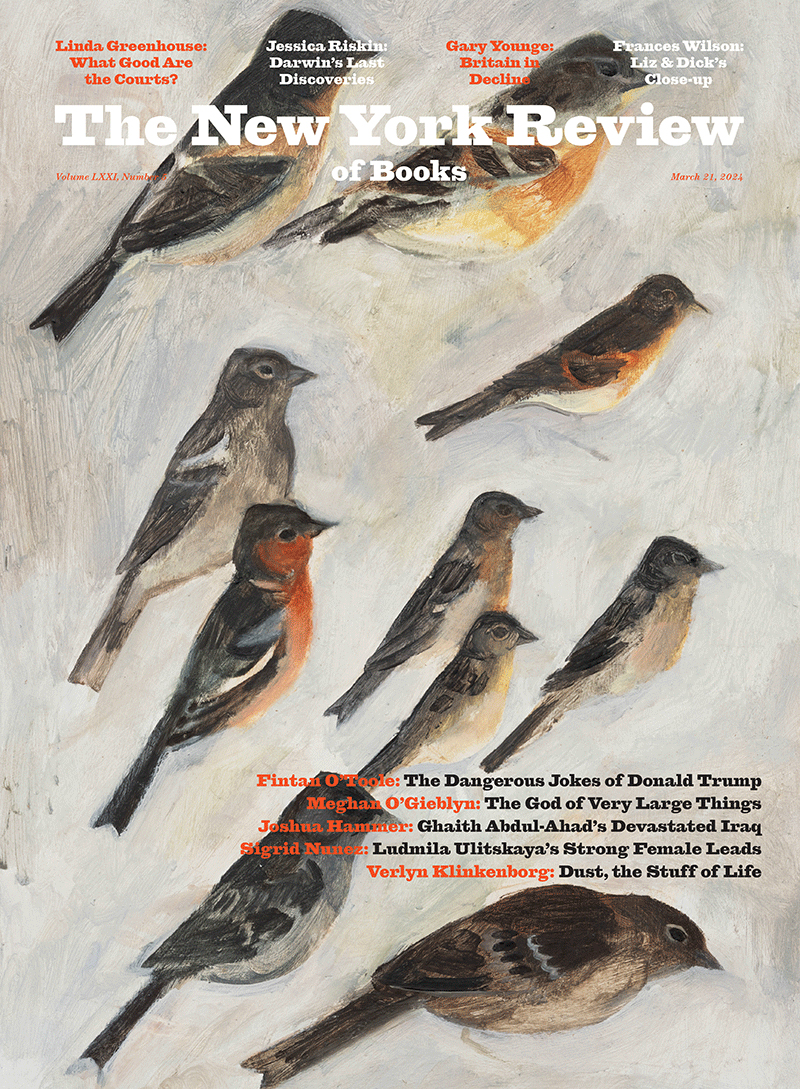
Who Should Regulate Online Speech?
Small Island
Subscribe to our Newsletters
More by Fintan O’Toole
February 11, 2024
As we enter an election year, can the Democrats prevent age from becoming a serious obstacle?
January 18, 2024 issue
November 14, 2023
Fintan O’Toole is the Advising Editor at The New York Review and a columnist for The Irish Times. His most recent book, We Don’t Know Ourselves: A Personal History of Modern Ireland , was published in the US last year. (March 2024)
The Fate of the Union: Kennedy and After
December 26, 1963 issue
Reagan and the Apocalypse
January 19, 1984 issue
‘Knee Deep in the Hoopla’
December 21, 1989 issue
A Double Standard
April 9, 1992 issue
Lost in the Cosmic
June 14, 1990 issue
An Illegal War
October 21, 2004 issue
The Report of Captain Secher
March 15, 2007 issue

Subscribe and save 50%!
Get immediate access to the current issue and over 25,000 articles from the archives, plus the NYR App.
Already a subscriber? Sign in

IMAGES
VIDEO
COMMENTS
Books are our best friends. Even in today's world of internet and mobile, the importance of books cannot be ignored. I am a genuine book lover. Reading books is my passion. Whenever I get spare time I read story books, novels etc. Recently I have read Bibhutibhushan's classic novel 'Chander Pahar'.
The story I read: In that book I read all the stories. But one of them impressed me very much. I was an epic story. It was the story of the sage Dadhichi. The stroy goes like this. In the far old days, there were demons on the earth. The Gods were living in the heaven. The demons aspired for heaven, because in heaven there were paradise and ...
Our school library is having books which I like very much. One of my friends showed me a certain book in the library and he said that is his favorite book. He also said that is was the second part of the most famous Adventures of Huckleberry Finn written by Mark Twain. I borrowed the book from the librarian on the advice of my friend.
500+ Words Essay on My Favourite Book. Essay on My Favourite Book: Books are friends who never leave your side. I find this saying to be very true as books have always been there for me. I enjoy reading books. They have the power to help us travel through worlds without moving from our places. In addition, books also enhance our imagination.
Follow @TIME. In my many years as a journalist, scholar and thinker, I have read nearly all the great works of literature, including Milton, Shakespeare and the first third of The Brothers Karamazov. But no book has ever spoken to me as profoundly or directly as Joel Stein's Man Made: A Stupid Quest for Masculinity.
This novel has been my favourite book for many years now. It explores various themes, including racial injustice, morality, and the loss of innocence. The characters in the novel are complex and well-developed, making it a must-read for anyone who loves literature. In this essay, I will discuss why "To Kill a Mockingbird" is my favourite ...
Words • 1088. Pages • 4. 2. Opium War and Drugs in China: A Historical Account by Julia Lovell. Words • 1413. Pages • 6. 3. The Alteration of One's Mind: Book All The Light We Cannot See by Anthony Doerr. Words • 594.
Didion's pen is like a periscope onto the creative mind—and, as this collection demonstrates, it always has been. These essays offer a direct line to what's in the offing.". -Durga Chew-Bose ( The New York Times Book Review) 3. Orwell's Roses by Rebecca Solnit.
The Purpose Driven Life answers more life questions than it originally intends to address. It's educating, inspiring, and motivating. It is food for the mind, the heart, and the spirit. It's a book you should always keep by your bedside. Works Cited. Warren, Richard. The Purpose Driven Life: Zondervan, 2012.
Describe a book you have read recently - The Fortunate Pilgrim. The book I have recently finished and enjoyed so much is called "The Fortunate Pilgrim", and I would like to talk about it for this topic. It is a novel by Mario Puzo which was first published in the year 1965. The writer Mario Puzo is well-known for his famous mafia book ...
Hilton Als, White Girls (2013) In a world where we are so often reduced to one essential self, Hilton Als' breathtaking book of critical essays, White Girls, which meditates on the ways he and other subjects read, project and absorb parts of white femininity, is a radically liberating book.
2 Unfinished Business: Notes of a Chronic Re-Reader by Vivian Gornick. 3 Nature Matrix: New and Selected Essays by Robert Michael Pyle. 4 Terroir: Love, Out of Place by Natasha Sajé. 5 Maybe the People Would be the Times by Luc Sante. W e're talking about the books shortlisted for the 2021 PEN/Diamonstein-Spielvogel Award for the Art of the ...
4. Body Work: The Radical Power of Personal Narrative by Melissa Febos. "In her new book, Body Work: The Radical Power of Personal Narrative, memoirist Melissa Febos handily recuperates the art of writing the self from some of the most common biases against it: that the memoir is a lesser form than the novel.
A book I have read. I read a lot, so it was hard to choose my favourite book. I really liked Harry Potter, which has 7 parts. It was written by J.K Rowling and it is one of the greatest fantasy books in the 21st Century. The story is sets a magical place called Hogwarts, where witches and wizards learn. The story is about a young wizard called ...
The Most of Nora Ephron includes essays on friendship, feminism and journalism, as well as some of her favourite recipes. And although they're not essays, we guarantee you'll still love the extracts from her bestselling novel Heartburn and the scenes from When Harry Met Sally that are included. Trick Mirror by Jia Tolentino (2019) As a ...
Speech for 5-10 Minutes. Good morning to all. My name is Reeva Raj and my topic for the English-speaking task is My favourite book. " Books are the quietest and most constant of friends; they are the most accessible and wisest of counselors, and the most patient of teachers". Books are friends who never leave your side.
Insomniac City: New York, Oliver, and Me by Bill Hayes. "Bill Hayes came to New York City in 2009 with a one-way ticket and only the vaguest idea of how he would get by. But, at forty-eight years old, having spent decades in San Francisco, he craved change.
Essay on My Favourite Book in 200 Words. The book is the best friend of humans. It never leaves us. It always helps us to get better by heart and knowledge. The best place to get the knowledge is a book. Because of encouragement from my teachers and my parents, I have been a huge book lover. I love reading books.
The Art of the Personal Essay — anthology, edited by Phillip Lopate. 6. Bad Feminist — Roxane Gay. 7. The Best American Essays of the Century — anthology, edited by Joyce Carol Oates. 8. The Best American Essays series — published every year, series edited by Robert Atwan. 9. Book of Days — Emily Fox Gordon.
Now He's Out." by Ashley C. Ford. Ford describes the experience of getting to know her father after he's been in prison for almost all of her life. Bridging the distance in their knowledge of technology becomes a significant—and at times humorous—step in rebuilding their relationship.
So for starters, here are our top 10 books about writing: On Writing by Stephen King. The Kick-Ass Writer by Chuck Wendig. Dreyer's Englis h by Benjamin Dreyer. The Elements of Style by Strunk, White, and Kalman. The Story Grid by Shawn Coyne. A Swim in a Pond in the Rain by George Saunders. Bird by Bird by Anne Lamott.
It is helpful for gaining lots of knowledge and information but reading a good book is healthier for our brain and…. A Book I Have Read Books And Reading Critical Thinking Mental Health. 7. Essay On Joy Of Reading Books. Words • 805. Pages • 3. Paper Type: 750 Word Essay Examples.
Topic Of Video : -An Interesting Book I Have Read Paragraph Essay Writing On Most Interesting Book I Have ReadShort Essay On The Book I Have Read RecentlyA B...
Amid a surge in book bans, the most challenged books in the United States in 2023 continued to focus on the experiences of L.G.B.T.Q. people or explore themes of race.
30. The Expanse Series By James S.A. Corey. James S.A. Corey is the joint pen name of authors Daniel Abraham and Ty Franck, and their The Expanse Series is a space opera body of work that sends ...
Leigh Bardugo's The Familiar, Alexandra Fuller's Fi, and Anne Lamott's Somehow all feature among the Best Reviewed Books of the Week. Brought to you by Book Marks, Lit Hub's home for book reviews. * Fiction 1. The Familiar by Leigh Bardugo (Flatiron) 8 Rave "Bardugo brilliantly explores the wavy line between the supernatural and the […]
Critic Bethanne Patrick recommends 10 promising titles, fiction and nonfiction, to consider for your April reading list. April's book releases cover some difficult topics, including Salman ...
This is why Trump's lapses into pure gibberish—like telling a National Rifle Association gathering in Harrisburg, Pennsylvania, on February 9 that the Democrats are planning to "change the name of Pennsylvania" and that, in relation to the marble columns in the hall, it was "incredible how they could [have been built] years ago ...